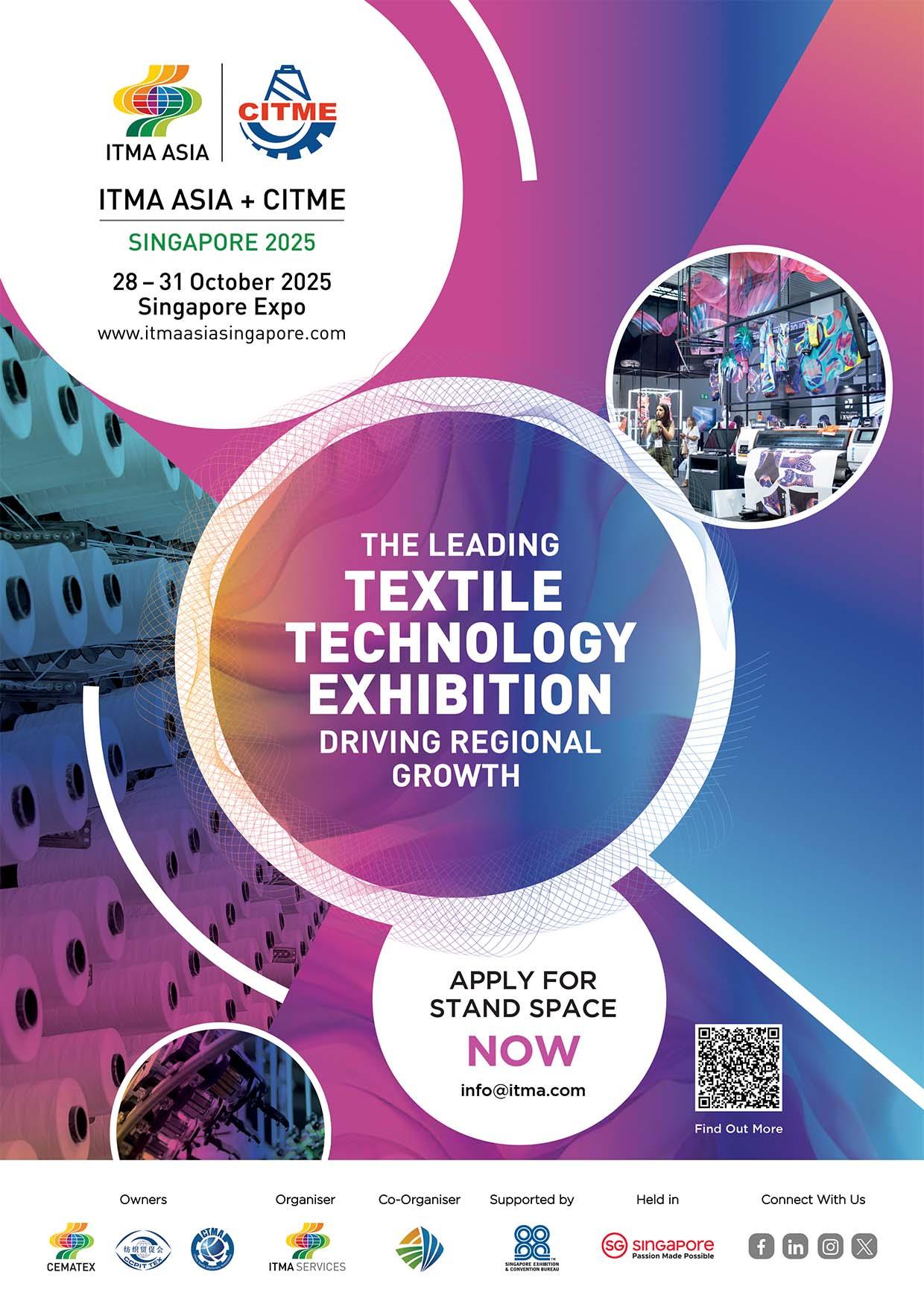









DOMOTEX asiaCHINAFLOOR 2024
Dates: May 28th to 30th 2024. Venue: NECC, Shanghai, China.
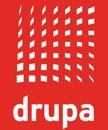
drupa 2024
Dates: 28th May to 07th June 2024. Venue: Düsseldorf, Germany.

ITM 2024
Dates: June 4th to 8th, 2024. Venue: Istanbul, Turkey.

HIGHTEX 2024
Dates: June 4th to 8th, 2024. Venue: Istanbul, Turkey.

INTEX SOUTH ASIA 2024
Dates: August7th to 9th 2024. Venue: Colombo, SriLanka.

Textile Asia 2024, Lahore
Dates: August 03rd to 05th 2024. Venue: Lahore Expo Centre. Textile Asia 2025, Karachi
Dates: April 12th to 14th 2025. Venue: Expo Centre, Karachi.

DPS World Pakistan 2024
Dates: August 16th to 18th 2024. Venue: Lahore Expo Centre.

Dates: September 11th to 13th 2024. Venue: Dornbirn Austria.

International Trade Fair for Technical Textiles and Nonwovens
Dates: September 19th 21st, 2024. Venue: Shanghai New International Expo Centre, Shanghai, China

ITMA ASIA + CITME 2024
Dates: October 14th to 18th, 2024. Venue: NECC, Shanghai, China.

Dates: November 27th to 30th 2024. Venue: Osaka, Japan.

Heimtextil 2025, Frankfurt
Dates: January 14th, to 17th, 2025
Venue: Frankfurt am Main.

DOMOTEX Hannover 2025
Dates: January 16th to 19th 2025. Venue: Hannover, Germany.

FESPA 2025
Dates: May 06th to 09th 2025. Venue: Messe Berlin in Germany.

IGATEX Pakistan 2025, Karachi
Dates: April 24th to 26th 2025. Venue: Expo Centre, Karachi.

ITMA ASIA + CITME, Singapore 2025
Dates: October 28th to 31st, 2025. Venue: Expo Centre Singapore.
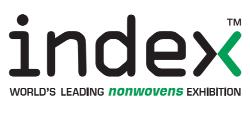
Index 2026
Dates: April 21st to 24th, 2026. Venue: Palexpo, Geneva, Switzerland.

ITMA 2027
Dates: September 16th to 22nd, 2027. Venue: Hanover, Germany.



Founded in 1951 by Mazhar Yusuf (1924-2009)
Publisher
Nadeem Mazhar
Editor in Chief Amina Baqai
Associate Editor
Nimrah Nadeem
Production Manager Mazhar Ali
Layout & Design
Noor M. Jaan
Website / Social Media
Minhaj Ali
Hony-Editorial Board
Dr. Hafizur Rehman Sheikh Ph.D (UK) F.T.I. (UK)
Syed Mahfooz Qutab
C.TEX, F.T.I (U.K), B.Sc. Fellow I.C.T.T Atlanta, GA; (USA)
Dr. Zubair Bandukda PhD (Textiles), CText ATI
Editorial & Advertising Office
B-4, 2nd Floor, 64/21, M.A.C.H, Miran M. Shah Road, Karachi - Pakistan
Tel: +92-21-34311674-5
Fax: +92-21-34533616
Email: info@ptj.com.pk
URL: http://www.ptj.com.pk
PTJ Europe Ltd.
Registered Office:
Dairy House, Money Row Green, Holyport, Maidenhead, Berkshire, SL6 2ND, United Kingdom.
Registered no. 09141989
Tel: +44 792 2228 721
Available on Gale and Factiva affiliated international databases through Asianet Pakistan
Printed at: Color Plus Korangi, Karachi.
Published by Nadeem Mazhar from D-16, K.D.A. Scheme No.1. Karachi.




Two young ITM scientists awarded the Sustainability Prize of the German Textile Machinery Industry 2024 .
Archroma and DMIx collaborate to inspire fashion's digital workflow with more color and sustainability
Meisheng expands production with third ANDRITZ needlepunch line
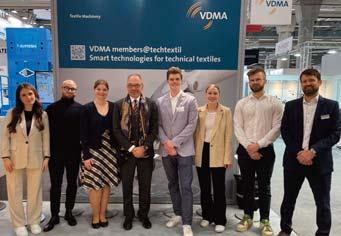
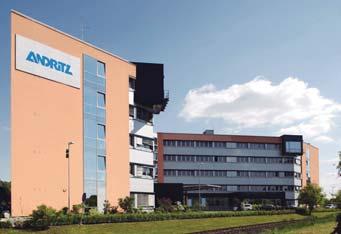
Peru’s Nuevo Mundo continues sustainability journey with Archroma
Exploring Innovation and Sustainability in the Textile Industry: A Seminar Hosted by iTextiles .
Energizing Industry: National Textile University and Rastgar Group launch pioneering center of excellence in Compressed Air
Eagerly awaited ITMA ASIA + CITME exhibition in Singapore gears up for opening of space application
Exploring the Dynamics of DOMOTEX Middle East: An Interview with Sonia WedellCastellano, Global Director


Rieter Autoconer X6: The open prism OZ2 is the new allrounder in splicing . . .34
U.S. Cotton Trust Protocol Announces Expanded Board of Directors
Successful collaboration: Groz-Beckert and Santoni develop innovative INNOTAS knitting system
Biancalani: Crazy for artificial fibers
TRUECYCLED: A holistic approach to textile recycling success
Beacon Impex is revolutionizing sustainable knit production in Pakistan
Mr. Israr Hussain Zaidi, Director Operations at Beacon Impex
ERBATECH modern concepts for washing, bleaching and dyeing
Pakistan-Germany Trade Relations Remains Healthy and Growing
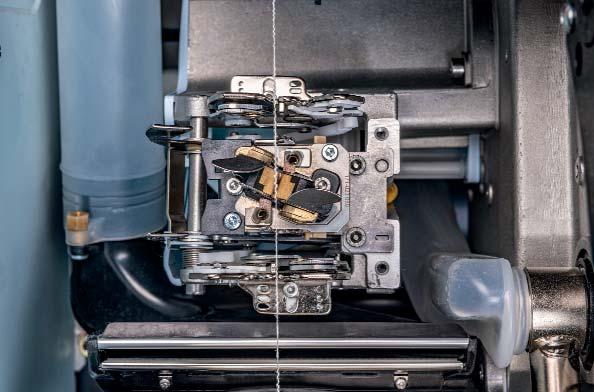
.36

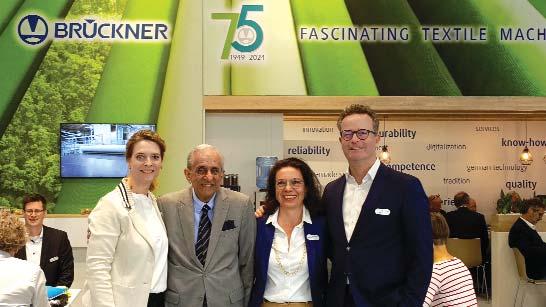
.46 by Nadeem Mazhar, Managing Editor, Pakistan Textile Journal. BRÜCKNER’s 75 years of tradition and innovation
Ms. Regina Brückner, CEO of Brückner “BRÜCKNER ensures sustainable and efficient production.”
Mrs. Verena Ruckh, Head of Marketing Department at Brückner
Change in the management board - Eva Baumann becomes the new CEO of the CHT .50
Monforts automation reinvigorates Pincroft line
ITM 2024 all set to break records
Italian Trade Agency to exhibit at ITM 2024 with Italian pavilion
Heberlein AG: ‘Stunning’ evenness in filament yarns
Itema to showcase its latest weaving innovations and HelloItema at ITM 2024
KARL MAYER Technische Textilien at ITM 2024 in Istanbul
Merhaba Istanbul: Trützschler Group at ITM 2024
Oerlikon to show sustainable way to produce manmade fibre at ITM 2024
.63
Rieter: Raising the Bar on Performance with Automation, Digitization and Recycling .64
Mayer & Cie. to bring a new vision to circular knitting at ITM 2024
Spin box SE 21 in the new Autocoro 11 Programmed for sustainability
.68
Stäubli at ITM 2024 – Redefining efficiency: with speed and quality processing . . .70
Picanol to showcase the all-new Ultimax rapier weaving machine
Erhardt+Leimer at ITM 2024 .
Color Service srl: accuracy and sustainability in the made-in-Italy dosing automation
Jakob Müller Group - CEO Andreas Conzelmann has been in his position for 100 days
Savio’s next destination: ITM 2024
Mesdan at ITM 2024


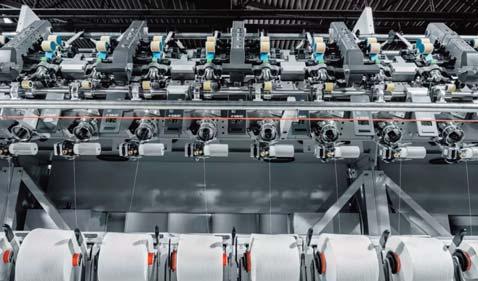
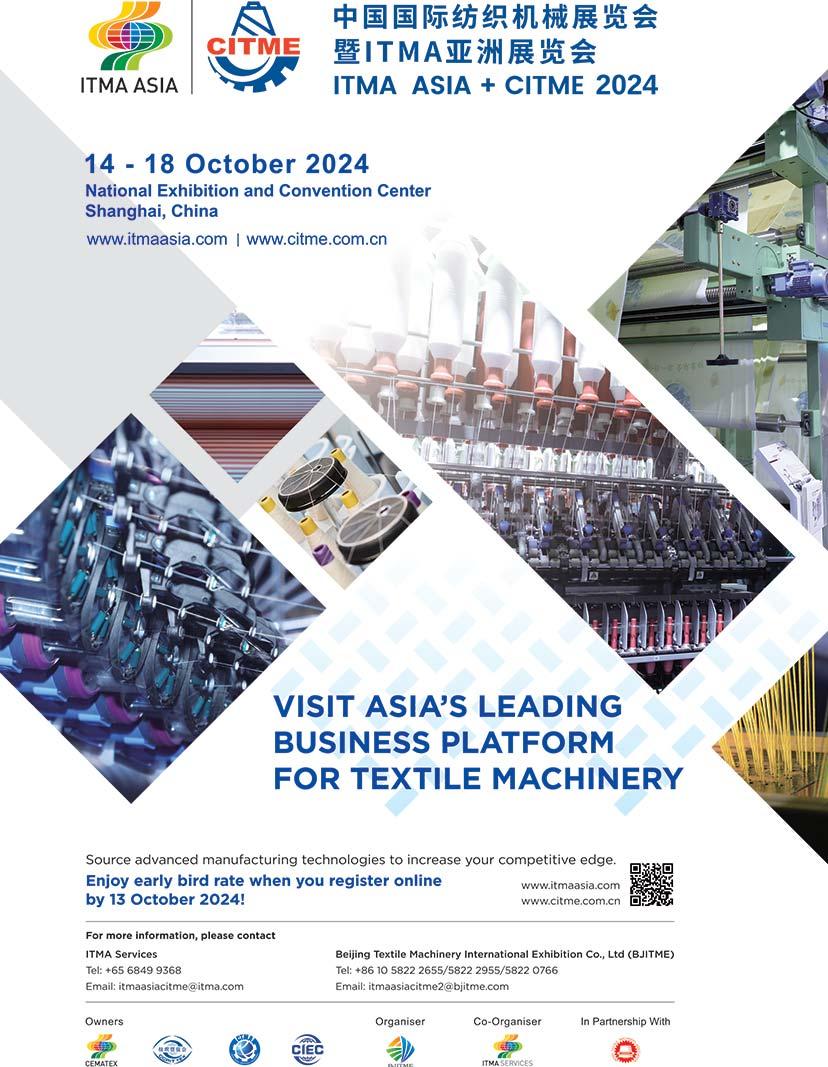
EDITOR’S PAGE
Germany continues to be a strong partner for Pakistan's textile industry. The growth of Pakistan's textile sector has been greatly influenced by the innovative technological solutions provided by German textile machinery suppliers. Companies like Saurer Group, Schlafhorst, Truetzschler, Monforts, and Karl Mayer have played a crucial role by supplying advanced machinery and offering extensive after-sales support. Furthermore, German chemical suppliers such as Bayer and DyStar have been vital partners in supplying quality chemicals and promoting sustainable production practices.
For over seven decades, the Pakistan Textile Journal has fostered engagement between German companies and the Pakistani market, demonstrating a lasting commitment from these companies. As the industry encounters new challenges, German firms are well-positioned to support Pakistan's textile sector through technological advancements and expert guidance. Strengthening trade relations between Pakistan and Germany in the textile sector remains essential for driving innovation, productivity, and sustainable development. The Pakistan Textile Journal is dedicated to promoting this partnership and supporting the industry's growth. In this month's issue, we have included the statistics of Pak-German trade relations, which indicate a healthy relationship between the two countries. Key exhibitions like Heimtextil, Techtextil, Texprocess, Domotex, ISPO, and DRUPA regularly take place in Germany, providing great relevance to Pakistan's textile industry. Additionally, the next ITMA exhibition in 2027 is scheduled to be held in Hannover.
ITM and DOMOTEX asia/CHINAFLOOR
In this month's issue, we also highlight two important upcoming exhibitions: DOMOTEX asia/CHINAFLOOR, taking place from May 28th to 30th at NECC, Shanghai, and ITM 2024, taking place from June 4th to 8th in Turkey. ITM 2024 is one of the most significant events for the textile industry. Visitors and trade delegates from around the world gather here to seek and provide solutions for the rapidly growing textile sector.
During the last edition of ITM, the exhibition experienced a record-breaking number of exhibitors and visitors, turning it into a textile feast that attracted global investors and trade delegations. A total of 64,500 people from 102 countries visited ITM, with 44% of visitors coming from international locations and 56% from domestic locations. Manufacturers from various countries, including Egypt, Iran, Pakistan, Russia, Uzbekistan, Bangladesh, India, Italy, Algeria, and Tunisia, attended the exhibition, securing promising deals to enhance their business capabilities.
DOMOTEX asia/CHINAFLOOR is a leading flooring exhibition in the Asian-Pacific region and the second-largest flooring show worldwide. As part of the DOMOTEX trade event portfolio, the 25th edition of DOMOTEX asia/CHINAFLOOR serves as the primary business platform for the global flooring industry. Industry professionals from China, the fast-growing markets of South and Southeast Asia, Oceania, and beyond, attend this show each year to connect with suppliers and manufacturers, purchase flooring products, establish partnerships, and network with industry leaders.
The upcoming edition of DOMOTEX asia/CHINAFLOOR expects more than 1,600 exhibitors and 85,000 visitors from around the world, exploring the future of the flooring industry. Pakistan Textile Journal will provide firsthand reports on these exhibitions in upcoming issues and on our website.


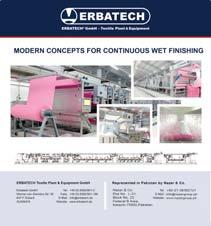

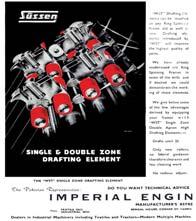

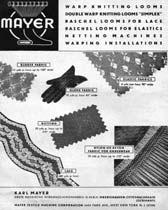

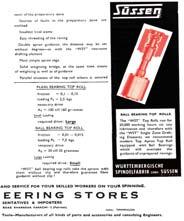






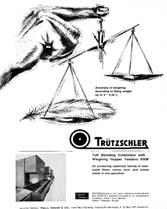

1
Pakistan earned $ 13,683.251 million from exports of textile products during the first 10 months of the current financial year (2023-24), the Pakistan Bureau of Statistics (PBS) report said. The exports of the textile products however, witnessed a slight decline of 0.19 percent during July-April (2023-24) when compared to the exports of $ 13,709.246 million during July-April (202223).
2
The Pakistan Textile Exporters Association (PTEA) has voiced grave concerns over the prevailing economic uncertainty, citing high interest rates and constrained access to funds

as significant hurdles to the expansion of industrialization and exports in the nation.
Khurram Mukhtar, Patron-inChief of PTEA, advocates the adverse effects of the economic slowdown on the textile industry, which stands as Pakistan’s largest manufacturing sector.
3
During a pre-budget seminar organized by the commerce ministry, the textile and apparel industry presented a detailed roadmap aimed at addressing pressing challenges and unlocking the sector's growth potential in the upcoming fiscal year.
4
Deputy Director Agriculture (Extension) Multan, Dr. Azwar Raza
1
According to a quarterly review report by the Bangladesh Bank, value addition in the country's ready-made garment (RMG) sector saw a notable increase of 3.66 percentage points in the second quarter (October-December). However, despite this uptick in value addition, the sector's export earnings experienced a decline of 7.46 percent during the same period.
2The report highlights that the import value of essential raw materials for the RMG industry, including raw cotton, synthetic fiber, yarn, and textile fabrics, amounted to $3.37 billion in the October-December period of FY24. Meanwhile, total RMG export earnings stood at $11.77 billion, resulting in net export earnings of $8.40 billion for the sector. Notably, local value
Gilani, has emphasized the crucial role of adopting certified seeds of approved BT varieties of cotton to achieve heightened production levels.
5
Power Minister Sardar Awais Ahmad Khan reiterated the government's commitment to revitalizing Pakistan's textile sector during a meeting with All Pakistan Textile Mills Association (APTMA) officials.
6
Sindh Irrigation
Minister, Jam Khan Shoro, has called upon Islamabad to ensure uninterrupted water supply to the province, stressing the importance of sufficient water availability for crop production.
7
Stress on Pakistan’s textile industry listed at the capital market continued in the first quarter of 2024 as the sector grappled with challenges not only in exports but also in domestic markets.
8Representatives from the pesticide industry extended their support and presented a set of suggestions to the Punjab government for the restoration of the cotton crop in the province. In a meeting with Secretary Agriculture Punjab, Iftikhar Ali Sahoo, held on Monday, industry representatives offered technical assistance and guidance throughout the crop's growth stages.

addition accounted for 71.35 percent of these earnings in the second quarter of FY24, reflecting a slight increase compared to the same period in FY23.
3
EDANA, the foremost global association advocating for the benefits of nonwovens, shared a comprehensive overview of key figures from the EDANA Statistics Report on Nonwovens Production and Deliveries for 2023.
4
In 2023, nonwovens production in Greater Europe experienced a slight decline compared to 2022, with a decrease in volume by 5.7% to 2,864,840 tonnes and a 5.5% reduction in surface area, resulting in the manufacture of 81.7 billion square meters of nonwovens. However, nuanced variations
were observed at both national and process-specific levels across Greater European countries.
5
The French textile industry association, UIT, has put forward six proposals to candidates in the country's EU elections, following the approval of a first set of measures aimed at regulating fast fashion by the French Parliament. While UIT welcomed these measures, it expressed concerns about their effectiveness.
6
Despite numerous intervention efforts, the Nigerian textile industry continues to grapple with significant hurdles, as importation of textile products into the country surged by 106.7 percent over four years, reaching N377.1 billion in 2023.

7
In Tanzania, a four-day conference will bring together researchers and representatives from African cotton companies to delve into crucial topics such as soil health, environmental pest management, and optimization of cultivation techniques for African cotton farmers.
8
A coalition of US apparel and textile trade bodies, including the American Apparel and Footwear Association (AAFA), the National Retail Federation (NRF), the Retail Industry Leaders Association (RILA), and the United States Fashion Industry Association (USFIA), is urging the Department of Homeland Security (DHS) to collaborate with stakeholders to combat illicit textile trade practices.
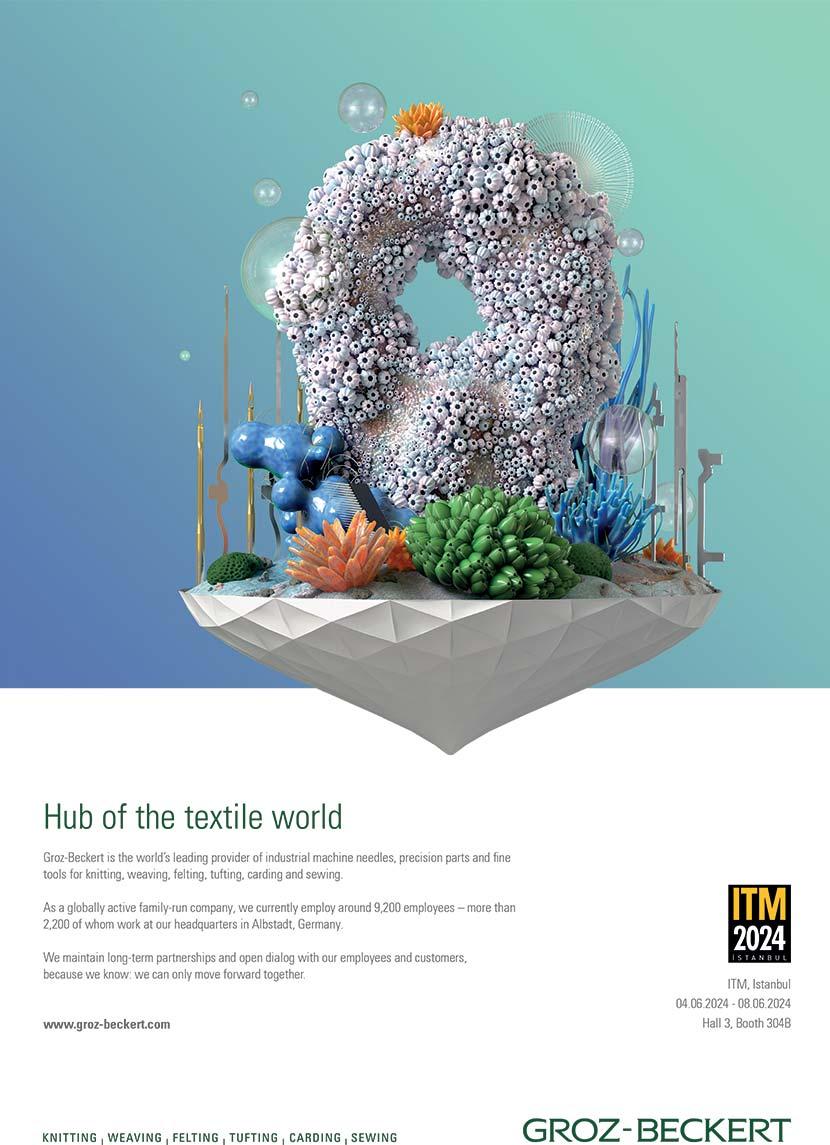
Pakistan earned $ 13,683.251 million from exports of textile products during the first 10 months of the current financial year (2023-24), the Pakistan Bureau of Statistics (PBS) report said.
The exports of the textile products however, witnessed a slight decline of 0.19 percent during July-April (2023-24) when compared to the exports of $ 13,709.246 million during July-April (2022-23).
Raw cotton exports grew by 319.91 percent, from $13.357 million last year to $15.944 million this year.
Exports of cotton yarn increased by 32.83 percent, from $ 636.832 million last year to $845.923 million this year and bed wear by 1.82 percent, from $ 2,249.778 million to $ 2,290.796 million.
Exports of towels increased by 4.81 percent from $824.879 million to $864.547 million while exports of madeup articles were up by 0.67 percent to $589.026 million from $585.102 million.
Cotton cloth exports declined by 7.53 percent, from $ 1,684.724 million to $ 1,557.909 million. Yarn other than cotton yarn witnessed a decline of 20.76 percent, from $36.302 million to $28.766 million while knitwear exports declined by 3.92 percent, from $3,712.066 million to $3,566.624 million.
Similarly, exports of tents, canvas and tarpaulin decreased by 16.52 percent, from $116.959 million to $97.632 million, ready-made garments by 0.57 percent, from $ 2,904.693 million to $ 2,888.177 million.
The exports of art, silk and synthetic textiles also decreased by 12.08 percent declining from $342.917 million to $301.496 million, whereas the exports of all other textile materials also went down by 0.87 percent, from $600.642 million to $595.432 million.
Meanwhile, on a year–on–year basis, the textile exports in April increased by 0.37 percent going up from $ 1,232.803 million in April 2023 to $ 1,237.316 million in April 2024.
On a month-on-month basis, the textile exports, however, decreased by 4.84 percent when compared to the exports of $1,300 million in March 2024.

The Pakistan Textile Exporters Association (PTEA) has voiced grave concerns over the prevailing economic uncertainty, citing high interest rates and constrained access to funds as significant hurdles to the expansion of industrialization and exports in the nation.
Khurram Mukhtar, Patron-in-Chief of PTEA, underscored the adverse effects of the economic slowdown on the textile industry, which stands as Pakistan’s largest manufacturing sector.
Mukhtar highlighted the decline in textile exports, plummeting from a peak of $1.74 billion in April 2022 to a low of $1.18 billion in February 2023, subsequently stagnating at approximately $1.4 billion per month, marking a $600 million shortfall from the installed production capacity.
Pointing to the record-high interest rate, currently at 22%, Mukhtar underscored its detrimental impact on Pakistan's export sectors. He juxtaposed Pakistan's policy rates with those of regional counterparts like Bangladesh, India, Vietnam, and Sri Lanka, ranging from 4.5% to 11%, underscoring the disadvantage faced by Pakistan.
The elevated interest rates foster an environment of uncertainty, impeding long-term planning and investments due to exorbitant borrowing costs. Moreover, exporters grapple with challenges as their funds remain tied up in the refund regime, compelling them to seek loans at
steep interest rates, thus inflating the cost of business operations and rendering them less competitive within the region.
Mukhtar stressed the pivotal role of the Large-Scale Manufacturing sector, contributing nearly a quarter of the country’s GDP. He lamented the sector's marginal growth in output, decreasing by less than 1% during the July-January period of the fiscal year 2023-24.
This decline, compounded by other pressing issues such as high inflation, burgeoning current account deficit, dwindling foreign exchange reserves, fiscal disparities, and waning foreign direct investments, poses a grave threat to the economy's stability and growth trajectory.
During a pre-budget seminar organized by the commerce ministry, the textile and apparel industry presented a detailed roadmap aimed at addressing pressing challenges and unlocking the sector's growth potential in the upcoming fiscal year.
Central to the industry's proposals is a strategic plan to alleviate cross subsidies and stranded costs in the prevailing power tariff structure, with the goal of reducing industrial tariffs from the existing 14 cents per unit to 9 cents per unit. This initiative, if implemented, is anticipated to catalyze sustainable growth in exports, positioning Pakistan's industry competitively on the global stage.
Furthermore, the industry advocates
for the establishment of business-to-business (B2B) electric power contracts to procure green energy at competitive rates. By setting an upper cap of 1,000 MW/annum for these contracts, the sector aims to manage financial implications effectively while fostering an environment conducive to export expansion.
In addition to these measures, the industry underscores the imperative of augmenting the cap on solar net-metering for industrial consumers from 1 MW to 5 MW, aligning with global trends towards sustainable practices and positioning Pakistan towards a net-zero future.
Highlighting the recent decline in exports, the All Pakistan Textile Mills Association (APTMA) emphasized the critical need to address prohibitive energy costs, hindrances in tax refunds, and an adverse duty structure for key raw materials. APTMA also recognized the looming threat posed by the EU's Carbon Border Adjustment Mechanism (C-BAM) and stressed the urgency of transitioning to green energy to maintain export competitiveness.
Moreover, the industry calls for the rationalization of tax rates, deepening of the stock market, and incentivizing exports to stimulate financial rejuvenation. It advocates for a robust National Compliance Center (NCC) to ensure adherence to sustainability standards and emphasizes the importance of diversifying export products beyond cotton to tap into burgeoning global markets for man-made fiber textiles.
To bolster the textile sector's global position, APTMA recommends the removal of import duties on raw materials such as Purified Terephthalic Acid (PTA) and Polyester Staple Fiber (PSF), while also proposing the revision of anti-dumping duties on PSF. Additionally, the industry urges the withdrawal of customs duty on industrial spare parts and gas generators, along with zero-rating duties on dyes and chemicals essential for downstream industries.
Furthermore, APTMA calls for the expansion of the Export Facilitation Scheme to encompass the entire value-added chain of the textile sector, advocating for revisions in the Sales Tax Return provisions to facilitate indirect exporters.
Deputy Director Agriculture (Extension) Multan, Dr. Azwar Raza Gilani, has emphasized the crucial role of adopting certified seeds of approved BT varieties of cotton to achieve heightened production levels.
During his visit to Qasba Ayazabad Marral and suburban areas to assess early sown cotton, Dr. Gilani engaged with local farmers, urging them to refrain from pesticide application during the initial 60 days of crop growth. He advised farmers to treat seeds with appropriate insecticides before sowing to safeguard
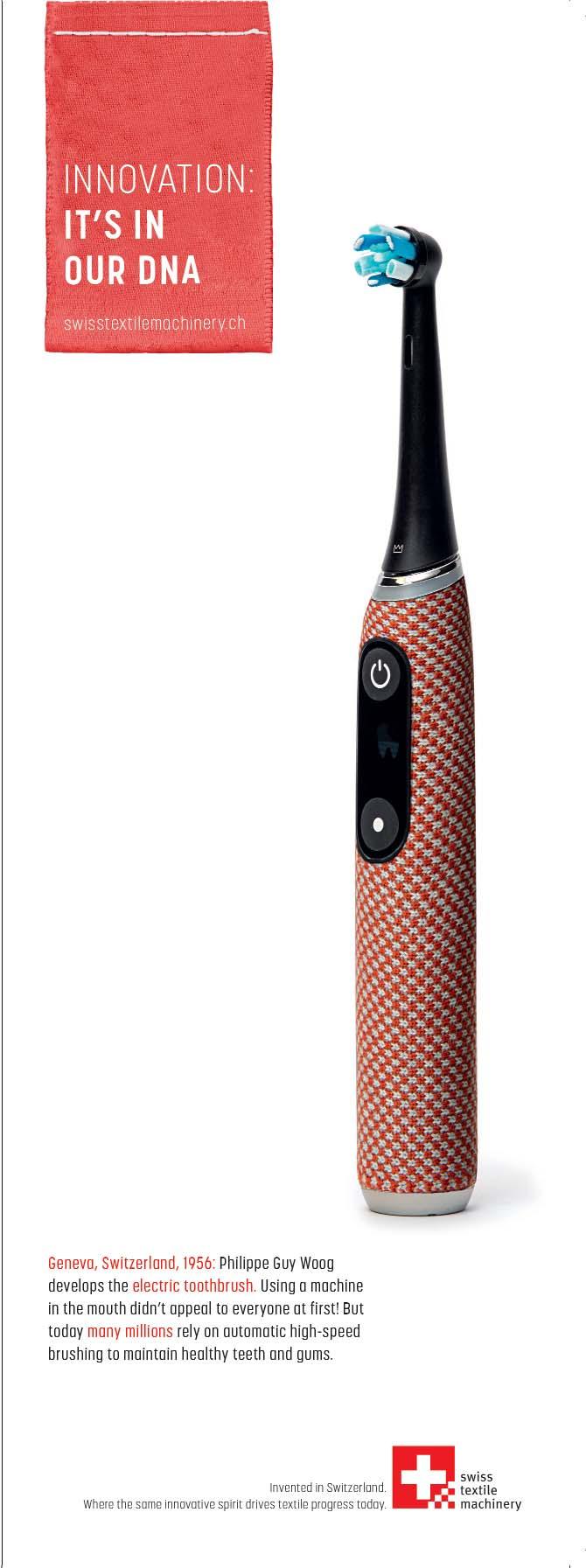
against sap-sucking insects, particularly whiteflies, for approximately a month.
Highlighting the significance of land preparation, Dr. Gilani stressed the importance of sub-soiler plowing to break the soil's hard layer, enhancing water retention capacity, and facilitating root nourishment. He recommended maintaining a distance of two and a half feet between rows if planting by drill method. Additionally, he advised leaving one line of plants and spreading soil on the other line when the crop reaches a height of one and a half to two feet.
These measures, Dr. Gilani explained, would optimize fertilizer usage, conserve water, and mitigate losses in case of rainfall. He specified that for crops cultivated between April 1 to 30, the optimal plant population should be 17,500 plants per acre, while for those sown from May 1 to 30, farmers must ensure a plant population of 23,000 per acre.
Power Minister Sardar Awais Ahmad Khan reiterated the government's commitment to revitalizing Pakistan's textile sector during a meeting with All Pakistan Textile Mills Association (APTMA) officials.
Concerns were raised by APTMA regarding the declining exports within the textile industry, exacerbating issues like unemployment and poverty. Minister Khan assured the delegation of the government's steadfast support, emphasizing ongoing efforts to implement a comprehensive wheeling policy aimed at boosting exports.
The proposed policy, coupled with regionally competitive tariffs tailored for the textile sector, aims to unleash the industry's full potential. Minister Khan underscored the urgency of the situation, highlighting swift actions to improve the operations of DISCOS (Distribution Companies) to provide immediate relief to the textile sector.
With these strategic initiatives in place, the government aims to significantly increase textile exports by up to $2 billion, fostering economic growth and employment opportunities in Pakistan.
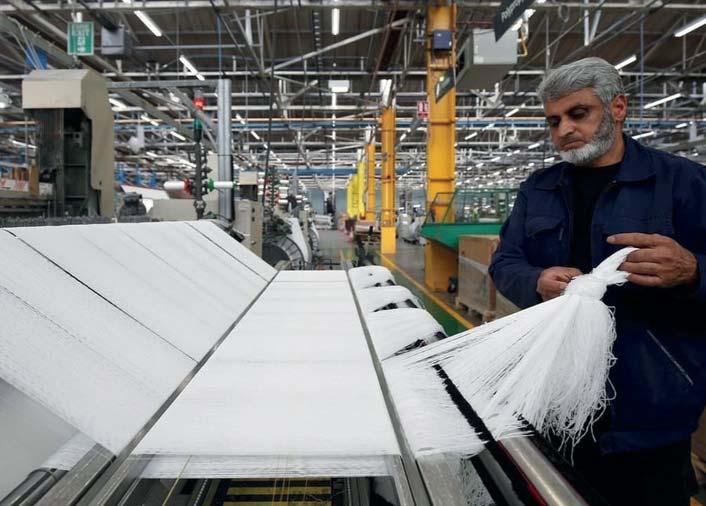
Sindh Irrigation Minister, Jam Khan Shoro, has called upon Islamabad to ensure uninterrupted water supply to the province, stressing the importance of sufficient water availability for crop production.
Highlighting the disparity in water distribution, Minister Shoro expressed concern over the shortage of water in several canals, despite the Nara and Rohri canals receiving adequate supply. He emphasized the government's efforts to maintain crop and drinking water supply through a rotation programme.
Additionally, Minister Shoro announced plans for a separate scheme aimed at draining rainwater from key drainage systems, including the Left Bank Outfall Drain (LBOD), Dhoro Puran Outfall Drain (DPOD), and Hakro drain. The installation of a large gate at RD 210 is part of this scheme, with reports being sought from concerned deputy commissioners to address the issue.
However, concerns have arisen over the potential impact of water releases from the Tarbela Dam on the sowing of main Kharif crops, such as cotton and rice, in Sindh. Wapda's request for water release beyond the storage level of 1,420 feet for tunnel construction has raised apprehensions about crop production in the region.
Sindh has emphasized the need for maximum water releases from the Tarbela reservoir to facilitate timely sowing of crops, highlighting the critical importance of early Kharif water releases for cotton and rice cultivation. Minister Shoro underscored the province's reliance on sufficient water supply in adherence to the water accord, urging equitable distribution among provinces in case of shortages.
As discussions continue in the advisory committee meeting scheduled for April 2, Sindh remains steadfast in its pursuit of maximum water releases during the early Kharif period to mitigate potential losses in crop production. Minister Shoro reiterated Sindh's stance against excessive water storage and advocated for fair distribution in accordance with the water accord to safeguard agricultural livelihoods in the region.
Stress on Pakistan’s textile industry listed at the capital market continued in the first quarter of 2024 as the sector grappled with challenges not only in exports but also in domestic markets.
It is surprising that at a time when KSE-100 has broken all the records butTextile Composite sector suffered a 64.2 percent YoY decline in net profit during the quarter, declining to Rs5.27
billion against Rs14.72bn in the same period last year.
In view of global economic slowdown demand for textile products remained subdued in the international market as the overall exports of the textile industry have remained stagnant.
On the domestic front high energy costs, costly financing, and the imposition of government taxation have escalated the cost of doing business. As per the results available at PSX web page, sales revenue of textile sector worth worth Rs133.27bn as against Rs108.48bn during corresponding period of last year. This translated into an increase of 22.9 percent YoY.
But the increasing energy costs and escalating raw material prices compressed the profit margins significantly. The cost of sales ballooned by 35.0 percent YoY, depressing the gross profit by 16.1 percent YoY to Rs21.63bn during the period under review. Other income of the sector declined by 20.8 percent to stand at Rs2.79bn in Q1 2024 as compared to Rs3.52bn.
The selling and distribution expenses fell 27.9 percent YoY to Rs2.33bn depicting less efforts at sales level, administrative expenses fell 52.1 percent YoY to Rs1.55bn, while other operating expenses surged 379.1 percent YoY to Rs5.76bn.
Due to high policy rate the financial costs increased by 37.1 percent YoY to
Rs7.18bn as compared to Rs5.24bn earlier. Moreover, the sector paid a higher tax worth Rs2.33bn against the Rs1.68bn paid in the corresponding period of last year, depicting a rise of 38.7 percent YoY.
Experts say the next quarter would be challenging for the textile sector in view of current global economic situation and local pressures on costs
The sector result includes all big names like GATM, ILP, KTML, and NML. Most of these companies anticipate further pressure. With real GDP expected to grow at 2 percent this fiscal the overall economic activities are would remain subdued.
Representatives from the pesticide industry extended their support and presented a set of suggestions to the Punjab government for the restoration of the cotton crop in the province. In a meeting with Secretary Agriculture Punjab, Iftikhar Ali Sahoo, held on Monday, industry representatives offered technical assistance and guidance throughout the crop's growth stages.
Expressing gratitude to the private industry owners, Secretary Agriculture Punjab emphasized the collective effort required from all stakeholders to achieve the target of cotton cultivation and
production. He outlined the Agriculture Department's commitment to running a more diligent cotton campaign compared to the previous year, including issuing crop advisories to farmers and utilizing various media channels, particularly social media, for effective dissemination.
Secretary Sahoo stressed the importance of deploying maximum technical staff in allotted tehsils to provide necessary guidance to farmers. Furthermore, digital monitoring of field activities by Agriculture Department staff will commence from May 1st to ensure accountability and efficiency.
Highlighting the crucial role of industry owners, Secretary Sahoo emphasized the need for them to fulfill their responsibilities effectively to achieve desired results for the cotton crop in the province.
It was hoped that decisions made in the meeting between the Agriculture Department and the private sector would be implemented for the welfare of cotton farmers, fostering public-private sector cooperation for mutual prosperity and economic stability.
A committee, led by Secretary Agriculture South Punjab Saqib Ali Ateel, Consultant Dr. Anjum Ali, and Director General Pest Warning and Quality Control Punjab Dr. Amir Rasool, was formed to finalize the tehsil adoption programme through negotiations with the private sector.


Experienced a decline of 7.46%
According to a quarterly review report by the Bangladesh Bank, value addition in the country's ready-made garment (RMG) sector saw a notable increase of 3.66 percentage points in the second quarter (October-December). However, despite this uptick in value addition, the sector's export earnings experienced a decline of 7.46 percent during the same period.
The report highlights that the import value of essential raw materials for the RMG industry, including raw cotton, synthetic fiber, yarn, and textile fabrics, amounted to $3.37 billion in the October-December period of FY24. Meanwhile, total RMG export earnings stood at $11.77 billion, resulting in net export earnings of $8.40 billion for the sector. Notably, local value addition accounted for 71.35 percent of these earnings in the second quarter of FY24, reflecting a slight increase compared to the same period in FY23.
The primary markets for Bangladesh's RMG exports continue to be the US, Germany, the UK, and several other European countries, collectively contributing nearly 68 percent of total exports during October-December of FY24. However, the RMG sector has encountered various challenges, including the Russia-Ukraine conflict, currency depreciation, weak global demand, and high global inflation, leading to a marginal decline in exports during this quarter.
Looking ahead, the report cautions that the RMG sector may face further challenges in the upcoming months due to subdued economic activities, uncertainties in the global economic landscape, and weak productivity growth. To address these challenges and boost export earnings, the government and the Bangladesh Bank have implemented several initiatives, including pre-shipment credit, export incentives, and funds for export development and green transformation.

Furthermore, the report emphasizes the importance of inter-apparel diversification, reducing lead time, enhancing efficiency, investing in research and development, exploring new global markets, and modernizing production processes as priority areas to stimulate RMG export earnings in the future.
Despite these challenges, Bangladesh remains a significant player in the global apparel market, with apparel exports reaching $46.99 billion in the last fiscal year.

Production Decreased by 5.7% in 2023
EDANA, the foremost global association advocating for the benefits of nonwovens, shared a comprehensive overview of key figures from the EDANA Statistics Report on Nonwovens Production and Deliveries for 2023.
In 2023, nonwovens production in Greater Europe experienced a slight decline compared to 2022, with a decrease in volume by 5.7% to 2,864,840 tonnes and a 5.5% reduction in surface area, resulting in the manufacture of 81.7 billion square meters of nonwovens. However, nuanced variations were observed at both national and process-specific levels across Greater European countries.
Jacques Prigneaux, EDANA’s Market Analysis and Economic Affairs Director, provided additional insights into the data, noting a second consecutive decline in European nonwovens production since its peak in 2021. Prigneaux emphasized the importance of examining trends across different production processes, highlighting notable double-digit declines in thermally and chemically bonded nonwovens. Despite this, some processes, such as drylaid-hydroentangled and short-fibers airlaid, maintained stability or slight growth compared to the previous year.
From an end-use perspective, analysing 2023 data by market segment revealed varied trends in European manufacturers' global sales. While segments like hygiene, medical, and construction experienced decreases compared to 2022 levels, certain segments such as wipes, automotive interiors, agriculture, and personal protective garments displayed resilience or growth, reflecting evolving consumer demands.
Prigneaux emphasized that surface area data may yield different insights due to varying product weights, underscoring the continued importance of EDANA's square meter figures as a crucial business tool for member companies.
Acknowledging the invaluable contribution of member companies to the annual survey, EDANA expressed gratitude and highlighted the significance of an expanded membership base in enriching industry monitoring and analysis.
While the detailed data remains internal, Prigneaux will present a comprehensive overview of key findings at the upcoming EDANA Innovation Forum in Munich, Germany, scheduled for June 2024. Meanwhile, a summary report – "2023 European Nonwovens Markets Insights" – will soon be available for EDANA members.
The Innovation Forum aims to explore the essence of innovation in the nonwovens sector, emphasizing collaboration and knowledge sharing while preserving confidentiality and intellectual property. Participants can expect engaging discussions, networking opportunities, and insights into driving innovation amidst dynamic industry landscapes.

Nigerian Textile Industry Facing Challenges as imports rise 106.7%
Despite numerous intervention efforts, the Nigerian textile industry continues to grapple with significant hurdles, as importation of textile products into the country surged by 106.7 percent over four years, reaching N377.1 billion in 2023.
Data from the National Bureau of Statistics (NBS) highlights a consistent rise in textile imports from 2020 to 2023, indicating a pressing need for effective strategies to revive the sector.
Despite initiatives by the Central Bank of Nigeria (CBN), including financial support, training programs, and foreign exchange restrictions, the textile industry's revival remains elusive.
Nigeria holds substantial potential in the textile and apparel sector, with a rich history of production and a large domestic market capable of driving employment and economic growth.
However, challenges such as smuggling, unreliable power supply, policy inconsistencies, and insecurity have led to the decline of once-thriving textile mills.
In a recent interview, Hamma Kwajaffa, Director General of the Nigerian Textile Manufacturers Association, lamented the industry's high

production costs, hindering competitiveness and deterring investments.
At the 13th National Delegates Conference of the National Union of Textile Garment and Tailoring Workers of Nigeria (NUTGTWN), former President John Adaji highlighted that 90 percent of textile products in Nigerian markets are imported, underscoring the urgent need for government intervention to create jobs and reduce import bills.
Adaji emphasized the necessity of infrastructure development and energy cost reduction to lower production costs. He cited South Africa's successful revival of its textile sector through targeted government campaigns as a model for Nigeria.
Adaji applauded Executive Order 003, urging government agencies to prioritize locally produced goods, as a step toward bolstering the manufacturing sector and the economy at large, stressing the importance of full implementation for sustained growth.

African Cotton Conference in Tanzania to Focus on Sustainable Agriculture and Earth Day Initiatives
In Tanzania, a four-day conference will bring together researchers and representatives from African cotton companies to delve into crucial topics such as soil health, environmental pest management, and optimization of cultivation techniques for African cotton farmers.
Aligned with Earth Day celebrations across 175 countries on April 22, the event will feature renowned figures like Dr. Adam Cobb from the Soil Food Web School and Keshav Kranthi from the International Cotton Advisory Committee (ICAC), alongside agricultural managers, consultants, and stakeholders.
Rather than just theoretical discussions, the conference will integrate practical activities. Participants, including 40 cotton industry representatives, will partake in hands-on demonstrations aimed at implementing sustainable agricultural practices and soil carbon sequestration techniques.
Belinda Edmonds, Managing Director of the African Cotton Foundation, highlighted the significance of a holistic approach that combines scientific expertise with the practical challenges faced by cotton farmers and stakeholders. She emphasized bridging the gap between theory and practical implementation.
The workshop will feature the planting of fruit trees, symbolizing the collective efforts of African cotton companies to plant over 520,000 crop trees in CmiA cotton-growing regions by 2025.

A coalition of US apparel and textile trade bodies, including the American Apparel and Footwear Association
(AAFA), the National Retail Federation (NRF), the Retail Industry Leaders Association (RILA), and the United States Fashion Industry Association (USFIA), is urging the Department of Homeland Security (DHS) to collaborate with stakeholders to combat illicit textile trade practices.
Emphasizing the importance of input from all parties and coordinated efforts with importers for effective enforcement, the coalition calls for DHS to partner with its associations and members for a successful enforcement plan. Many members are Tier 3 participants in Customs-Trade Partnership Against Terrorism (C-TPAT) and are trusted traders with safe and secure supply chains.
The enforcement plan should include input from all stakeholders, ensure clear communication with the trade, and facilitate coordinated activities with imports, especially when DHS identifies illicit trade activities within the supply chain. Sharing results of any illicit activities is crucial for quick action by members and other imports to address the issue.
Meanwhile, the National Council of Textile Organizations (NCTO) CEO Kim Glas welcomed DHS Secretary Alejandro Mayorkas's announcement of an enhanced strategy to combat illicit trade, emphasizing its critical role in combating import fraud and circumvention of free trade agreement rules and trade laws.
The plan focuses on cracking down on small package shipments, conducting
joint CBP-HSI trade special operations, better assessing risk through customs audits and foreign verifications, building stakeholder awareness, leveraging partnerships, and expanding the Uyghur Forced Labor Prevention Act (UFLPA) Entity List.
Secretary Mayorkas stressed the importance of a fair and level playing field for American businesses, highlighting the detrimental impact of forced labor and illegal practices on the US textile industry. The implementation of the enforcement plan has already begun, with ongoing efforts to ensure compliance.
Additionally, Vice President Kamala Harris announced a new initiative between the US and Guatemala to advance secure trade in textiles and apparel, encouraging engagement with existing government-to-industry stakeholder partnerships.

President Shavkat Mirziyoyev chaired a government meeting on April 16 to discuss strategies for increasing exports and investments in Uzbekistan’s textile industry, which currently comprises over 6,000 enterprises and has a workforce of 570,000.
Investments and the adoption of new technologies have led to a 4.2-fold increase in productivity over the past seven years. In 2023, the manufacture of textiles, clothing, and knitwear amounted to $8.2 billion, with exports reaching $3.1 billion.
Despite these achievements, the share of high-value-added products in finished goods exports remains low, with nearly 80% of exports going to traditional markets and European exports falling below expectations. Only 175 Uzbek enterprises possess the international certifications required for export to developed countries.
An analysis by the Boston Consulting Group highlights Uzbekistan’s potential to provide products worth at least $15 billion and create 500,000 new jobs using domestic raw materials. The country holds a significant competitive advantage, with the cost of one kilogram of yarn being 28% cheaper than the world average. However, access to raw materials remains a key challenge, as Uzbekistan currently processes only about 1 million tons of cotton fiber out of its capacity of 1.3 million tons due to high cultivation costs.
President Mirziyoyev stressed the need for Uzbekistan’s textile industry to focus on complete processing of existing raw materials to create high added value and shift from exporting to traditional cheap markets to more lucrative alternatives.

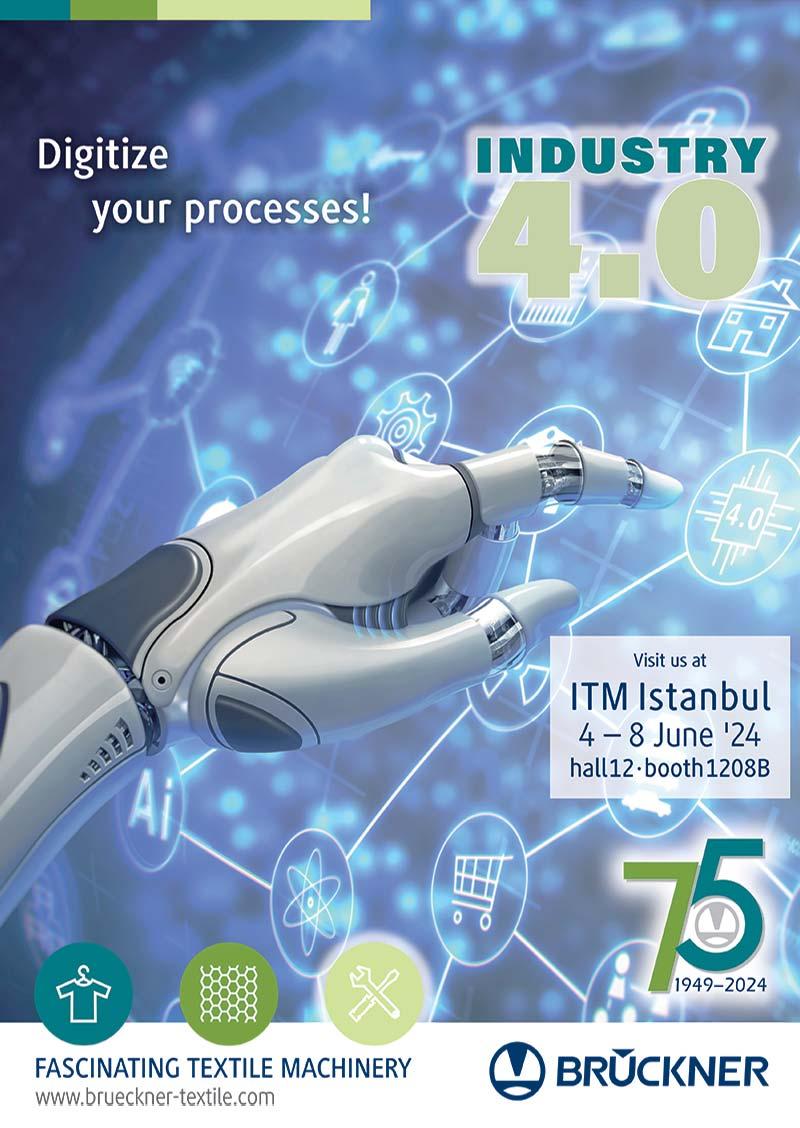

The awards ceremony of the Walter Reiners Foundation of the VDMA Textile Machinery Association to students and young engineers from German universities for outstanding achievements in their studies took place at Techtextil 2024 in Frankfurt/Main. The nationwide awards were presented by Mr. Peter D. Dornier, Chairman of the Board of the Walter Reiners Foundation, at the VDMA trade fair stand.
M. Sc. Katharina Maria Ernst developed a process for the thermal stabilization of chitosan filament yarn on the basis of thermoanalytical investigations and batch tests.
The aim of the Euros 3500 project was to investigate chitosan as an alternative raw material for carbon fiber production. Up to now, the petroleumbased precursors PAN and pitch have mainly been used. Due to the increasing demand for carbon fibers, new precursors
based on renewable raw materials are being sought. In contrast to cellulose and lignin, chitosan has not yet been extensively investigated and could also be suitable for carbon fiber production due to its chemical similarity to cellulose. Chitosan was thermoanalytically investigated in the thesis and a stabilization process with several heating zones was developed in which stabilized fibres based on chitosan could be successfully produced. With the thermal stabilization processes developed, no positive influence on the carbon yield could be demonstrated. However, the investigations of the conversion processes form a good basis for adapting and optimizing the stabilization process accordingly so that more sustainable carbon fibres can be produced from chitosan in the future.
Lena Fink was awarded the sponsorship prize in the category "Project work in German textile mechanical engineer-
ing" for her work entitled "Development of a device for changing bobbin lace spring tensioning systems".
The project work, worth Euros 3,000, was completed as part of a specialist internship at ADMEDES GmbH. The aim of the project work was to develop a new device for changing the flat springs of the clapper spring assembly. To this end, the existing assembly process was analyzed and then the entire design development process was run through. The preferred variant identified was manufactured, assembled and tested. The device developed enables the safe and timeefficient changing of spring tensioning systems for the braided bobbins used. It meets all safety and quality requirements. The use of the device reduces the risk of injury and accidents for production employees and increases the effectiveness of the changing process.
The employees of ITM are proud and congratulate the award winners.


Archroma, a global leader in specialty chemicals focused on sustainable solutions, and ColorDigital GmbH, the company behind DMIx, a pioneer in textile supply chain digitalization, are joining forces to bring the textile industry’s largest library of engineered color standards to the DMIx ecosystem of fashion brands and suppliers.
All 5,760 color references in the Color Atlas by Archroma® will be integrated into ColorDigital’s DMIx interactive collaboration platform, enabling brands to embrace almost unlimited color creativity with an assurance of color precision. Based on digital twin technology, the DMIx solution ensures that color choices are aligned across design, sourcing and production, reducing sampling costs and collection development time as well as improving color accuracy and end-product quality. In short, DMIx marks a significant step forward in enhancing color management processes for both digital product creation (DPC) and physical production.
Sustainability is an essential factor for both Archroma and DMIx. Colors in the Archroma Color Atlas are formulated to comply with leading eco-standards while
also delivering consistent and accurate color reproduction. This complements the DMIx ImpAct approach, which provides data on the environmental impact of raw materials to enable brands to select inputs that meet their sustainability targets.
“Archroma takes a ‘Planet Conscious’ approach to color. Like DMIx, we want to empower designers to make sustainable choices from color inspiration to execution. That’s why we build achievability criteria into our colors standards, considering eco-compliance, fastness performance, color consistency and resource efficiency, and why we offer global technical support,” Chris Hipps, Global Head of Archroma Color Management, said.
Gerd Willschütz, COO and CoFounder of ColorDigital, said: “Strategic color management can transform textile and fashion businesses and drive commercial success. We are delighted to collaborate with Archroma to help make color development and production more creative, efficient and accurate, and more environmentally responsible too.”
A new feature on the DMIx platform is DMIx eXcite, an inspirational material and color-trend hub that uses interactive moodboards to share new color and
material scenarios ahead of each season. Designers and colorists will be able to directly use colors presented in the eXcite trend reports, including colors from the Color Atlas by Archroma®, across the DMIx color and 3D technology tools.
The Color Atlas by Archroma® is part of the Archroma Color Management+ design and development solution for more sustainable textiles and fashion through fast color selection and creation, consistent and accurate color reproduction, and reduced environmental impact.


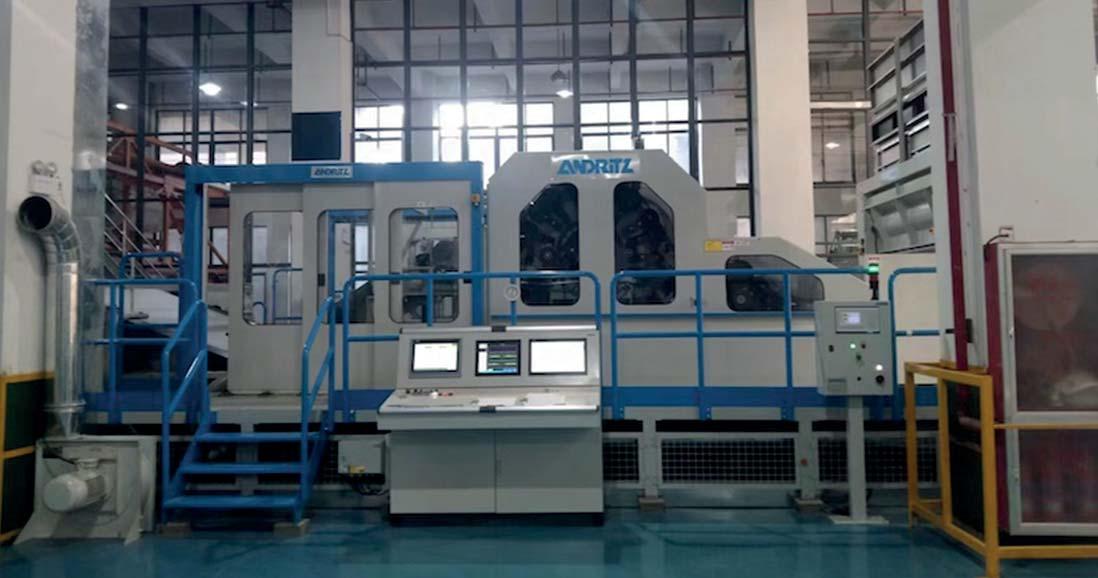
Meisheng Group has started up a new ANDRITZ needlepunch line at its facility in Shaoxing City, Zhejiang Province, China. It is the third line supplied by ANDRITZ to the renowned manufacturer of high-end nonwoven synthetic leather. This expansion will enable Meisheng to address the growing demand for synthetic suede in the automotive industry, particularly for New Energy Vehicles (NEVs).
Mr. Qian Guochun, CEO of Meisheng, commented: “In view of the
strong demand for our premium synthetic suede, especially for NEVs, we have placed our trust in ANDRITZ for the third time. With the new needlepunch line we are expanding our capacity while maintaining our high quality standards.”
The advanced line is equipped with a ProWid™ system that allows Meisheng to ensure an optimum web weight regularity across the full product width. As a result, the web distribution is drastically improved, which reduces material consumption (fibers) and
improves web weight evenness (CV%) –factors that are particularly important in synthetic leather manufacturing for automotive applications.
Founded in 1994, Zhejiang Meisheng New Material Co., Ltd. is an internationally renowned maker of highend textiles and nonwoven synthetic leather. Through a consistent focus on R&D, Meisheng has established itself as a pioneer in the production of nonwoven microfiber synthetic leather in China.
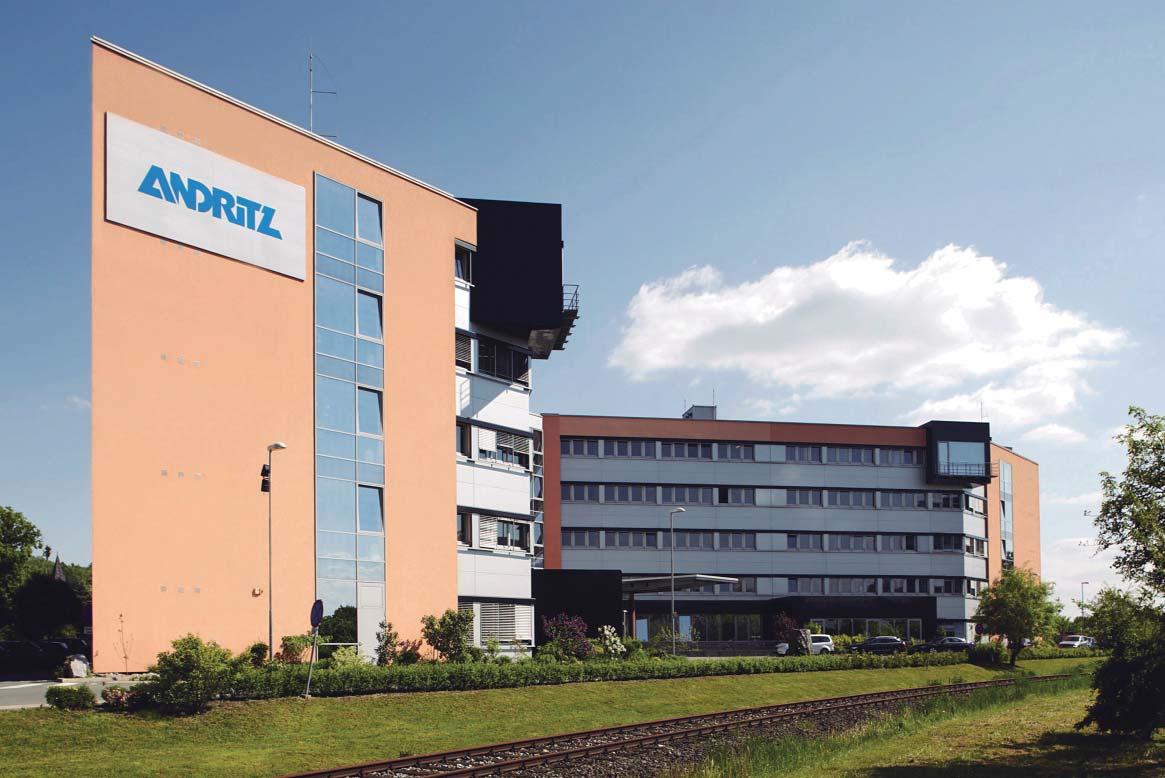

Integrated textile mill Nuevo Mundo is partnering with Archroma, a global leader in specialty chemicals focused on sustainable solutions, to offer collections utilizing Archroma’s EarthColors® agricultural waste based dyes and produced with zero liquid discharge and substantial resource savings.
A strategic partner of apparel brands, Nuevo Mundo is a market leader in South America with a 75-year history. It helps brands expand into new markets with value-added products that capture growing consumer demand for quality and sustainability. The company is a pioneer in the adoption of water-saving processes and chemicals that have minimal impact on the environment.
Working with its longstanding partner Archroma, Nuevo Mundo is now reinforcing its commitment to sustainability with the creation of new collections that utilize Archroma’s biowaste-based EarthColors® dyes. Based on patented Archroma technology, these high-performance dyes are from non-edible agricultural or herbal industry waste in a process that helps to reduce the negative impact on water footprint, natural resources and climate change compared to conventional synthetic dye production where toxic and nonrenewable oil derivative products are used as raw material.*
The organic raw materials used for the dyes created for Nuevo Mundo include residues from cotton plants, beets and saw palmetto. In addition to using these biowaste-based dyes, the EarthColors® collections will be produced in Nuevo Mundo’s zero liquid discharge facilities, providing savings in time, water and energy, as well as emissions.

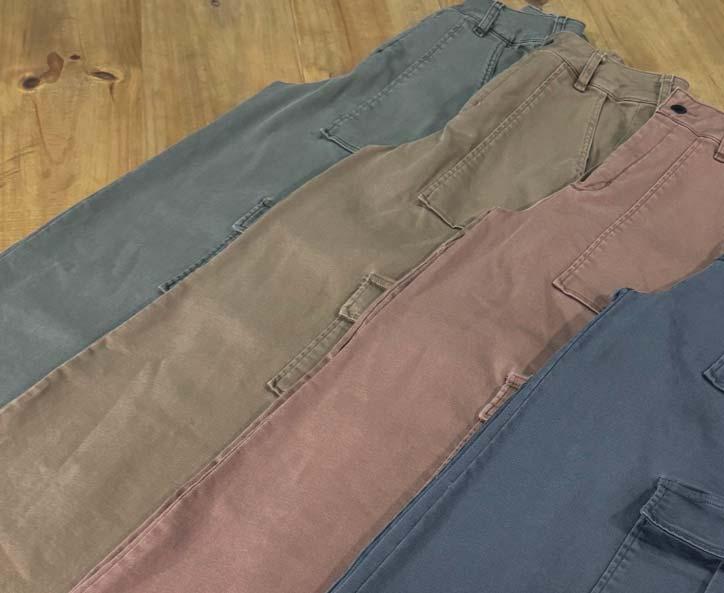
Umberto De Vita, Director, Denim Market Segment, Archroma Textile Effects, said: “Like our partner Nuevo Mundo, Archroma is passionate about working with brands to move our industry towards a future where businesses can thrive and care for people and the planet at the same time. This approach is captured in our ‘Planet Conscious+’ vision of deeper collaboration, supported by breakthrough technologies like EarthColors®.”
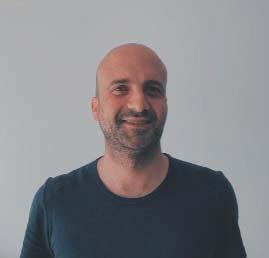
Boris Schwartzman, Nuevo Mundo, said: “With the trend towards nearshoring gaining momentum in the U.S., now is the ideal time for South American brands to capture demand for high-quality clothing and textiles that deliver the sustainability that the American market demands. Our partnership with Archroma and the introduction of EarthColors® into our collections creates a real opportunity for growth.”
Nuevo Mundo and Archroma intend their alliance to be a long-term collaboration, with plans to release new collections based on EarthColors® in the coming year and beyond.

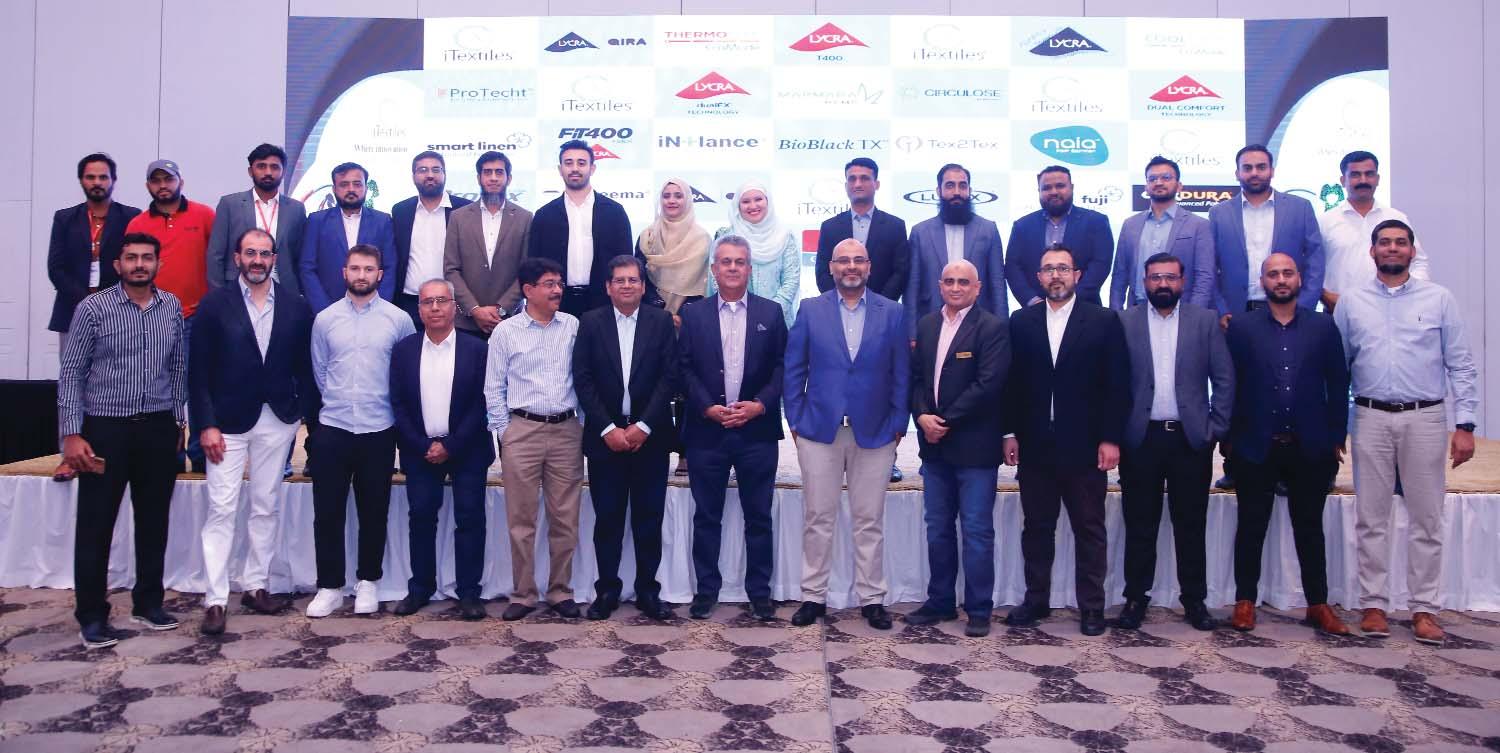
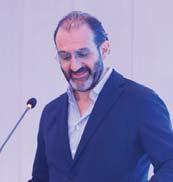
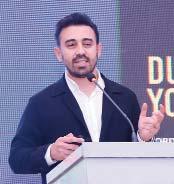

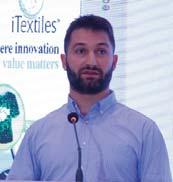
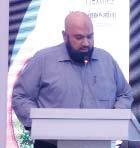
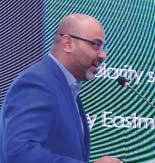
iTextiles recently hosted an insightful seminar that delved into the realms of innovation and sustainability within the textile industry. Held on May 3, 2024 at Nishat Hotel Lahore, the seminar brought together industry leaders and experts to discuss the latest advancements and trends shaping the future of textiles.
The seminar commenced with a warm welcome from iTextiles' CEO, Mr. Mujeeb Ullah Khan, who emphasized the importance of collaboration and knowledgesharing in driving positive change within the industry. Attendees were then treated to a lineup of esteemed speakers, each bringing their unique insights and expertise to the table.
Fabrizio Maggi, the Apparel Commercial Director South Asia and EMEA Distribution at The LYCRA Company, set the tone for the seminar by introducing the audience to the next generation Bio-Derived LYCRA® Fiber made with QIRA®. This revolutionary step in the
textile industry promises to boost sustainability and pave the way for eco-friendly textile solutions. Fabrizio further presented the latest sustainable LYCRA technologies for the denim segment, highlighting the brand's commitment to driving sustainable innovation across the market.
Oguzhan Gumuskaya, the European Account Manager for CORDURA® at INVISTA, took the stage next to discuss the importance of durability in performance textiles. He emphasized how durable choices are inherently sustainable for the planet, aligning with INVISTA's core values and culture.
Taqerrub Raza Sayeed, the Global Product Development Manager for CORDURA® Brand, discussed the brand's innovative products and their applications in both consumer and military segments.
Samuel Goldstein is a circular materials technologist and entrepreneur, working as Chief Operating Officer at Earth ProtexTM captivated the audience with insights into the company's innovative product, Tex2TexTM. This revolutionary textile-to-textile recycling model moves beyond single-use plastics downcycling and towards upcycling textile-to-textile recycling. Samuel showcased the significant impact of Tex2TexTM on CO2 reduc-

tion, energy consumption, water usage, and solid waste disposal, highlighting its role in achieving the sustainable goals of the textile industry.
Adeel Anwar, GM Sales at iTextiles®, shared valuable insights into Naia Renew, an innovative fiber that is making waves in the textile industry. Adeel discussed Naia's applications in home textiles and apparel, emphasizing how Naia is making fashion sustainable without compromising on style, comfort, and hand feel. His presentation underscored the importance of sustainable fiber choices in driving positive change within the industry.
Aamir Pingal, the Regional Sales Manager for IFF, concluded the presentations by sharing insights into IFF's sustainability journey and the development of sustainable enzymes for the textile industry. His presentation underscored IFF's commitment to sustainability and its efforts todrive positive change within the industry.
The seminar drew attendance from major textile industries across Karachi, Lahore, Faisalabad, and Multan, including renowned Mills such as Reliance Mills, Kay & Emms, Masood Textile Mills, Interloop, Shahire Textile Mills, Naveena Denim, Nizam Sons, and many more. Their presence underscored the significance of the seminar in the textile industry landscape.
Throughout the seminar, attendees had the opportunity to engage in interactive discussions and networking sessions, fostering collaboration and idea exchange.

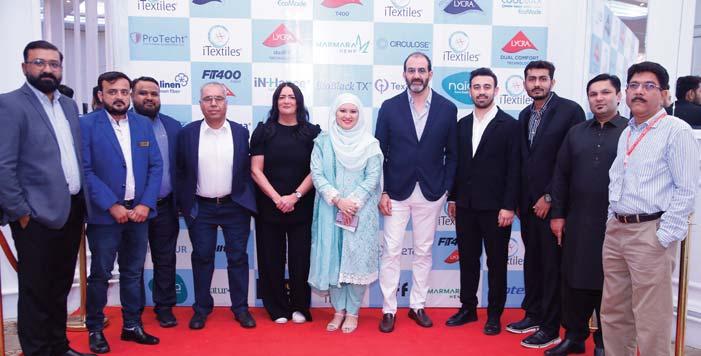

The event concluded on a high note, with attendees expressing their appreciation for the valuable insights shared by the speakers.
As the curtains closed on the seminar, it was evident that the event had succeeded in its mission to inspire, educate, and empower industry professionals to embrace innovation and sustainability in their respective roles. iTextiles looks forward to continuing the dialogue and driving positive change within the textile industry.


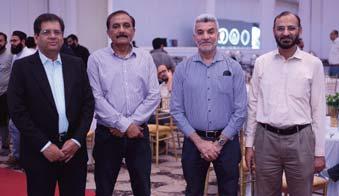
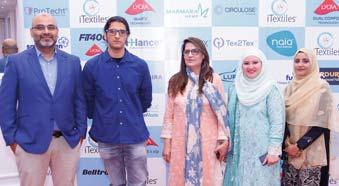
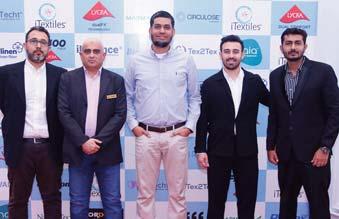
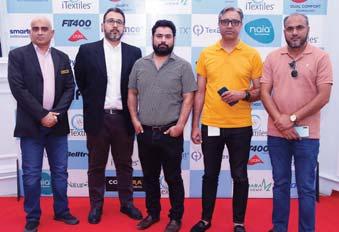
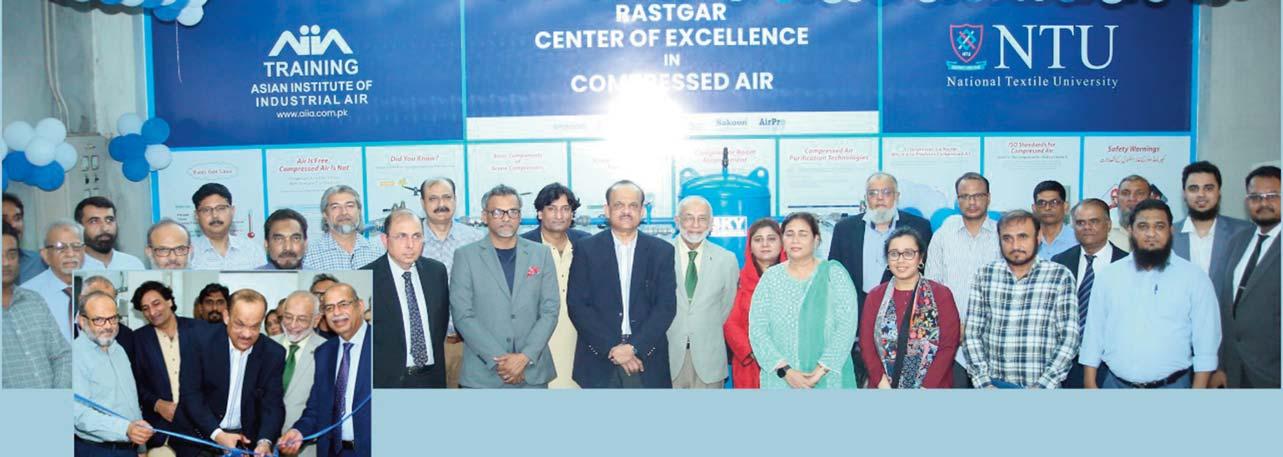
In a landmark initiative for Pakistan's industrial sector, the National Textile University, Karachi Campus, together with the Asian Institute of Industrial AirAIIA and its main sponsor, the Rastgar Group, proudly announces the inauguration of the new Center of Excellence in Compressed Air (CECA). This center is poised to dramatically enhance the competitiveness and sustainability of industries throughout the southern region of Pakistan.
Located in the bustling industrial hub of Karachi, CECA was established by the Asian Institute of Industrial Air with substantial support from its main sponsor, the Rastgar Group. The center is committed to:
Providing Specialized Employee Training: CECA delivers expert training in compressed air system optimization. Through targeted workshops and real-world applications, employees gain critical skills to enhance system efficiency, leading to reduced operational costs and better resource management.
Boosting Productivity and Environmental Sustainability: Effective management of compressed air systems helps minimize downtime and energy waste, contributing to greater productivity and environmen-
tal sustainability. The center trains technicians to swiftly troubleshoot and maintain systems, ensuring continuous industrial operations.
Enhancing Industry Competitiveness: With reduced operational costs and improved system reliability, businesses equipped with skills from CECA are better positioned to compete in both local and international markets. This heightened competitiveness is essential for fostering long-term industrial growth.
Following the successful model established by its Faisalabad counterpart, CECA Karachi is designed to replicate and expand upon these achievements. It specifically serves the burgeoning needs of the southern industrial sector, setting a new standard for training excellence in the region.
Quotes:
Dr. KHALID PASHA, Director, NTU Karachi Campus: "Through the collaboration with the Asian Institute of Industrial Air and the generous sponsorship from the Rastgar Group, CECA Karachi is set to revolutionize how our industries operate, making them more competitive and sustainable."
Syed Johar Ali Qandhari, President, Korangi Association of Trade & Industry

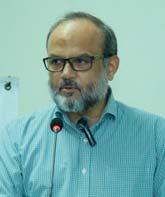
(KATI) : "The establishment of CECA here in Karachi is a strategic boost to our local industries, providing them with the tools to thrive in an increasingly competitive global marketplace."
The partnership between NTU, the Asian Institute of Industrial Air, and the Rastgar Group exemplifies the synergy that is essential for fostering a skilled and innovative workforce. This collaborative effort underscores a commitment to industry-leading training and development.
The inauguration of CECA Karachi marks a significant milestone in industrial training and development in Pakistan. This initiative not only enhances operational efficiencies but also paves the way for sustainable industrial practices across the region.

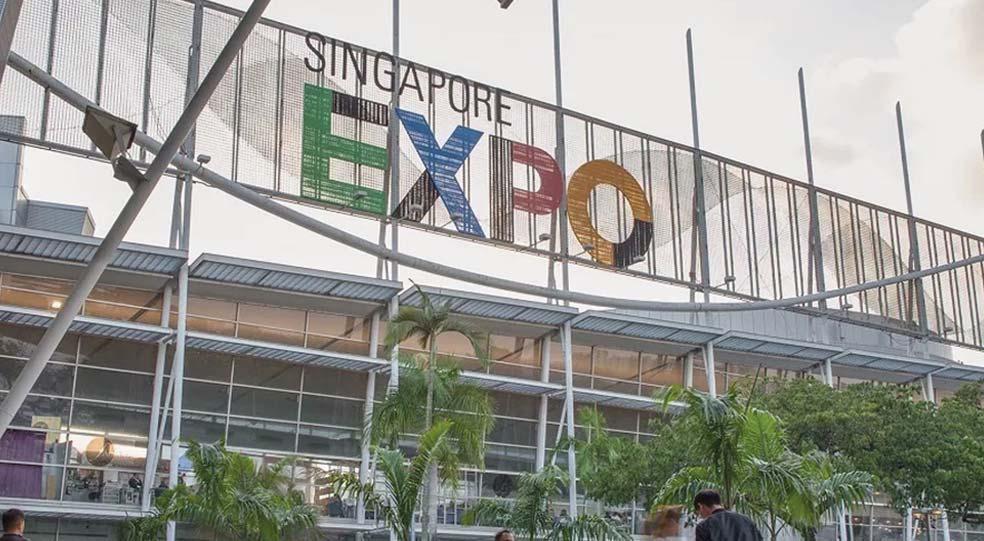

The ITMA ASIA + CITME, Singapore 2025 exhibition has attracted heightened levels of interest since it was launched in Milan last June. Drawn by the regional market opportunities, many leading textile technology brands are looking forward to apply for their booth space when online space application opens from 9 April 2024.
The Singapore edition is scheduled to be held at Singapore Expo from 28 to 31 October 2025. It is owned by CEMATEX (the European Committee of Textile Machinery Manufacturers), China Textile Machinery Association (CTMA) and SubCouncil of Textile Industry, CCPIT (CCPIT-Tex).
According to the show owners, there is a huge increase in enquiries from machinery manufacturers as the Singapore exhibition targets not only South and Southeast Asia, but also from very important markets in the Middle East.
Mr Ernesto Maurer, president of CEMATEX, explained, “These regions present vast opportunity for our members as technology buyers from these textile and garment hubs are sourcing costeffective and sustainable solutions to modernise and upgrade their production.
“The Singapore exhibition complements our ITMA exhibition in Europe and the ITMA ASIA + CITME exhibition in China. The platform will help to broaden our exhibitors’ market focus and diversify their reach, enabling them to effectively engage with many of
the buyers who were not able to attend these two exhibitions previously. For these buyers, we are convinced, Singapore is more accessible due to its closer proximity to their home countries, but even more so due to its visa-friendly policy.”
Mr Gu Ping, president of CTMA, said: “The combined exhibition in Singapore has opened a new phase of development for CITME. We are excited to bring our members along as we ride the wave of regional opportunities through the Singapore edition.”
Ms Chandrima Chatterjee, secretary general of the Confederation of Indian Textile Industry (CITI), welcomed the staging of the exhibition in Singapore. She said: “This expansion of the exhibition from Shanghai to Singapore recognises the growing needs of the Asian textile industry, especially India. The industry today is looking for technologies to meet its need for optimising production, minimising supply chain risks, better control of quality and finishes, and enhancing sustainability in all aspects of production.”
She added: “We look forward to the Singapore exhibition to address these needs and help this biggest textile manufacturing and exporting region of the world leverage the latest in technology and innovations.”
To mark the opening of space application, a webinar titled Springboard
to Regional Markets will be held on 9 April 2024 (Tuesday) at 3pm SGT. To register for the live session, visit https://www.itmaasiasingapore.com/web inar/9apr.
Billed as The Leading Textile Technology Exhibition Driving Regional Growth, ITMA ASIA + CITME, Singapore 2025 is expected to gross 60,000 square metres. It aims to attract over 600 exhibitors and a visitorship of 30,000. The combined exhibition is organised by ITMA Services and co-organised by Beijing Textile Machinery International Exhibition Co., Ltd.
Mr Daisuke Murata, president of Japan Textile Machinery Association (JTMA), said: “We congratulate the ITMA ASIA + CITME owners for making the decision to have a second exhibition in Asia. The Singapore exhibition will be useful for our members to better penetrate other regional textile hubs in Asia, and as far as the Middle East.”
Prominent textile technology providers are also eagerly eyeing the start of space application for the combined exhibition.
Ms Rebekka Dilo of Dilo Systems GmbH shared that the group is looking forward to the Singapore edition of ITMA Asia + CITME 2025. She enthused, “As an important gathering of the whole textile industry, it is a great opportunity for us to present our latest innovations.”
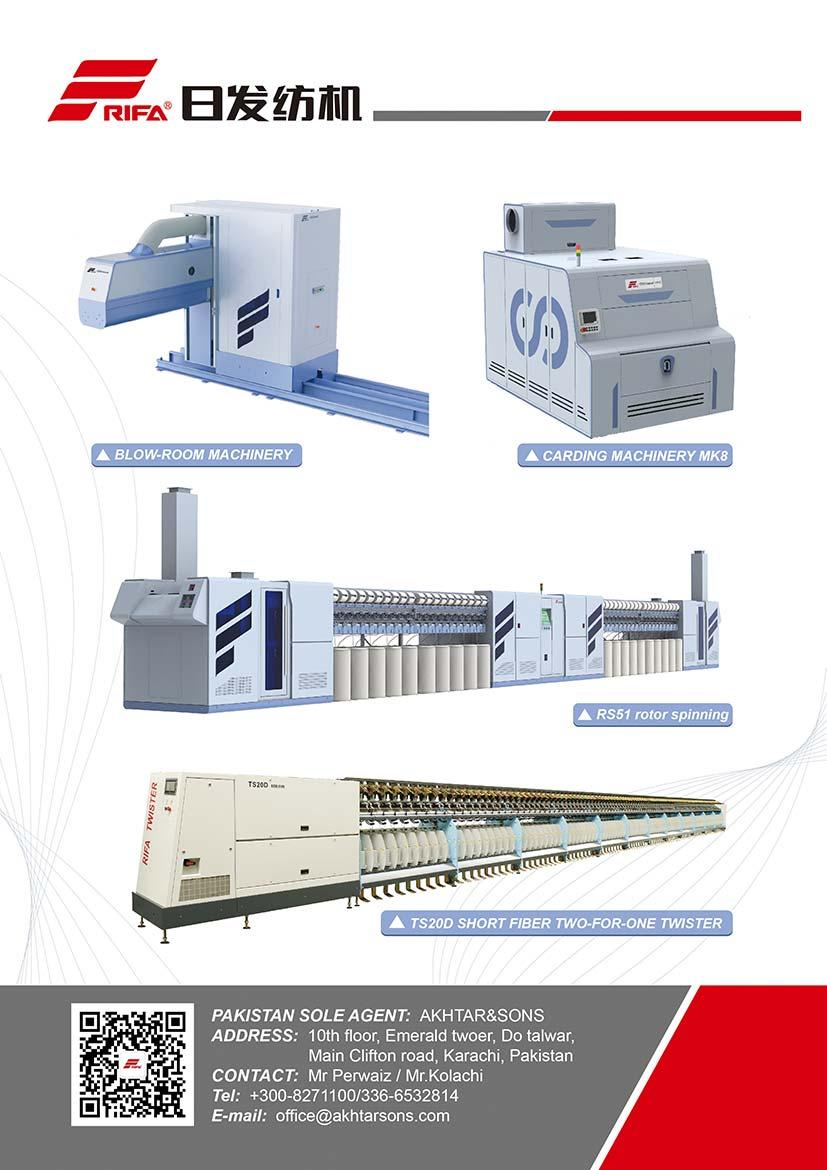
Welcome to our interview with Sonia Wedell-Castellano, the Global Director of DOMOTEX at Deutsche Messe AG. With DOMOTEX Middle East returning to Dubai, we have the opportunity to gain insights into the rationale behind this decision and what attendees can expect from this prestigious event.
DOMOTEX Middle East is making its comeback to Dubai. Could you kindly provide insight into the rationale behind this decision to return to the region, as well as the selection of Dubai as the show’s location?
Despite global economic challenges, the construction sector in the Middle East and North Africa (MENA) region has not only proved remarkably resilient, but is continuously growing.
These regions were forecasted to be among the best performing regions for construction activity in 2023 and beyond, according to GlobalData’s Global Construction Outlook to 2027 report, which was published in early 2023.
With more and more specific construction projects in Dubai, such as Dubai Creek Harbour and other Emaar projects, in Abu Dhabi on Saadiyat or Yas Island or in the KSA, such as NEOM, THE LINE and GIDORI in the pipeline, the Middle East will continue to be an absolute boom region for all companies involved in building and furnishing for decades to come.
Exploring the Dynamics of DOMOTEX Middle East: An Interview with Sonia Wedell-Castellano, Global Director
This positive outlook has a knock-on effect on related sectors such as real estate, interior design, furnishings and flooring. Therefore, the demand for carpets and floor coverings is constantly growing. The Middle East floor coverings and carpets market is expected to grow at a CAGR of 7.2 percent from US$8.6 billion in 2022 to around US$14.55 billion by 2030.

As the epicenter for business and tourism, Dubai is known for its inclusivity and diversity and as such, presents an ideal setting for DOMOTEX Middle East. With an exceptional business and trade infrastructure, a global aviation hub connecting the world as well as efficient public and private transportation, Dubai guarantees effortless and convenient access to the show for both, exhibitors and visitors alike.
I am very pleased with our determination and courage to provide the industry a highly attractive platform in this fast growing market with its incredibly promising potential.
DOMOTEX Middle East offers the perfect opportunity to gain a comprehensive overview of the market, discover and compare trends and innovations and to engage with other participants, exhibitors and visitors alike. We are looking forward to welcome everyone in Dubai in just a few weeks’ time.
What factors influenced the decision to hold DOMOTEX Middle East at the Dubai World Trade Centre (DWTC), and in what ways does this venue contribute to enriching the exhibition experience for participants?
The DWTC is the perfect venue for DOMOTEX Middle East as we have had good experiences in the past. It is one of the largest venue operators and home to the region’s leading convention and
exhibition centre, offering a dynamic calendar of international trade shows with an unrivalled line-up of leading exhibitions and conferences across all industries.
With decades of experience in organising events in the Middle East, DWTC will help us ensure an enjoyable and seamless experience for all attendees of DOMOTEX Middle East.
What can attendees expect regarding exhibitors and product showcases at DOMOTEX Middle East?
DOMOTEX Middle East is the first event to bring together the leading global brands Merinos, Oriental Weavers, Solomon Carpet and Al Abdullatif at a single show in Dubai. The commitment of these leading brands is not only an important gesture for us as organizers, but for the entire industry. Being in Dubai in April is everything!
Visitors can look forward to even more excellent exhibitors such as Farrahi Carpets, Almas Kavir Carpet, Standard Carpets, Abu Dhabi National Carpets, Heritage Carpet, Madhu India, Nirmal International, Extraweave, Dodhia Synthetics Limited, Nayyer Industries, Indian art Gallery, Card Monroe and many more. All of them will be showcasing their top products and latest innovations – including contemporary designs, unique pieces and superb craftsmanship. The show offers an unparalleled variety of flooring products, styles and materials, from handmade and machine-made carpets and rugs to antique carpets and floor coverings.
One of my personal highlights of the show will be presented by Iranian manufacturer Azim Silk Carpet Trading. As well as being an outstanding piece of art and craftsmanship, it’s also the largest carpet ever shown at a DOMOTEX event.
It measures 600 m² and is part of the Tabriz Premium Silk Warp, which consists
of four carpets that together form a carpet covering an area of 2,000 m². These carpets have been meticulously handcrafted by 230 weavers over a period of seven years. I’m looking forward to seeing it live in April, as the Tabriz Premium Silk Warp is an excellent example of the outstanding quality of handmade carpets produced in the Middle East.
As a leading international trade fair company, how does Deutsche Messe envision the future of DOMOTEX Middle East? What are the expectations for future editions of the event?
Naturally, we would like to become the leading event for carpets and floor coverings in the Middle East. Our next editions will be even bigger than this year’s. We already have a ton of ideas for special displays and collaborations in mind. For now, though, we’re going to focus on the first show. Never take the second step before you’ve taken the first.
What are the competitive advantages of the DOMOTEX brand compared to other events in the flooring sector?
DOMOTEX is the world’s leading brand of trade fairs for the carpet and floor coverings industry and has been at the forefront of strong, exceptional events since 1989. For us, carpets and floor coverings are not just one of many exhibition areas – as is the case at other events – but the centre of attention. DOMOTEX is entirely dedicated to the flooring industry.
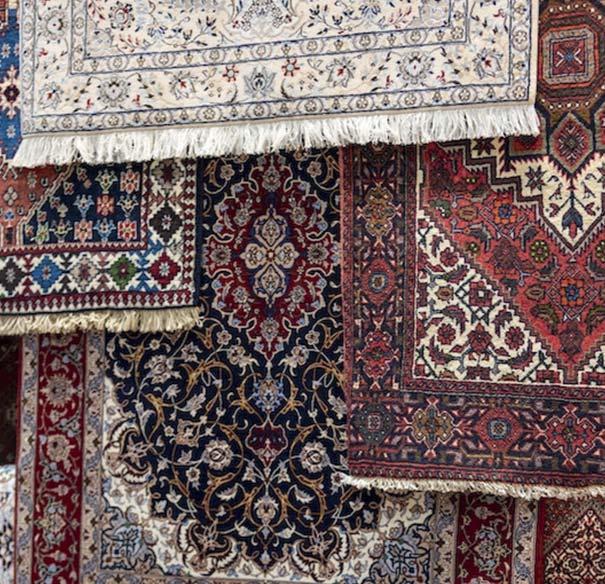
In addition to our many years of experience as organisers and hosts of events for this unique industry, another strength of the DOMOTEX brand is the fantastic team. We are flooring enthusiasts and very passionate about what we do.
We love DOMOTEX and we love the community. I believe whenever we approach potential exhibitors and visitors, they can sense our enthusiasm and trust us to organise and stage great events for

them as we share a passion: A passion for carpets and flooring!
What are you looking forward to the most at DOMOTEX Middle East?
I am looking forward to the conversations with exhibitors, partners and visitors alike. They are the essence of each DOMOTEX event, the essence of what makes it the home of the entire industry and the reason why we are doing what we are doing.
There is nothing better than the opportunity to engage on a professional and personal level with all of them – and see them all leaving the fairgrounds with a big smile on their faces.
Sonia Wedell-Castellano has been with Deutsche Messe since 2011, where she has served as Sales Director and Global Director of Hannover Messe. In 2018, she took over responsibility for DOMOTEX as Global Director. Before moving to Hannover, the industrial and multi-language specialist was Marketing Manager Europe for the DMG Mori Group, a global manufacturer of machine tools.
Demand for the Autoconer X6’s new open prism technology is accelerating across markets globally. The open prism OZ2 covers a wider application range and is a gamechanger for spinning mills. This new technology can process standard, elastic and multicore yarns based on improved splice quality and splice process.
The open prism splice technology is designed to cover nearly the complete material and yarn spectrum with a minimum number of prisms. Having started with applications limited to single yarns made of 100% cotton and blends with more than 30% cotton, the material range was rapidly expanded in the last two years due to intensive technological testing. Now spinning mills can cover the entire spectrum of cotton yarns and cotton blends with the open prism technology. In addition, elastic yarns in a wide variety of material combinations consisting of cotton, polyester, viscose, and blends as single, duo or multi-core yarns are possible.
The prism OZ1 is recommended for yarn count Ne 30 to Ne 120 and finer. With the all-new OZ2 prism, customers can widen the application range down to Ne 4. Because of its versatile application in coarser yarn count ranges, the prism OZ2 is particularly well-suited and recommended as an all-rounder for duo or multi-core yarns.
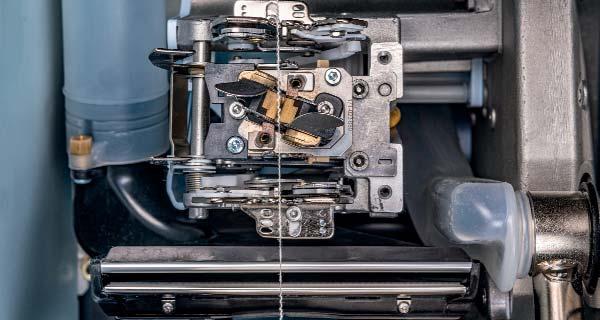
Rieter customers can take an application-oriented decision: spinning mills which focus on a yarn count range finer than Ne 30 and process cotton yarns, cotton blends or cotton-elastane blends select the standard version OZ1. For spinning mills with the widest application ranges and with different yarn structures and material combinations (cotton, polyester, elastane, viscose), Rieter recommends the optional prism OZ2 (Fig. 1).
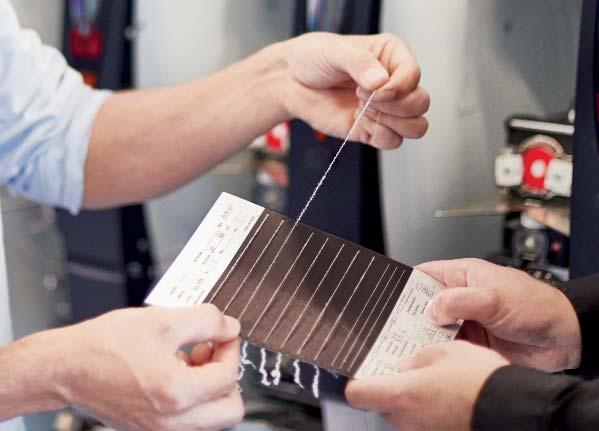
The production of modern denim fabrics requires both coarse single yarns and high-elastic core yarns, such as single, duo-core or multi-core yarns, with very different material combinations. This is where the open prism technology is unique and unbeatable: all types of yarns can be processed with one splicing system. Customers can easily switch between elastic and standard yarn processing. The splicing parameters are almost the same. This is a big advantage compared to competitor splicing systems which have
limitations in terms of universal applicability.
For a very large variety of elastic yarns dry splicing is possible and will lead to yarn-like splice results (Fig. 2). For applications which need highest yarn strength and thus splice strength as well (average splice strength > 90-95%), the use of a very small amount of water is recommended to be on the safe side. Due to a minimized amount of water, drastically less cleaning is required. The splice process itself is more stable, while the fault rate and number of splice cuts are reduced to a minimum.
Open prism technology guarantees elasticity of the splice zone right through to the finished fabric including dyeable splice joints for uniform dyeing process and embedded elastic filament ends. This results in reduced splice failure rates in weaving and knitting by approx. 50-70% and, thus a higher quality of the finished products.
The universality of the Autoconer splice technology makes the use of the innovative open prism splice technology not only possible for new machines but it can also be retrofitted on all machine generations down to the Autoconer 338. In future the application range of the open prism splice technology will be expanded to S-twisted yarns with the prism OS.
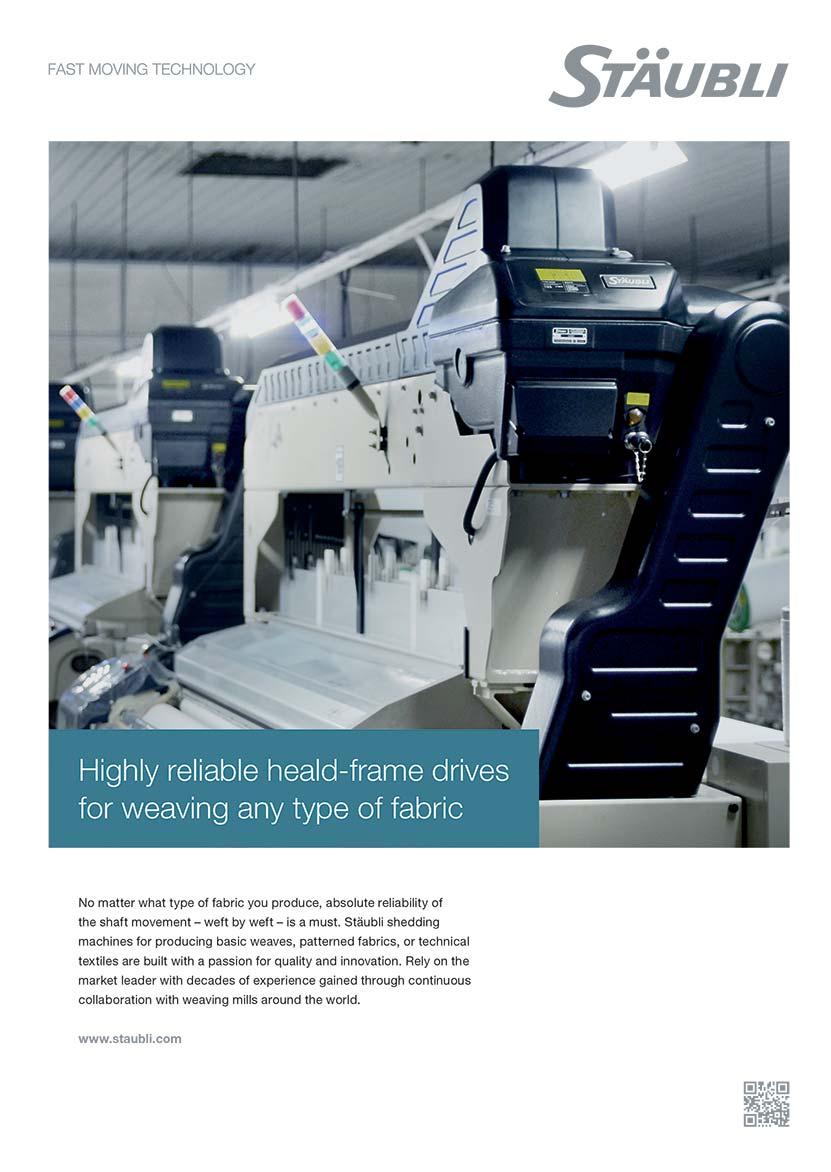
The U.S. Cotton Trust Protocol has today announced the appointment of a refreshed and expanded Board of Directors. The refreshed board comes with the appointment of 11 new board members and expands the board from the previous 16 to now 22 members.
The appointment of the new board comes as part of a governance review four years into the successful development of the program, and at a natural inflection point in the Trust Protocol’s evolution. The board has been expanded in particular to give greater and more equal representation to international stakeholders and across the entire supply chain, while enhancing its diversity.
The U.S. Cotton Trust Protocol Board of Directors announced today includes:
four growers, each representing one of the four U.S. cotton-growing regions;
three representatives of gins and cottonseed producers; four merchants and cooperatives; four mills and manufacturers; three representatives from NGOs and academia, and four brand and retailer members
The refreshed board is structured to deliver on the Trust Protocol’s emphasis of further connecting the supply chain from the farm to end user, driving demand from all segments, and seeking to improve impact, as well as building program understanding amongst growers to drive continued enrollment.
With a view to ensuring fresh perspectives while retaining institutional knowledge, board members are appointed for a period of two years renewable once. An Advisory Council with a fluctuating number of seats complements the board by providing adhoc expertise on specific topics.
Commenting on the board appointments, Daren Abney, Executive Director of the U.S. Cotton Trust Protocol, said:
“I’m thrilled about the formation of our newly refreshed Board of Directors.

Comprised of exceptional experts and leaders spanning the global supply chain, this board represents a significant milestone in the governance of the U.S. Cotton Trust Protocol. By incorporating a blend of domestic and international voices, this board will ensure a diversity of perspectives that will drive value for all members across the supply chain, while ensuring that cotton growers remain at the very heart of the program.”
The new board members are:
Cotton Growers
Sam Whitaker, Partner, Whitaker Farms Gins and Cottonseed
Larry Black, General Manager, Central Rolling Plains Gin Coops and Merchants
Krista Rickman, Commercial Strategic Lead, Cargill Cotton
Carlos Garcia, Director of Sales, Plains Cotton Cooperative Association
Mills and Manufacturers
Adolfo Kalach, Vice President, Kaltex Manufacturing Group
Saima Chowdhury, Founder and CEO, Noi Solutions LLC
NGOs and Academia
Suzy Friedman, Senior Director of Food Policy, World Wildlife Fund
Tyson Raper, Associate Professor, Pettigrew Cotton Specialist, University of Tennessee Brands and Retailers
Katherine “Katie” O’Hare, Senior Director, Sustainability, J. Crew Group
Agata Smeets, Head of Environment and Product Sustainability, Gap Inc.
Virginie Cayzeele, Head of Raw Materials, Kiabi
They join existing members:
Cotton Growers
Aaron Barcellos, Partner, A-Bar Ag Enterprises
Dahlen Hancock, Owner, DK & J Farms
Matt Coley, Owner, Coley Farms
Gins and Cottonseed
Fred Serven, General Manager of Cotton, Archer Daniels Midland
David Blakemore, President, Blakemore Cotton and Grain, LLC
Coops and Merchants
Henry “Hank” Reichle, President and CEO, Staple Cotton Cooperative Association
William “Buddy” Allen, President and CEO, American Cotton Shippers Association
Mills and Manufacturers
Jim Martin, Executive Vice President of Cotton Operations, Parkdale Mills, Inc.
Mike Quinn, Vice President of Cotton Operations, Gildan yarns, LLC.
NGOs and Academia
Kris Johnson, Director of the North America Agriculture Program, The Nature Conservancy
Brands and Retailers
Hitesh Sharma, Senior Lead, Sustainable Sourcing and Traceability (Global Sustainability), Levi Strauss & Company
In recent years, Italian circular knitting machine manufacturer Santoni (part of the Lonati Group) and Groz-Beckert have worked together to develop a new self-cleaning knitting system for the INNOTAS circular knitting machine. The knitting system is also called INNOTAS and consists of the circular knitting machine needle SANTM DUO and the corresponding sinker SNK DUO-OL.
Driven by the increasing demands on sustainability aspects and the desired increases in efficiency, Groz-Beckert had the goal of developing a new, energyefficient knitting system. Groz-Beckert approached Santoni with a corresponding cooperation request. Following various preliminary investigations, the go-ahead was finally given in January 2015 for the joint development of a self-cleaning system in the needle area with side-byside needles and a low shank.
The circular knitting machine needle SANTM DUO with the sinker SNK DUOOL was developed to meet the desired requirements. The special feature: In the innovative knitting system, there are two needles in the needle channel and two sinkers in one sinker channel. The benefits became apparent in initial field trials with experienced end customers in 2016. In the following years, the knitting system was continuously analyzed and further optimized.
The double filling in the needle channel significantly reduces soiling. In addition, the further developed shape of the knitting system ensures that any yarn lint is automatically removed from the machine during the knitting process. This extends the cleaning interval, making work more time-efficient and increasing productivity.
Both the needle SANTM DUO and the sinker SNK DUO-OL are characterized by a particularly low shaft with a predetermined breaking notch.
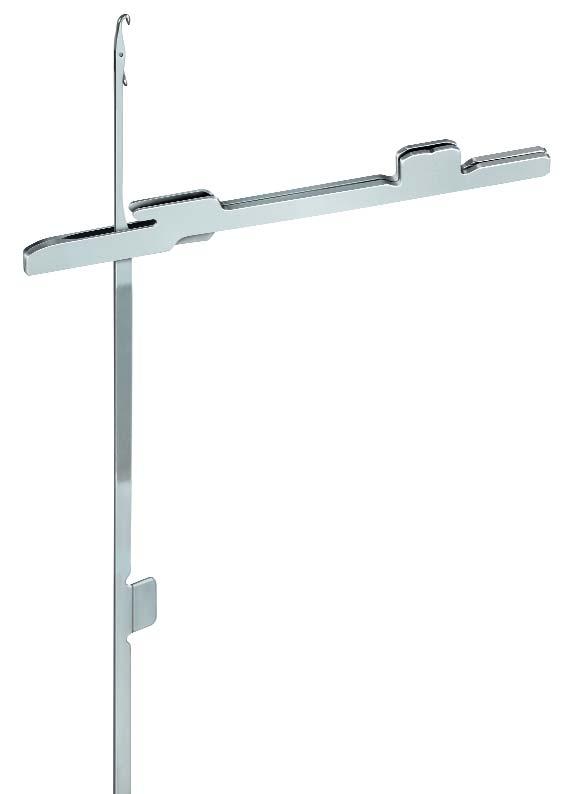
The low shank minimizes soiling, while the predetermined breaking groove enables controlled needle breakage in the event of wear at the desired point. This reduces errors in the knitting process and machine downtimes.
Groz-Beckert offers interested machine builders various cooperation opportunities to jointly develop new
products or improve existing ones. Groz-
and solution provider for textile construction and reinforcement solutions made from high-performance technical fibers for composite materials.
The group consists of the companies Groz-Beckert, TKM and solidian and generated sales of 880 million euros in 2023 with around 9,500 employees worldwide. The company is active in more than 150 countries with agencies, production and sales subsidiaries.
The discovery of artificial fibers has marked the beginning of a whole new period in the textile industry. The thing is, there are so many qualities, very different from one another, and this is the current focus of textile experts looking for specific ways of treating each of them and their countless, interesting, valuable combinations. That is what Biancalani Textile Machinery has been studying and working on in the last years.
The world of synthetic fibers may be divided in two hemispheres: the one inhabited by artificial fibers regenerated from natural ones, i.e. viscose, tencel, modal, cupro; the other featuring fibers made from synthetic fibers made of polymers, i.e. nylon, polyamide, polyester. As already mentioned, the two groups must be processed in sometimes completely different ways as the desired results may vary.
For a certain period, regenerated artificial fibers have somehow replaced regenerated fibers, thanks to lower production costs. However, to date, the last are back in the textile game and are considered somehow noble and niche. Much depends on the finishing process, that has to ensure specific features. First of all, it has to be as environmentally friendly as possible and second, processed fibers must be top-quality and aesthetically precious. Eventually, regenerated artificial fibers should be the closest to natural fibers. In this case, AQUARIA® by Biancalani is definitely the one machine that ensures an incredible number of complex finishing options, exactly what is needed to deal with the

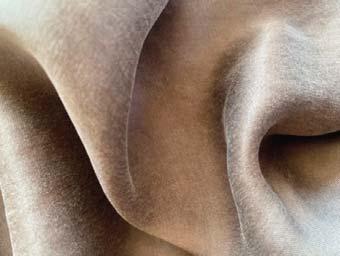

different characteristics of fibers synthetized in as many different ways and thus with inevitably various applications.
As per the group of synthetic polymers, the discovery of polyester in the first half of the 20th century – it was an American giant in chemicals that bought the rights from a group of English scientists – meant a real boom in the industry. Soon enough, it was clear that combining polyester with other fibers could make the difference – for example, polyester can enrich cotton with specific characteristics such as strength and mechanical ones such as waterproofness. Definitely, it needs to be ennobled by specific machineries, while processing costs shall remain competitive. Biancalani suggests not only the high-performing,
worth-discovering AQUARIA®, but also AIRO®24 with its AIRO® HAND effect.
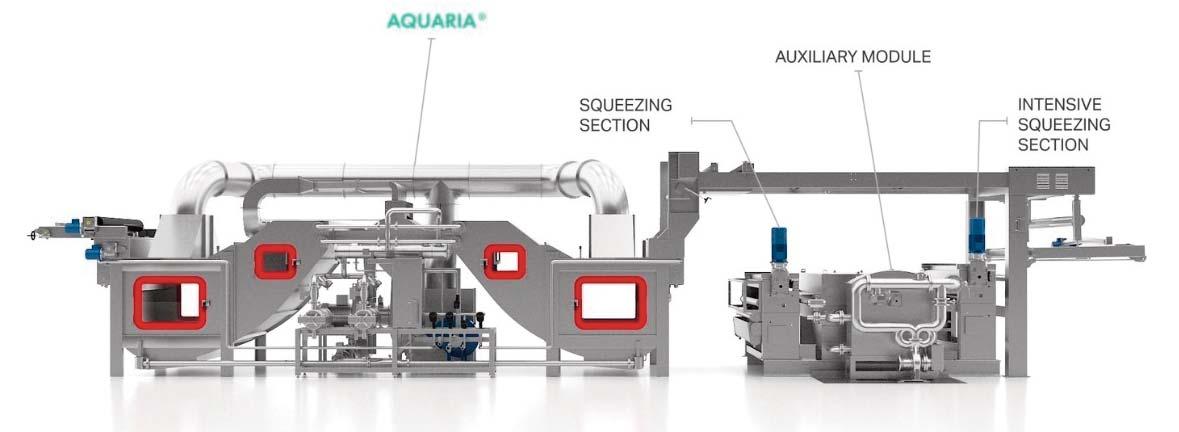
In fact, for some specific processes, textile machineries by Biancalani are unique because they feature continuous open-width processes. Concretely, and especially if compared to discontinuous, in rope processing, it means higher performances – i.e. producing large quantities at a fast pace – lower water consumption, lower risk of fabric flaws. And, above all, it means fine-tune the process with the fibers characteristics, thus being able to produce topperforming fabrics at competitive costs, like the ones employed by the automotive industry – but not only. The low risk of fabric flaws is a must in the fashion industry, as using specific processes makes it possible to transform any fiber in élite products, the outcome of a constant research of precious results. The same ongoing research Biancalani has always believed and invested in.
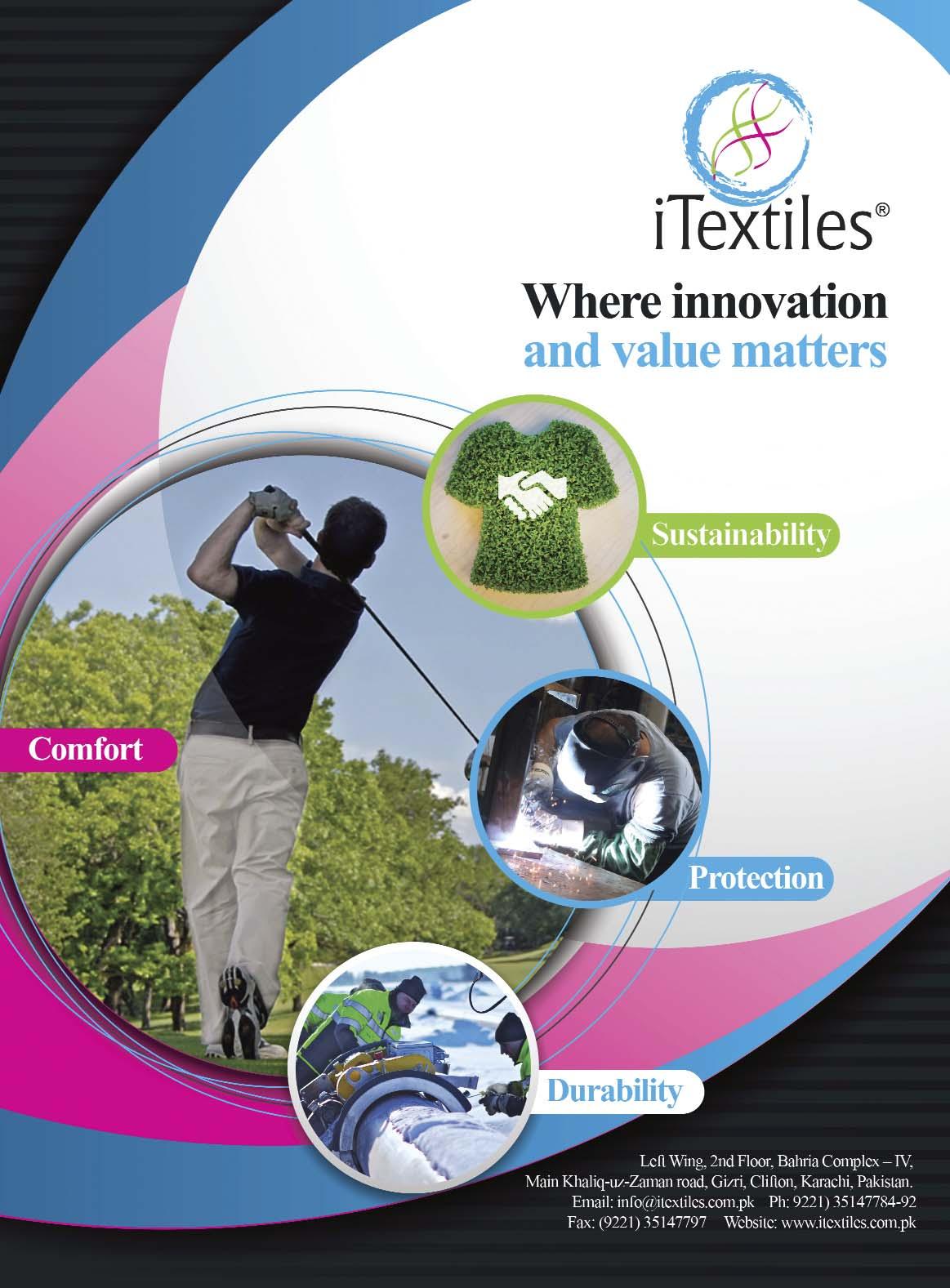
Trützschler has taken a bold step to tackle the global problem of textile waste: We expanded our portfolio to become the first full-liner in the preparation of textile waste – from mechanical recycling to the spinning preparation of torn secondary fibers. Tearing and spinning preparation are both key processes for achieving the best possible quality from secondary fibers. That means our customers can tap into a competitive advantage by embracing this holistic approach.
Our new complete TRUECYCLED solution is the result of our cooperation with the company Balkan Textile Machinery INC.CO. in Turkey, which we announced at the ITMA 2023 trade event in Milan. Since then, Trützschler has received many inquiries for recycling systems. More and more customers are now producing recycled yarns on a TRUECYCLED line: State-of-the-art recycling installations, configured and fine-tuned by Trützschler experts based on the customer’s specific requirements.
Recycling systems face significant technological challenges. On average, torn fibers are much shorter than virgin fibers. The percentage share of short fibers in the fiber mass is much higher. Unopened yarn and fabric particles are also difficult to process. Not surprisingly, much academic and practical research is currently conducted to find solutions for these problems. Dr. Georg Stegschuster, a

researcher specializing in textile recycling, believes a systems approach is needed. He is working at the Recycling atelier, a model factory for mechanical recycling in Augsburg, Germany, which is committed to delivering the latest technological insights for textile recycling. “A perfect fine-tuning between tearing and spinning preparation is key for obtaining the best possible quality results and avoiding unnecessary fiber shortening,” he says. “This can be achieved if you are in control of both processes – and have the necessary expertise for both processes too.”
In some cases, for example, it may be advantageous to have less aggressive settings in the tearing line. This can help avoid unnecessary fiber shortening. The remaining higher share of unopened fabric must then be handled in a highperformance spinning preparation line. This starts with the right blow room configuration for perfect opening, cleaning and blending. A card that is
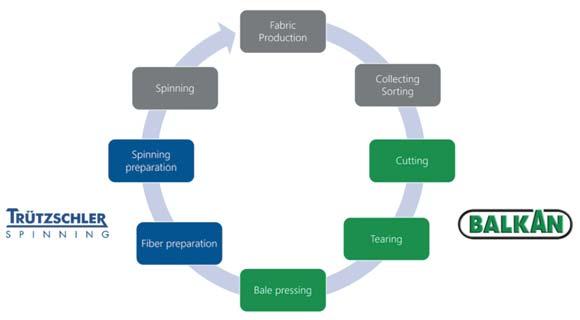
specially designed for recycling materials, such as the new TC 30Ri, can also enable gentle but effective treatment of fibers.
A shortened drafting process is also a must. The integrated draw frame IDF 3 can make this possible. The draft is high enough to provide excellent levelling of the numerous short fibers, but low enough to prevent floating fibers. “There is a lot of technological potential for improving the quality of the end-product through the right configurations and settings,” Stegschuster says. “There’s a growing number of examples that show how higher quality end-products can be achieved from recycled materials, and how the share of pre- or postconsumer waste in yarns can be increased without compromising on quality.” A new chapter in mechanical recycling is now beginning – and Trützschler’s TRUECYCLED system will play a leading role in this exciting story!
Trützschler now offers a complete system covering the whole process, from cutting and tearing textile waste through to carding and drawing secondary fibers. Thanks to this holistic approach and Trützschler’s expertise for the whole process, manufacturers can avoid unnecessary fiber shortening and achieve the best possible quality results.
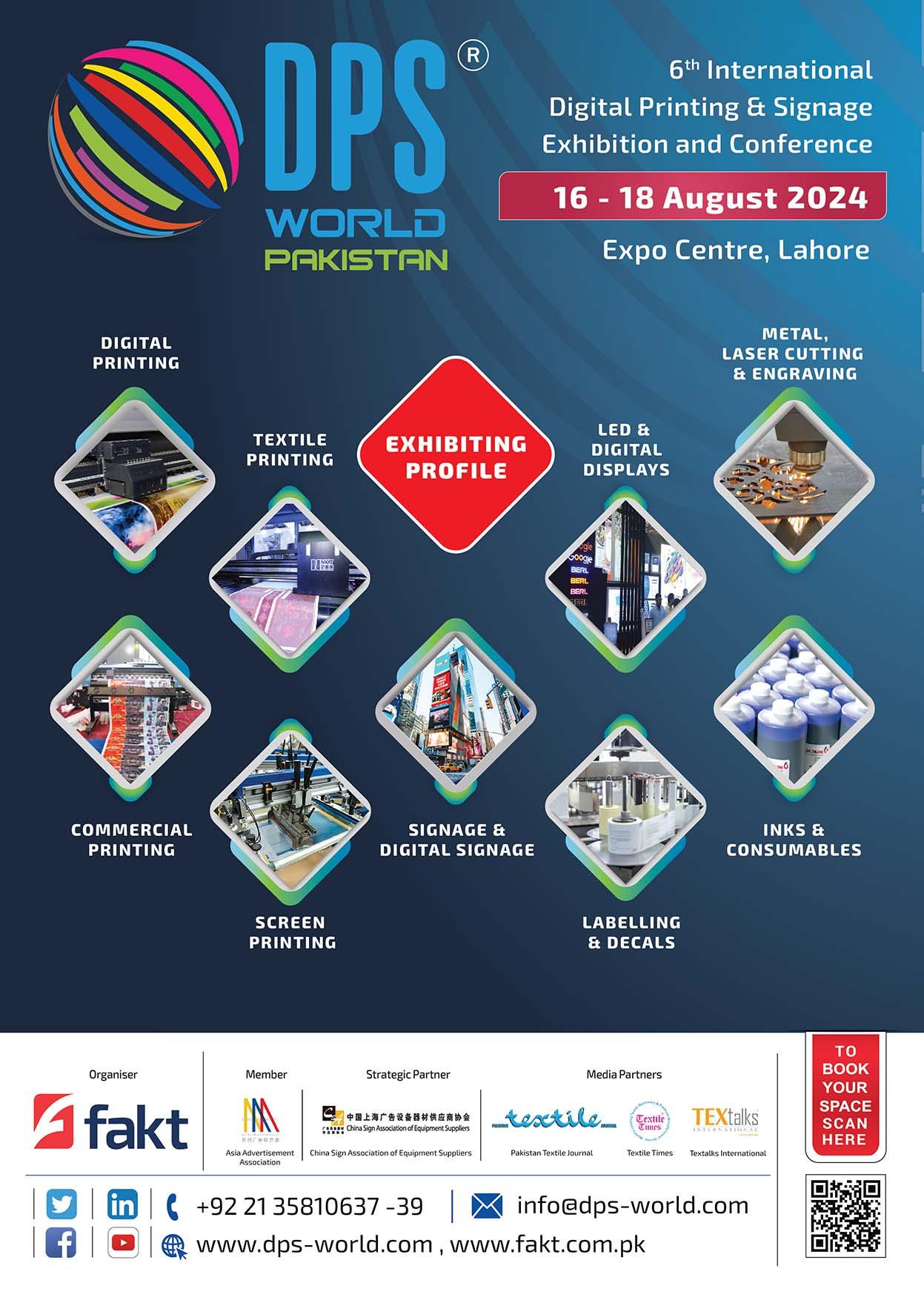
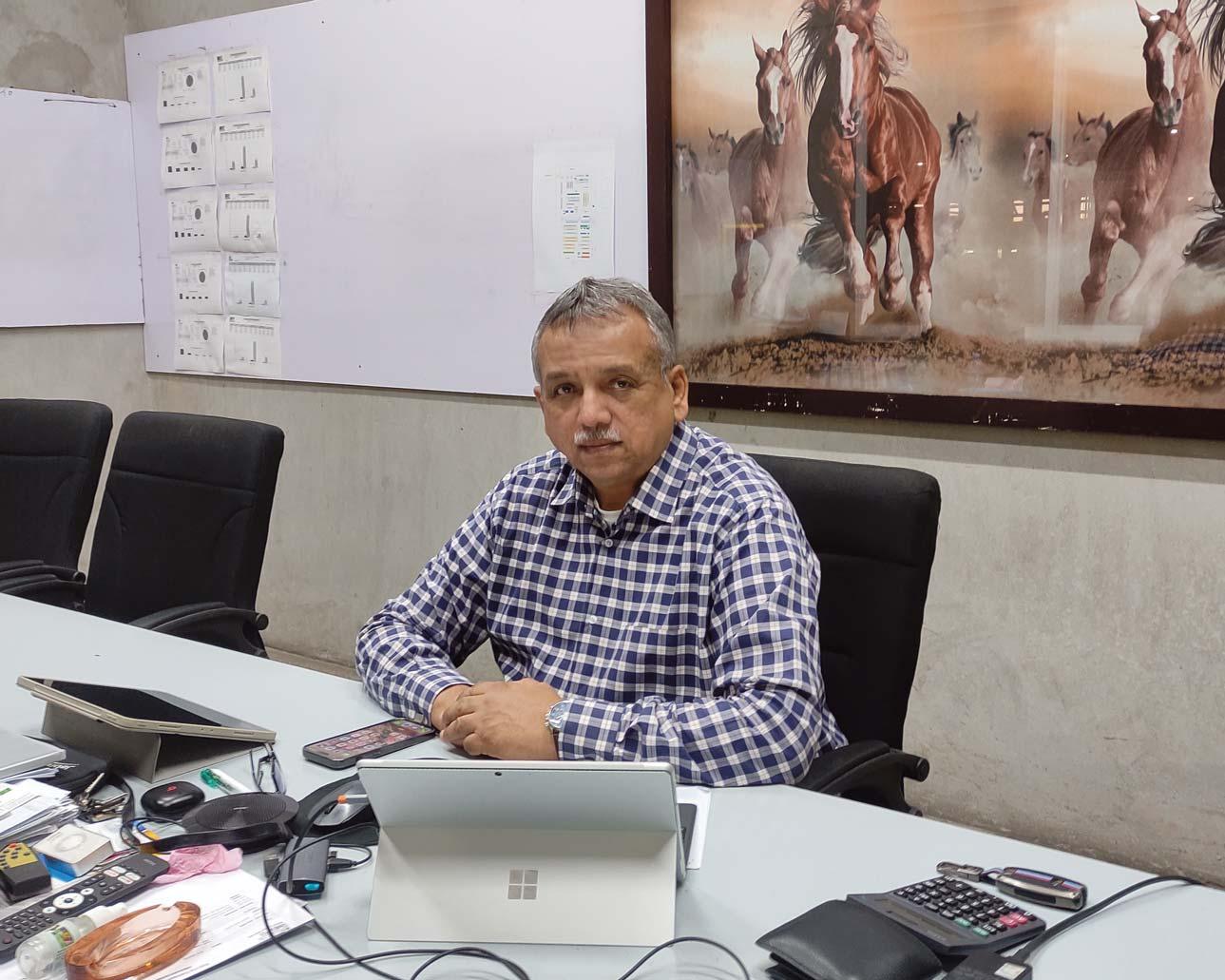
 Israr Hussain Zaidi, Director Operations at Beacon Impex
Israr Hussain Zaidi, Director Operations at Beacon Impex
Beacon Impex Private Limited, incorporated in 2005 is a leading Underwear / Bodywear producing company in Pakistan. They adapt conceptual ideas of customers into reality, shaping them into practicality through technical expertise, professional acumen, and innovative business solutions.
Beacon Impex operations comprise a state of the art infrastructure in the fields of Spinning, Knitting, Cutting, Elastic, and Garments Manufacturing. Equipped with the latest technology and most modern machinery, a qualified and experienced team of industry leaders, and E R P based operational and Quality systems, it stands as a reliable source for the customers.
Following is an insightful interview of Mr. Israr Zaidi, Director Operations, by Nadeem Mazhar, Managing Editor, Pakistan Textile Journal.
PTJ: Mr. Israr Zaidi thank you for joining us today. As the Director Operations of Beacon Impex, we are eager to learn more about your role in spearheading the sustainable pro-
duction and processing of high-end, seamless underwear and the company's remarkable growth in the industry. Could you provide us with some insights into Beacon Impex's journey?
IHZ: Thank you for having me. Beacon Impex has always been dedicated to research and sustainable production practices. Our commitment to quality, flexibility, speed, and competitiveness has driven our success throughout the years. We focus on maintaining superior quality from the initial step of handpicking premium Pakistani cotton, as well as cotton sourced from the USA, Brazil, and Turkey. Through strict quality control measures, we ensure that each product is 100% traceable and meets the highest standards.
PTJ: How has Beacon Impex managed to thrive in such a competitive industry?
IHZ: The dynamic leadership and management team at Beacon Impex, combined with our relentless drive to succeed, have been instrumental in our prosperity. We have positioned ourselves at the forefront of bodywear, loungewear, and nightwear manufacturing through years of development and
dedication. With a capacity to produce 6 million garments per month, state-of-the-art production facilities encompassing spinning. Beacon Impex has a unique edge in the industry.
Our skilled workforce ensures flawless service to customers while driving innovation and product development.
PTJ: How does Beacon Impex prioritize sustainability in its operations?
IHZ: Sustainability is a core value at Beacon Impex. We continuously invest in state-of-the-art automation techniques and have established one of the most modern and well-equipped facilities in Pakistan. By utilizing advanced technologies, we have optimized processing methods, resulting in cost-effective production processes. Additionally, we have embraced eco-friendly practices in cotton selection, fabric processing, and dyeing. Our continuous dyeing processes reduce water consumption by 37.7%, steam by 48.5%, and electricity by 39.5%. We have also achieved gold Leeds certification for our sustainable and highly efficient dyeing plant.
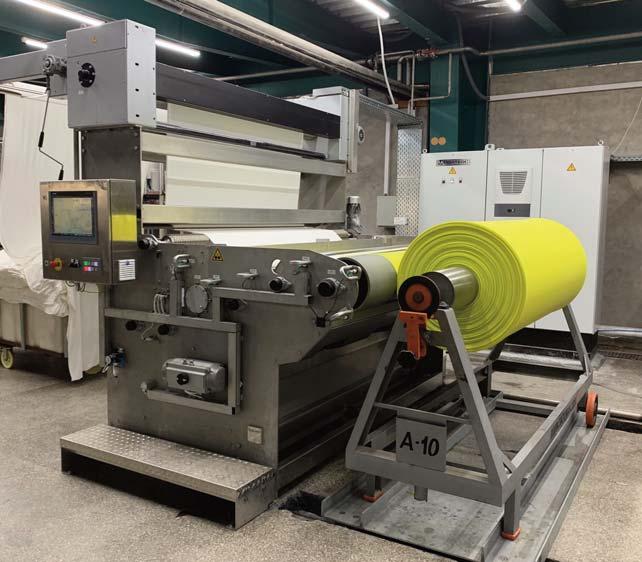
PTJ: It's great to see Beacon Impex's commitment to sustainability. How does the company ensure quality control throughout the production process?
IHZ: At Beacon Impex, quality control is a top priority. We adhere to stringent standards and protocols aligned with ISO certifications and client requirements. Our purpose-built on-site labs allow us to conduct rigorous fabric testing, including chromatism, washing, color fastness, and more. We have a fourpoint inspection system in place, utilizing the latest fabric
inspection machines to ensure consistent quality. Our in-house elastic division, with advanced technology and capacity to produce 5 million yards of elastic per month, further enhances quality control.
PTJ: Could you elaborate on Beacon Impex's focus on innovation and product development?
IHZ: Innovation and product development are woven into the fabric of Beacon Impex. With our dedicated team and stateof-the-art facilities, we invest in smart machines to achieve the highest standards. Our printing facility is equipped with cuttingedge rotary and digital printing capabilities, allowing us to


create high-quality designs. Moreover, we prioritize customer needs and aim to add value through the entire process, from selecting superior cotton to producing final products. ERP integration and RFID systems further enhance quality assurance and ensure timely execution and shipments.
PTJ: Lastly, what are Beacon Impex's future plans and aspirations?
IHZ: Our vision is to reach wider markets across the globe and expand our customer base. We will continue to prioritize sustainability, innovation, and customer satisfaction. By staying at the forefront of technology and maintaining our commitment to quality, Beacon Impex aims to be recognized not only as one of Pakistan's leading textile manufacturers but also as a global leader in sustainable and top-quality knit production.
Thank you, Mr. Zaidi, for sharing your valuable insights into Beacon Impex's journey and commitment to sustainable knit production. It has been a pleasure speaking with you, and we wish you continued success in your endeavors.
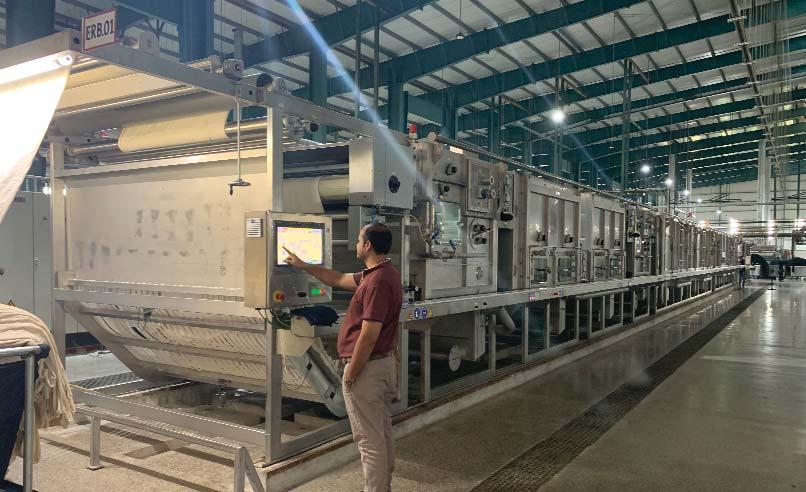




Erbatech GmbH, based in Erbach, Germany, develops, designs and manufactures high end solutions for wet finishing of knitted and woven fabrics. After 50 years in the business, Erbatech GmbH has become the market leader in solutions specially designed for knit dyers and finishers. Erbatech’s objective is to provide the textile industry with well proven machines for bleaching, CPB dyeing, washing and impregnation of delicate textiles, giving customers great results and productivity with the lowest electric, water, steam and chemical consumption. Erbatech is represented in Pakistan by Nazer & Co.
SCOUT (Open-Width)
Bleaching
The first step to continuous finishing is made at SCOUT pad-steam bleaching ranges, which are suitable for scouring any cellulosic fabric, producing a constant and homogeneous base product for later dyeing or printing.
Pad-steam bleaching achieves a high degree of white with less production costs compared to the traditional discontinuous over-flow technology, amongst many other advantages such as;
High reproducibility, Product homogenity (no tailing), Low fiber loss (no enzymatic bio-polishing), Shiny and improved fabric surface (no pilling), Low water, steam and power consumption.
SCOUT bleaching ranges are designed in modules and can be specially setup to meet requirements of any dye house or printer from 5 ton per day to 25 ton per day.
Washing
Using different combinations of compartments, SCOUT washing ranges can be set up for many different processes or capacities to satisfy your production needs by combining high
productivity and excellent washing results with low water, energy and chemical consumptions.
The main advantage and priority of Erbatech machines are their universal application from high sensitive elastic fabrics to heavy and sturdy technical fabrics. SCOUT washing ranges can be used for all main washing processes such as; Preparation (de-oiling) washing before heat setting, Washing after dyeing, Washing after rotary or digital printing.
Scout Color (Open-Width)
Our cold pad-batch (CPB) dye padder is of the latest technology and features an advanced control system with graphical process visualization. The unit is entirely made of stainless steel and thereby easy to clean.
Different configurations for knit and woven fabrics are available in working widths from 1.600 [mm] to 3.400 [mm].
Reactive cold pad-batch dyeing on the SCOUT COLOR has many advantages over traditional discontinuous dyeing; Fewer and cleaner effluents: No salts or silicates, High reproducibility and minimum re-work, High flexibility in batch size (from color samples up to 1.000 kg batches), Suitable for delicate fabrics, Shiny fabric surface without
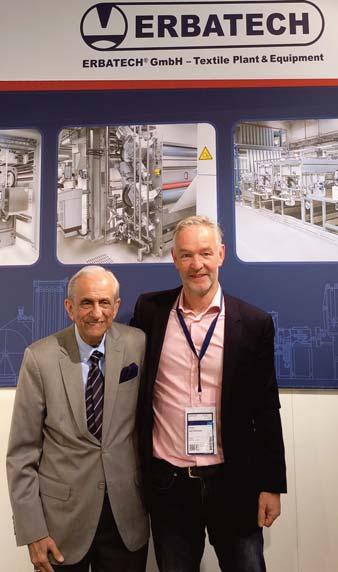
crease marks, and there is no need for enzymatic bio-polishing.
Erbatech machines and plants are built with core priorities in mind: Each is custom-made to fulfill specific requirements, ensuring tailored solutions for every need. Crafted entirely in Germany, using premium materials and accessories, they reflect our commitment to quality. Moreover, we prioritize environmental responsibility, striving to minimize water consumption, pollutant effluents, CO2 emissions, and the use of power and chemicals. Yet, beyond our products, we value partnership. By collaborating closely with our customers, we enhance fabric quality and refine finishing processes together.
Erbatech is represented in Pakistan by Nazer & Co.

Pakistan and Germany have enjoyed a strong and friendly relationship since establishing diplomatic ties in 1951. Their relations are built on shared values of democracy, human rights, cultural diversity, and economic liberalism. Over the years, both countries have fostered close cooperation in various sectors, including trade and development. In this report, we will explore the dynamics of Pakistan-Germany trade, highlighting the historical background, current trade volumes, key sectors, and the role of organizations like GIZ in promoting bilateral development initiatives.
background and diplomatic relations
Pakistan-Germany relations have consistently grown since their establishment. In 1959, the two nations signed the world's first bilateral investment treaty, signaling their commitment to fostering economic cooperation. West Germany, now the Federal Republic of Germany, became a member of the consortium providing development assistance to Pakistan in 1961. And later in 1962, the Pakistan- German Forum was established to facilitate dialogue and exchange between the two countries.
Today, Germany maintains a strong diplomatic presence in Pakistan with an embassy in Islamabad and consulates in Karachi, Lahore, Peshawar and Quetta.
German investments and business presence in Pakistan
Germany is the eighth-largest investor in Pakistan, with several German multinationals operating in the country. Approximately 35 German companies have a presence in Pakistan, primarily in Karachi and Lahore.
The majority of these companies are engaged in industries such as machinery, chemicals, pharmaceuticals, automotive, and related equipment and services. Notably, around 55% of multinational companies in Pakistan are from the pharmaceutical and chemical sectors. The services sector comprises 15% of companies, followed by transportation and textile machinery sectors with 5% each. The German government has committed substantial financial support for development projects in Pakistan, with approximately 3.5 billion euros pledged, a significant portion of which has already been disbursed.
The Deutsche Gesellschaft für Internationale Zusammenarbeit (GIZ) GmbH, working on behalf of the German Federal Ministry of Economic Cooperation and Development (BMZ), plays a vital role in supporting Pakistan's development initiatives. GIZ focuses on priority areas such as sustainable economic development, good governance, crisis
Table 1: Pak - German Trade Value: US$ Million
Year Exports Imports
1,301 949 +352 2020-21 1,512 1,148 +364
1,751 1,250 +501 2022-23 1,600 905 +695
Source: State Bank of Pakistan Annual Reports.
prevention and stabilization, and energy. The organization has been actively involved in technical and vocational education and training (TVET) reforms, promoting private sector-led and demand-driven training systems for improved employability prospects. GIZ also supports poverty alleviation efforts by improving access to needs-based social protection services.
Germany is Pakistan's largest trading partner within the European Union, accounting for a significant portion of Pakistan's exports to and imports from the EU. In the fiscal year 2022-23, bilateral trade between Pakistan and Germany amounted to US$ 2.5 billion, with Pakistan enjoying a trade surplus of US$ 695 million, Table 1. Germany has been a significant market for Pakistani textile products, particularly readymade garments, bedwear, cotton fabrics, and knitwear. The export of textiles and other related products from Pakistan to Germany has been steadily increasing.
On the other hand, Pakistan imports various goods from Germany, including chemical products, textile machinery, electrical goods, motor vehicles, and iron goods. German imports of textile machinery have been crucial for Pakistan's value-added textile sector, enabling manufacturers to improve product quality and reduce business costs. Pakistan's major imports from Germany also include machinery, electrical machinery and equipment, vehicles, mineral fuels, pharmaceutical products, plastics, optical instruments, organic chemicals, iron, and steel.
The Pakistan-Germany trade relationship holds significant prospects for further growth and cooperation. Both countries can explore new avenues of collaboration and diversify their trade beyond the existing sectors.
Germany's expertise in renewable energy, engineering, and high-tech industries can contribute greatly to Pakistan's goal of achieving sustainable development.
Furthermore, the collaborative projects and technology transfer in these areas can foster knowledge exchange, promote innovation, and drive long-term economic growth for both nations. Moreover, the establishment of joint ventures and partnerships between Pakistani and German companies can create new business opportunities and boost two-way investments. This not only strengthens economic ties but also promotes employment opportunities and skill development in Pakistan. By creating a favorable business environment and offering incentives, both countries can attract more German businesses to invest in Pakistan, further enhancing economic cooperation.
Additionally, the implementation of trade facilitation measures, including the simplification of customs procedures, harmonization of quality standards, and streamlining certification requirements, can remove non-tariff barriers and promote smoother trade flows. Strengthening transportation infrastructure and logistics will also contribute to improved trade facilitation and efficiency. Despite the positive outlook, there are challenges that need to be addressed to fully harness the potential of Pakistan-Germany trade. Non-tariff barriers continue to pose obstacles, including complex customs procedures, stringent quality standards, and certification requirements.
In this context, both countries need to engage in dialogues and negotiations to streamline trade processes and reduce the associated costs for businesses.
Furthermore, while Germany is a significant investor in Pakistan, there is room for further investment and diversification
Source:
Table 2: Export of textile and other products from Pakistan to Germany
of sectors. Encouraging more German companies to explore investment opportunities in sectors beyond machinery, chemicals, and pharmaceuticals would contribute to a more balanced trade relationship.
Another challenge lies in promoting awareness of business opportunities and potential collaborations. Efforts should be made to organize trade fairs, exhibitions, and business forums that bring together Pakistani and German companies, facilitating networking and partnership building. This would create a conducive environment for exploring new avenues of trade and investment.
Conclusion
As the partnership continues to evolve, it is essential for Pakistan and Germany to maintain open lines of communication, engage in regular dialogue, and foster a business-friendly environment. By leveraging each other's strengths and working together, Pakistan and Germany can forge a more robust and mutually beneficial trade relationship, bringing about shared prosperity for both nations..
References
1.German Textile Machinery Association (VDMA).
2.Pakistan Bureau of Statistics.
3.State Bank of Pakistan-Annual Reports.
4.Trade Development Authority of Pakistan.
5.Various press releases.
Bruckner, a reputable German family-run company, is celebrating its 75th anniversary this year. With a global presence, they have established themselves as a leader in producing various textile products, boasting over 6000 BRÜCKNER lines worldwide. Bruckner's product range is extensive, catering to manufacturers in diverse sectors such as industrial textiles, nonwovens, textile floor coverings, artificial turf, glass fabrics, and traditional apparel textiles.
"Bruckner is well known in the industry for providing custom-made solutions.” According to Mrs. Regina Bruckner, “we have a significant presence in apparels, classical textiles, and home textiles. Furthermore, our reach extends to another crucial sector—technical textiles, which involves a diverse array of machines and applications. At Bruckner, each customer receives a tailored solution according to their specific needs; we rarely offer standard machines as our focus has always been on customization to meet individual requirements. Our primary
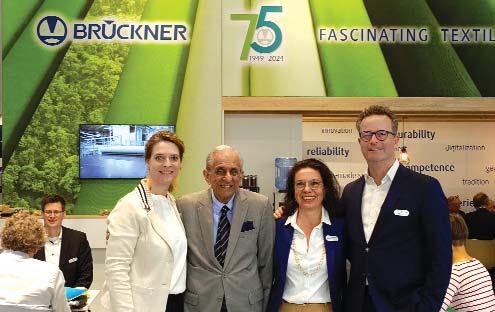
emphasis for many years, as she further elaborated, has centered on enhancing productivity and reducing energy consumption through innovative approaches and technology."

"She mentioned that Bruckner is happy to have a global customer base and ensures that machines provided align perfectly with their requirements. Besides offering top-notch machines, Bruckner also provides financing options and auxiliary services to cater to diverse needs.
As a German-based family-owned manufacturing company, she highlighted the pride they take in the classical business model, highlighting how this structure enables Bruckner to efficiently serve their customers worldwide. This is made possible due to strong partnerships like the enduring one with Nazar & Co in Pakistan, among others. Mrs. Bruckner further mentioned that with the advent of remote service capabilities, Bruckner can now offer online support to customers worldwide.
Additionally, according to Mrs. Bruckner, Bruckner delivers services such as technological advice to customers, ensuring they maximize the benefits of their offerings. In the pursuit of innovation, they are constantly delving into digital programs aimed at enhancing productivity and reducing energy consumption. Bruckner’s approach goes beyond just selling machines; it encompasses an entire factory setup and integration process. She emphasized that they are dedicated to providing a holistic solution that addresses all aspects of a customer's operation, setting their focus on a more comprehensive and all-encompassing strategy.
“BRÜCKNER ensures sustainable and efficient production.”
PTJ: Brückner has a long-term relationship with Pakistan. What are the strengths of the market and what is your key to success?
Pakistan has always been an important market for Brückner and has become even more important for us in recent years. One of the reasons for our success in Pakistan is certainly our local
representative Nazer & Co. We have been working together successfully for many years and Nazer has very well trained technical service personnel. This means that we can always react quickly and flexibly on site. Both Nazer and Brückner are family-run companies. In my view, this is an important aspect of building a long lasting relationship of trust – also with our customers. In
Pakistan, many of our customers have recognized that they can work much more productively and successfully with our energy-efficient machines and the new digital assistance systems. The high degree of automation of our lines gives customers operational reliability, they produce even higher quality fabric, remain competitive and reduce their operating costs in the long term.
PTJ: Can you give us a brief overview of your product portfolio?
We have been active since the very beginning in many different areas of the textile finishing industry. On the one hand, we offer stenter frames, relaxation dryers, continuous dyeing ranges and shrinking ranges for the textile apparel industry. On the other hand, we deliver coating and laminating lines for technical textiles, thermofusion ovens for the nonwovens industry as well as drying and finishing lines for the carpet industry. This enables us to support our customers in all areas of functionalization, coating, lamination, bonding or heat-setting. Another important step was the development of our own, fully integrated product portfolio for heat recovery and exhaust air purification as well as solutions for the CO2-neutral provision of process heat for our dryers.e.
PTJ: Brückner is celebrating its 75th anniversary this year. What were the most important milestones in the company's history?
After 75 years, we can certainly look back on many milestones. There was the founding of the production site in Bavaria in 1960 and the construction of a completely new production facility at the same location in 2018. After the death of the company founder, Regina Brückner took over the management of the company together with her husband Axel Pieper in 1999. In 2013, our technology center in Leonberg was inaugurated, where we have since conducted many product trials and developed new products together with customers. Another milestone is the recent introduction of digital solutions and intelligent drive systems for our machines and lines.
PTJ: What are these digital solutions and how do your customers benefit from it?
Our modern lines are equipped with intelligent assistance systems that provide the machine operator with the best possible support. One tool, for example, monitors the condition of critical machine elements in the background and provides timely information on upcoming maintenance work. Another system documents the productivity of the system
and the energy consumed per batch, day, month or year. Unproductive downtimes are analyzed and eliminated. We also offer our customers an intelligent process simulation tool. This is a calculation program for finishing processes in the textile industry. For the first time worldwide, customers can use it to digitally simulate textile drying or heatsetting processes and calculate consumption data (e.g. electrical and thermal energy) and costs in advance. Existing processes can also be optimized with this tool.s.
PTJ: What makes Brückner well suited to serve the present and future needs of the textile industry?
We at Brückner have always been focusing on energy-efficiency. Now we provide additionally new heating systems that combine known resources like gas/steam/oil with electrical heating or offer machines completely with electric heating for customers who have already access electric energy. The base for all this is our understanding: we believe in longlasting and reliable machines and therefore we offer spare parts and modernizations and upgrades for existing machines. With only little investment our customers can be more efficient for a very long time. In addition, we identify strongly with the motto “made in Germany”. It has always been important to us not only to build the best machines
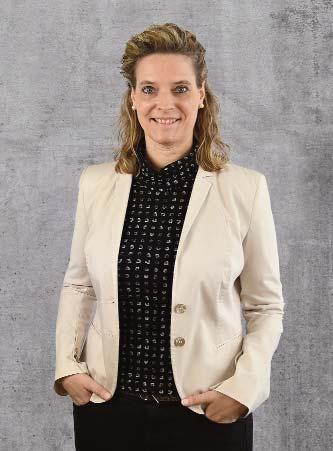
but also to provide technological support in textile finishing and textile chemistry, financing and other services. This is exactly what customers benefit from when they buy our products. They may have to invest a little more initially, but in the long term the costs for energy, maintenance and production are significantly lower and the quality of the goods produced is better.
We are very proud and happy to have so many customers all over the Pakistan country who became really good friends over the past years. This excellent relationship forms the base for being successful and helps both sides to be competitive also in the future.
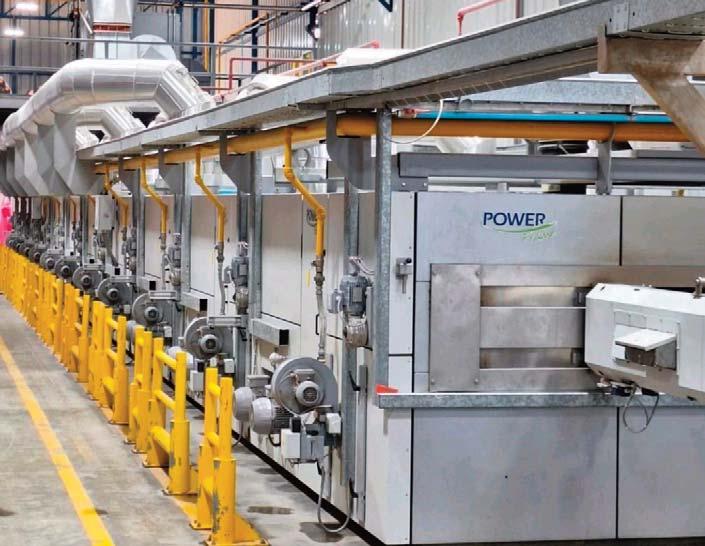
Eva Baumann takes over the position of CEO in our company. Together with Prof. Dr. Klaus Müller, who acts as CFO, she forms the management of the internationally active CHT Group.
Until 2020, Eva Baumann had worked extremely successfully for many years in a leading global company in the chemical industry. She has been part of the CHT Group since January 2020 and, as Group Vice President, has headed the Business Field General Industries at Group level. As CEO, Eva Baumann is now responsible for Marketing, Sales, Corporate Strategy, Human Resources and Sustainability.
Johan de Ruiter, Chairman of the Foundation, is confident: " With Eva Baumann, we have appointed a CEO for the CHT Group who has known the company for several years. Her many years of experience in managing an international business field and her diverse activities in the chemical industry make her the ideal candidate. In these challenging times, we are confident that Eva Baumann as CEO will ensure and further expand the long-term success of the CHT Group."
Eva Baumann has ambitious plans for the future of the CHT Group: “We are facing challenging but promising times of change. As a foundation-owned company, we have a strong backing. Nevertheless, we bear an immense responsibility for the continued existence of the company and for our employees all over the world. As a player in the chemical industry, we are also particularly committed to preserving our planet. Having been part of the CHT Group for many years, I know the character of the company and the people who make it up very well.”
Eva Baumann adds: "Together with my management team, I will continue to expand the CHT Group as a successful and profitable specialty chemicals group. We focus on what we have been
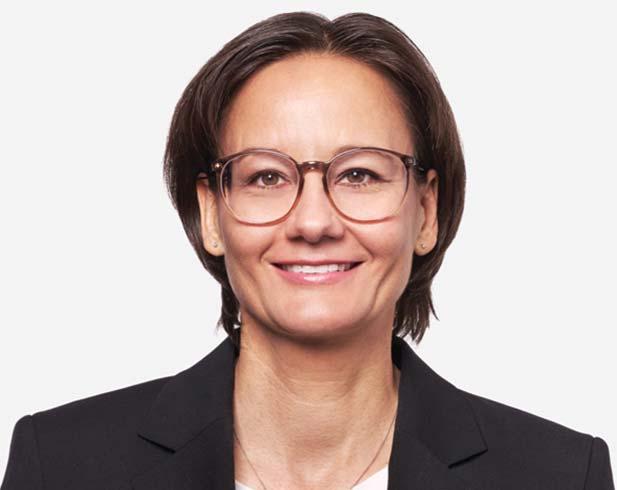
particularly good at for over 70 years: turning innovative ideas into specialty applications. These ideas help our customers to secure their success and at the same time make a sustainable contribution to development. Our customer proximity and the outstanding quality of our products and services set us apart in the market."
The CHT Group pursues important corporate principles: value-based corporate management, a high level of innovation and continuous commitment to sustainability.
The CHT Group, a medium-sized global player for speciality chemistry, is worldwide active in development, production and sales. CHT Germany GmbH in Tübingen is the headquarters of the group of companies which focuses on sustainable chemical products and process solutions. TEXTILE SOLUTIONS of CHT improve the quality, functionality
as well as look and purity of textiles and optimise their manufacturing processes. In the fields of silicones, building materials, paints, coatings, paper, agrochemicals as well as cleaning and care products innovative products and process solutions are provided by INDUSTRY SOLUTIONS. By bundling the strengths of the complete group further innovative products, applications or processes are permanently developed and vast technical support is offered within the SCIENCE & SERVICE SOLUTIONS. Highly qualified specialists work in stateof-the art laboratories for development, analytics and application technique in order to work out ideas and solutions that meet the latest requirements.
The CHT Group with its own production and sales locations is represented by more than 26 companies worldwide. In the financial year 2023, the CHT Group generated a group turnover of 604 million Euro with around 2,400 employees.
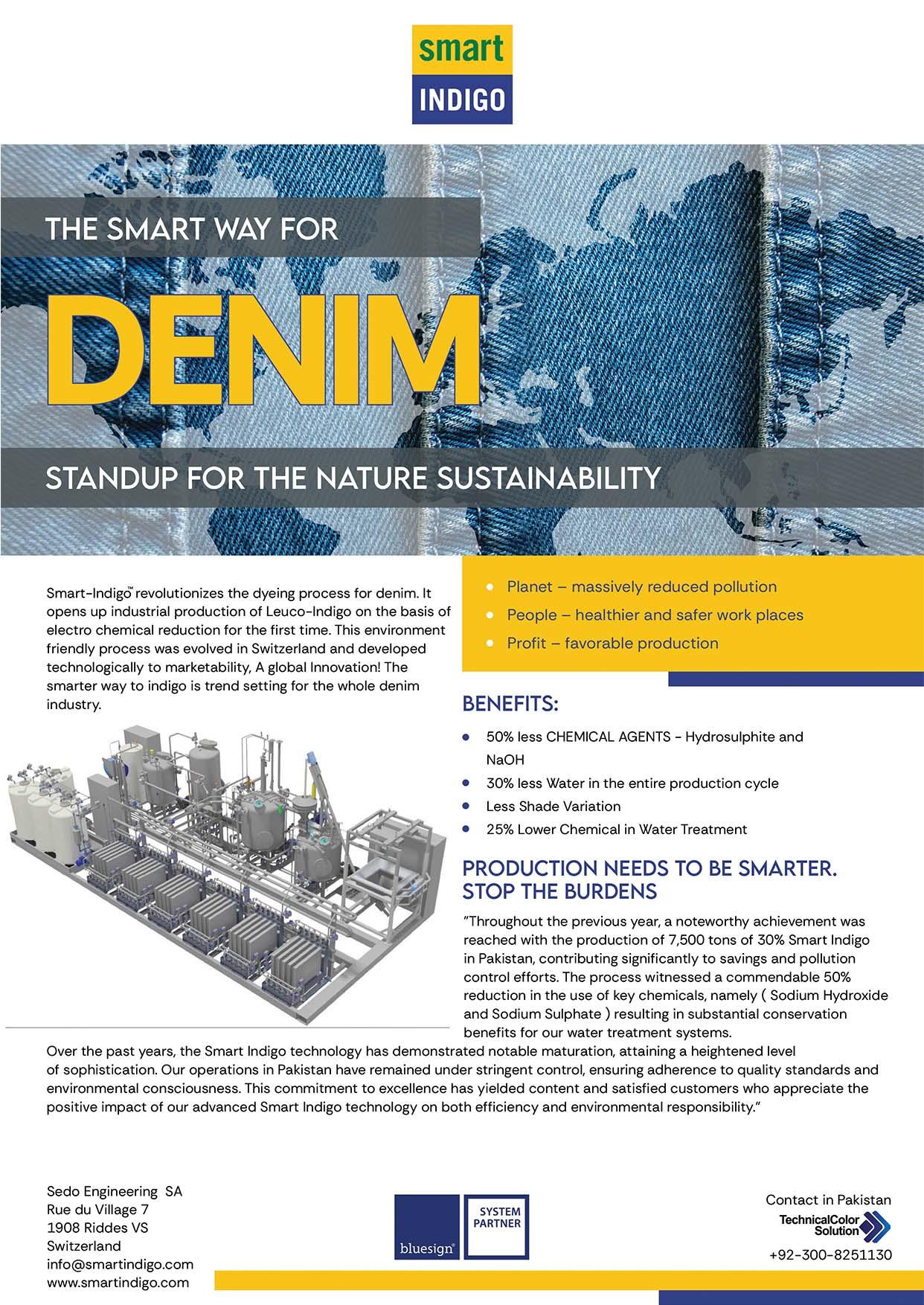
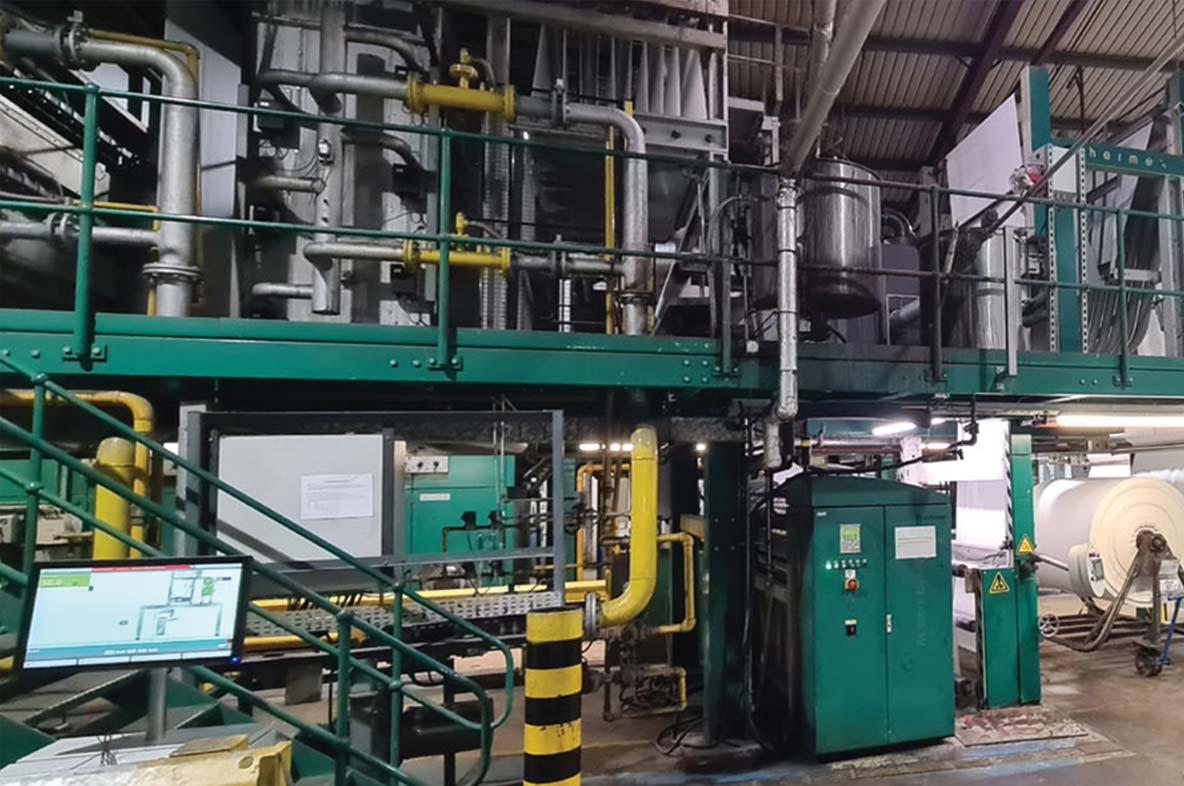
As a specialist in dyeing, printing and finishing very well known for its advanced camouflage ranges for the military, long-standing Monforts customer Pincroft is now benefiting from a complete modernisation of the Thermex continuous dyeing, condensing and thermosoling range at its Adlington dyehouse in Lancashire, UK.
First installed in 2007, the line has been upgraded to match the performance of the very latest Monforts Thermex lines that are equipped with advanced automation features providing machine operators with full control over the entire system.
The modernisation project included new control cabinets, gear motors for the fabric transport drives and PC, PLC control, touch panels and frequency inverters.
The new control cabinets were supplied fully pre-assembled from the
Monforts HQ in Mönchengladbach, Germany, for direct connection to the line.
In addition, Pincroft has installed a new combined heat and power (CHP) plant at the site and is now able to produce 67% of its own electricity and recover heat for use across its textile operations.
With over 130 years of accumulated know-how in the bleaching, dyeing, printing and finishing of fabrics, Pincroft has an annual production capacity of 50 million metres.
Its meticulous pre-treatment processes, including brushing, singeing, desizing, scouring, bleaching, and mercerising, ensure that fabrics are primed for dyeing and printing, enhancing their quality and performance.
Drawing on a vast knowledge in commission textile dyeing, eco-friendly

dyeing methods and advanced lines ensure precise and consistent colour shades meeting the most challenging fabric requirements and as a specialist in bespoke commission printing, services span everything from camouflage printing for global military forces to designs for home and workwear.
Mechanical and chemical finishing services can further transform textiles and enhance their inherent properties and the company is Europe’s leader in flame retardant fabric treatments, with its Proban® treated textiles ensuring ultimate protection with outstanding comfort, appearance and durability.
After joining forces with Carrington Textiles in 1998, the company has been an integral part of one of the largest suppliers of workwear, flame retardant, waterproof, defence and sustainable fabrics to some of the biggest companies and organisations in the world.
Since then, export business has significantly expanded to over 80 countries and the two companies enjoy a particularly strong position in the supply of camouflage and uniform materials to armed forces around the world, including the UK and Dutch Ministries of Defence, as well as the Finnish and Estonian armies.
The upgraded Thermex system at Pincroft’s Adlington plant now achieves unrivalled reliability even at maximum fabric speeds, for exceptional cost-effectiveness when dyeing both large and small batches of woven fabrics.
“Our machines are built to last and known for their robustness and long service life,” says Monforts Area Sales Manager and Head of Spare Parts and Retrofits Achim Gesser. “Textile companies making major capital investments in new manufacturing lines rely on durability from the company’s production ranges, and it’s for this reason that there are currently an estimated 2,000 Monforts machines in operation worldwide – some of which were first installed over 30 years ago.
“This doesn’t mean, however, that they can’t benefit from many of the advances in performance and automation we have subsequently made.
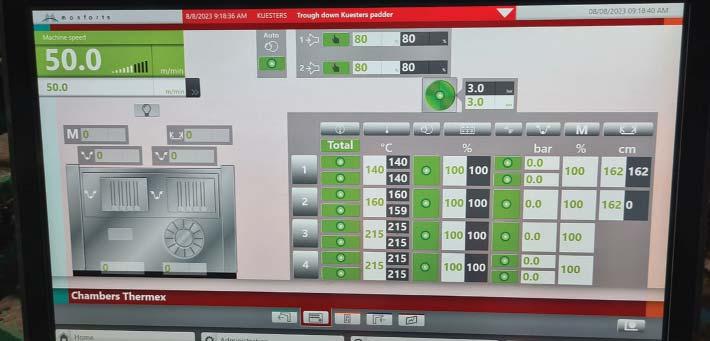
The retrofitting of specific modules with new control and drive technology – going far beyond the basic replacement of spare
parts – can have a significant impact on the performance of an existing line and especially maximising energy savings.”

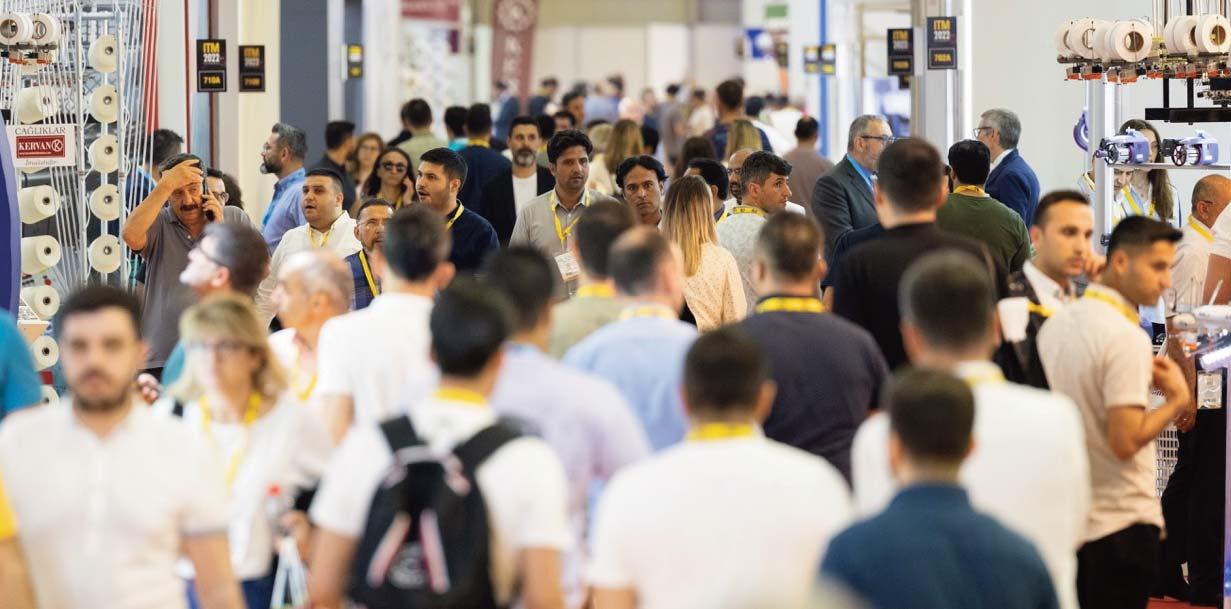
ITM 2024 International Textile Machinery Exhibition, which will be organized in collaboration with Tüyap Tüm Fuarcılık Yapım A.Ş. and Teknik Fuarcılık A.Ş. and in partnership with Textile Machinery and Accessories Industrialists Association (TEMSAD), will open its doors to its visitors at Tüyap Fair and Congress Center between 4-8 June 2024. ITM 2024 Exhibition, which will turn into a platform full of state-of-the-art machinery, digital design trends and sustainable production solutions; will give exhibitors the opportunity to discover the most up-to-date and effective applications in the sector.
Trade Delegation Support from The Ministry of Trade to ITM 2024
Republic of Turkey Ministry of Commerce announced the year of 2024 ‘Trade Delegation Supports List’. ITM 2024 International Textile Machinery Exhibition and HIGHTEX 2024 International Technical Textiles and Nonwoven Exhibition were included in the list.
ITM 2024 Exhibition, which will be held in partnership with Tüyap Tüm
Fuarcılık Yapım A.Ş. and Teknik Fairs Inc. and in cooperation with Textile Machinery and Accessories Industrialists Association (TEMSAD), will open its doors to its visitors between 4-8 June 2024 at Tüyap Fair and Congress Center. ITM 2024 Exhibition, one of the world's most important organisation in its field; will host textile technology leaders in Istanbul for 5 days. Global sector investors and professional visitors will flock to ITM 2024 Exhibition to see the latest technologies closely.
ITM 2024 Exhibition and HIGHTEX
2024 International Technical Textiles and Nonwovens Exhibition, which will be organised on an area of 120.000 m2 and in a total of 13 halls, have taken their place in the ‘Trade Delegation Supports List’ of the Ministry of Trade of the Republic of Turkey.
In this context, ITM and HIGHTEX 2024 Exhibitions will host trade delegations from many countries including Bangladesh, Algeria, Indonesia, Ethiopia, Morocco, India, Malaysia, Mexico, Egypt, Uzbekistan, Pakistan, Peru, Poland, Serbia, Tunisia, Turkmenistan, Venezuela and Vietnam. Trade delegations from these countries
will be able to meet with manufacturers in all areas of the textile industry from weaving to knitting, fibre to yarn, denim to technical textiles, dyeing to printing and finishing.
Trade Delegations will be able to apply to Turkish Consulates and Commercial Attaché Offices
Turkish Consulates and Commercial Attaché Offices are assisting trade delegations with visa applications. Companies those want to take their place among the trade delegations coming to the ITM 2024 Exhibition will be able to apply to the Turkish Consulates and Commercial Attaché Offices in their countries.
Sustainable, Leading in Digitalisation and Innovative Textile Technologies at ITM 2024
ITM 2024 Exhibition will host the latest innovations in textile machineries, technologies, artificial intelligence supported machines, software and design marvel devices. Visitors who visit the ITM 2024 Exhibition, where innovations from every field of textile from weaving to

knitting, from yarn to digital printing, from finishing to denim will discover innovative, environmentally friendly and pioneering technologies in digitalization for a sustainable future.
New Manufacturing Techniques such as Artificial Intelligence and Automation will be in the Spotlight at ITM 2024
023 was a year in which sustainability, digitalization and innovation were highlighted. The use of recyclable materials, adoption of water-saving technologies and efforts to reduce carbon footprint heralded groundbreaking developments in the industry. Sustainability, digitalization, artificial intelligence and automation will continue to play a key role for the textile industry in 2024. Machines that are designed to increase production efficiency and reduce costs, new production techniques such as digitalization, artificial intelligence and automation will be one of the focus points of ITM 2024. Machinery and equipment designed to reduce environmental impact and made from sustainable materials will be featured at ITM 2024. Topics such as the use of recyclable materials, energy efficiency, waste reduction solutions, smart weaving machinery and production monitoring systems will also be presented at ITM 2024.
ITM 2024 Exhibition will bring together hundreds of products under one roof such as; weaving preparation, tufting, carpet weaving, cord and rope, narrow weaving, weft and warp knitting preparation machinery, flat and circular knitting, hosiery, embroidery, quilting, cotton and fiber preparation, yarn preparation, winding, twisting, texturing, dyeing and finishing, washing, bleaching, drying, folding, rolling, digital textile printing machinery as well as textile printing dyes and chemicals, nonwoven technologies, auxiliary machinery and accessories. Leading manufacturers of textile technologies will present their faster, more efficient and more flexible solutions equipped with automation and digitalization features.
Company owners, managers, employees and sector representatives visiting the exhibition, will have the opportunity to see the latest technological innovations for the first

time and touch the firsts. Sector representatives, who will open up brand new horizons in their minds about textile technologies, will transform the extraordinary and original ideas they get at ITM 2024 into design and create brand new products. Company owners who will be able to get information from experts about the technologies they will use in their factories will develop their products and direct their investments.
Hundreds of exhibitors from Turkey and abroad are counting the days to introduce their latest technologies for the first time at ITM 2O24 Exhibition. Leading textile machinery manufacturers, global industry investors and professional visitors are planning to come to ITM 2024 Exhibition to see the latest technologies closely. Trade delegations from dozens of countries are requesting to come to the ITM 2024, which is included in the list of 'Domestic Fairs Covered by the Ministry of Trade of the Republic of Turkey. Bangladesh, India, Pakistan, Indonesia, Malaysia, Vietnam, Iran, Egypt, Algeria, Morocco, Morocco, Tunisia, Uzbekistan, Turkmenistan, Serbia, Poland, Cameroon, Ethiopia, Tanzania, Mexico, Peru, Venezuela are among the countries that have requested a procurement delegation. Turkish Consulates and Commercial Attaché Offices are supporting trade delegations with visa applications. If you want to take your place among the trade delegations
coming to ITM 2024 Exhibition, you can apply to the Turkish Consulates and Commercial Attaché Offices in your country.
Get Your Online Invitation Before It's Too Late!
Thousands of visitors from all over the world, eager to come to ITM 2024 Exhibition, where textile technology leaders will exhibit their latest technologies, are making intensive applications to Turkish Consulates and Commercial Attaché Offices in their countries. Thousands of visitors from Europe, Central Asia and Arab countries, especially Turkic Republics, will visit ITM 2024 to be informed about the latest trends in textile machinery. The visa agreement between Turkey and many countries such as India, Pakistan, Bangladesh, Indonesia, Vietnam, Egypt, Algeria, Tunisia, Morocco, Iran, Uzbekistan and Turkmenistan will be effective in increasing the number of visitors. We have an online invitation system that allows our visitors who do not want to miss this great meeting to easily enter the ITM 2024 Exhibition. Our visitors can register online by clicking on the e-invitation link at www.itmexhibition.com. After filling out the visitor information form, their einvitation is sent to them by e-mail. With this e-invitation, they can get their badge at the entrance of the fairground and enter the ITM 2024 Exhibition without waiting in line. Those who register early for the online invitation system can also benefit from our advantageous prices.

The Italian Trade Agency (ITA) decided to participate in the ITM 2024 Exhibition this year with the Italian pavilion. Italian textile machinery manufacturers, which are leaders in the global textile industry, will mark on the ITM 2024 with their innovative technologies focusing on energy consumption, efficiency, sustainability and digital transformation.
ITM 2024 International Textile Machinery Exhibition is preparing to host textile technology leaders in Istanbul on June 4-8, 2024. ITM 2024, which will be organized this year with the motto 'Discover the Future', will offer unmissable opportunities for those who want to discover the latest innovations in the sector, establish new business contacts and shape the textile world of the future together. The products to be exhibited at ITM 2024 Exhibition, which will bring together nearly 1300 domestic and foreign companies, will meet with thousands of qualified buyers and professional visitors.
International sector associations, representatives and government
institutions also support the ITM 2024, which is expected to break new records with both the number of participants and visitors and million-euro machine sales. One of them is; The Italian Trade Agency (ITA) is the governmental agency that supports the business development of Italian companies abroad and encourages the attraction of foreign investments to the country. ITA has decided to participate in the ITM 2024, which will be held at Tüyap Fair and Congress Center, as a pavilion.
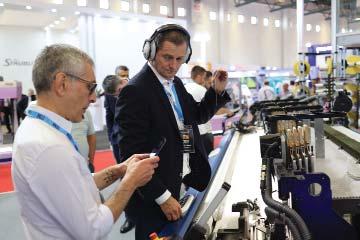
'Made in Italy' technology and interact directly with global customers.
Turkey is among the most important markets of Italian textile machinery manufacturers. Turkey became the largest foreign market in 2022, leaving China behind in Italian textile machinery exports. Italy's textile machinery exports to Turkey increased by 15%, reaching 309 million euros.
With this decision, ITA took as part of the strategy aiming to further strengthen its presence in the sector and in Turkey; It also revealed the unity of the Italian textile machinery industry and the support it gives to the Turkish market. Companies that will take their place in the Italian Pavilion; They will have the chance to showcase the versatility of
“We are happy to host Italian Textile Machinery Manufacturers in the Pavilion”
The organizers of ITM Exhibition, Tüyap Tüm Fuarcılık Yapım A.Ş. and Teknik Fairs Inc., made a joint statement about this important development and expressed their excitement. The following statements were made in the explaining: "We are satisfied to welcome the Italian textile machinery manufacturers who will participate in ITM 2024 as a pavilion. This pavilion will offer visitors the opportunity to closely follow the latest developments of Italian textile machinery manufacturers and discover these innovative technologies."


Unique technology for creating advanced technical textiles with exquisite characteristics will be featured at the upcoming ITM in Turkey. Heberlein, the leading supplier of air interlacing and air texturing jets, plans to amaze visitors to the event with critical components – such as the latest PolyJetTG-3 – that can influence both yarn properties and processes.
Advances in high-performance yarns have produced versatile alternatives to traditional raw materials in a number of industries and applications. Customized filament yarns now meet specific needs in diverse sectors, such as automotive, aviation, maritime, medical, and construction. And the Swiss-made key components from Heberlein are at the forefront of these developments, bringing optimum new technology to the core of filament yarn innovation.
PolyJet-TG-3 – new generation of spinning jet
For producers of demanding technical yarns, magnification of the yarn evenness with a PolyJet-TG-3-HP405A/WO70 (TopAir) looks stunning. The new generation of jets impresses with an unmatched even and uniform interlacing density as well as with strong, reliable knots for high tenacity yarn (HT and HMLS). Heberlein’s latest PolyJet-TG-3 achieves more than 12 knots per meter with 1100f98dtex and 1670f98dtex. Yarn parameters of tensile strength, elongation, and elasticity show smaller variations, for ultimate quality benefits, as well as improved unwinding behaviour of the bobbins.
Typical Heberlein benefits come with all these components. High-performance air interlacing jets for technical yarns offer a unique quick-release system, so jet
packs can be exchanged within seconds, with just a single 180° turn. They also feature a compact, space-saving design and a roll bar to protect the ceramic surfaces.
TexJet-ATY – exploit the full market potential of ATY
TexJet-ATY is the innovative air-jet providing options for a wide variety of yarns and optimization possibilities for ATY production. The latest series meets the needs of virtually every ATY producer: the air-jet’s unrivalled compact design can produce an impressive range of volumes, covering capacities, overfeeds, texturing and compactness – and is also applicable for PP yarns. Polypropylene yarns, used for instance for carpet backing, can be processed in application ranges from 150 dtex up to 3,000 dtex with maximum 30% overfeed. It delivers a higher output of first-grade yarn. In the production of very fine to coarse textured yarns made
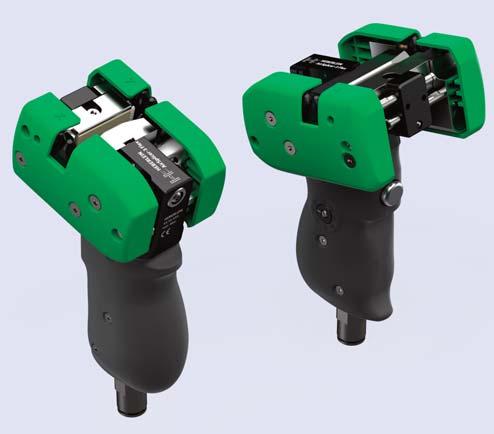
of polyester, polyamide, and polypropylene, improvements are visible to the naked eye. Yarns are regularly formed with evenly-distributed loops.
AirSplicer-3 Flex for high-strength technical fibers
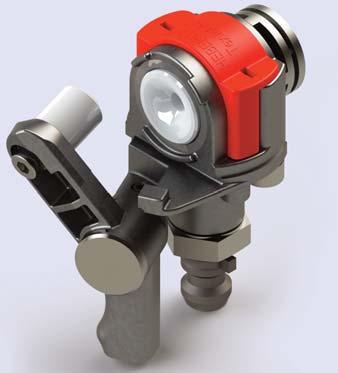

Yarn splicers produce a tear-resistant, homogeneous splice of material without knots. All they need is compressed air. Heberlein's AirSplicers produce first-class splices for a wide range of applications for technical fibers where extreme strength characteristics are needed.
Synthetic multifilament yarns, aramid, carbon, or glass can all be spliced with AirSplicer-3 Flex. The range covers from 500dtex up to 30,000dtex depending on the material. This flexibility results from its innovative width-adjustable design and is ideal for technical and textile multifilament yarns. In one single device, the new splicer replaces two former units, namely AirSplicer 40-2 and 70-2.
Heberlein looks forward to meeting visitors at ITM 2024 in Istanbul in hall 7 at booth 708A, where any questions about jets and splicers are welcome. Heberlein experts will be especially keen to explain the benefits of the unmatched yarn evenness achieved by the new generation of spinning jets.

Itema, the leading global provider of advanced weaving solutions including weaving machines, spare parts and integrated services, will exhibit at ITM 2024 at the Istanbul TÜYAP Fair Convention and Congress Center on June 4-8 in Hall 8, Booth 806 its latest weaving innovations and the full set of digital functionalities and smart solutions offered by the HelloItema Customer Portal.
Itema established in 2022 its own company in Türkiye, with the aim of maximizing benefits for Turkish customers. With offices in Istanbul and in Bursa, Itema Türkiye provides Itema customers with timely, accurate and beneficial services.
In the words of Pamir Özaltan, Itema Türkiye Managing Director “Türkiye is, since ever, one of the three main markets for Itema. We hold leadership in numerous market segments and in different textile areas of the country. At ITM 2024 we will bring on show some interesting innovations for important textile productions, such as terry, curtains, and apparel fabrics.”
Itema, in fact, will take advantage of the ITM stage to exhibits some of the latest weaving innovations introduced at ITMA in June 2023 in Milan and that, almost one year after market launch, received appreciation and warm welcome by worldwide weavers. Particularly, ITM visitors will have the chance to see running live at the Itema booth: the new R9500EVOterry. The Itema terry machines, thanks to their excellent textile versatility and machine reliability, are preferred by worldwide terry weavers, with an impressive number of machines installed in more than 35 countries, and the absolute market leaders in the weaving of terry fabrics in the Denizli district in Türkiye. In the EVO version, the Itema R9500EVOterry further improves textile mastery, performances, and ease of use;
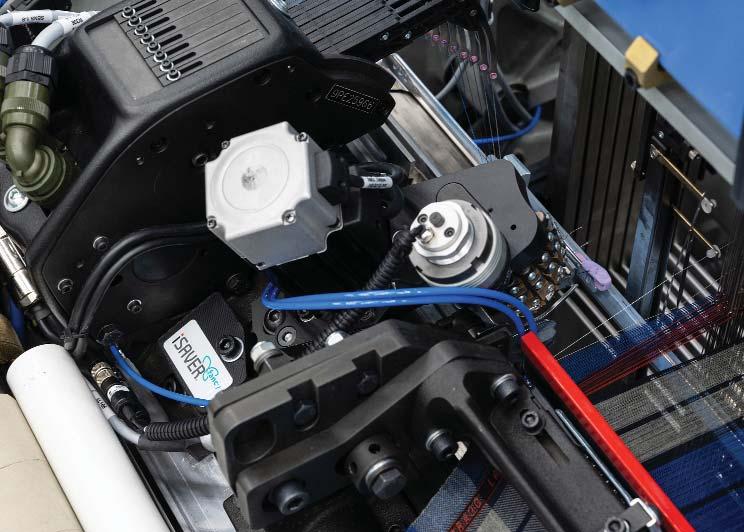
the new R9500EVO, on show both in wide and narrow width to highlight the superior textile mastery achieved thanks to the EVO improvements; the new iSAVERfancy that, based on the technology of iSAVEReco, is available up to 6 weft colors and allows to eliminate the waste selvedge on the left-hand side of the rapier machine thus providing substantial costs saving and significant contribution to sustainable weaving by reducing raw materials and resources waste
Moreover, the customer portal HelloItema will take central stage during the show to demonstrate the full set of digital functionalities and smart solutions that are now available for the Itema customers to make their working life easier and to add value to their investment. HelloItema is an online platform, accessible by browser or app through any digital device – and on EVO generation Itema machines also from the machine console directly from the mill floor – where the weaver can, with a simple click, purchase original spare parts in a renewed and optimized e-commerce and check order status in real-time, open
service tickets and access relevant machines documents.
The Itema Group Chief Sales and Service, Matteo Mutti commented on the Itema participation at ITM “We look forward to ITM as the stage to showcase our latest innovations to the whole Middle Eastern textile industry. We worked on our product line-up to show effective, tangible, smart solutions to weavers since our primary mission is to support our customers in improving their competitiveness and their results.”
On show in the Itema booth visitors will find also the latest solutions to upgrade the existing Itema – and previous brands Sulzer, Somet and Vamatex – looms and the full range of OEM spare parts.
The Itema Group company Lamiflex will be present at ITM in Itema booth with their advanced weaving accessories offering, including rapier tapes and sprocket wheels.
To learn more about Itema Group technological innovations and weaving solutions, make sure to visit us at ITM 2024 in Hall 8, Booth 806.

The Turkish building and construction industry offers a wide range of applications for technical textiles. In particular, the construction work following last year's earthquake and a wide range of infrastructure projects require innovative solutions with high efficiency and low resource consumption. KARL MAYER Technische Textilien can offer these with the products from its machines, as will be demonstrated at ITM, 04 – 08 June 2024, Tüyap Fair and Congress Center Istanbul, Hall 3 Stand 303A.
"When using non-crimp fabrics and warp-knitted fabrics with insertion, time and raw materials can be saved in the construction industry. We want to show our guests the business opportunities and benefits of using these technical textiles," explains Hagen Lotzmann, Vice President Sales at KARL MAYER Technische Textilien.
Machines from KARL MAYER Technische Textilien are used to produce textile concrete reinforcements, roofing materials and plaster grids that make construction and renovation easier, more environmentally friendly and faster. Other products include geogrids and composite structures for infrastructure projects, which offer various functions in one material with a sophisticated composition.
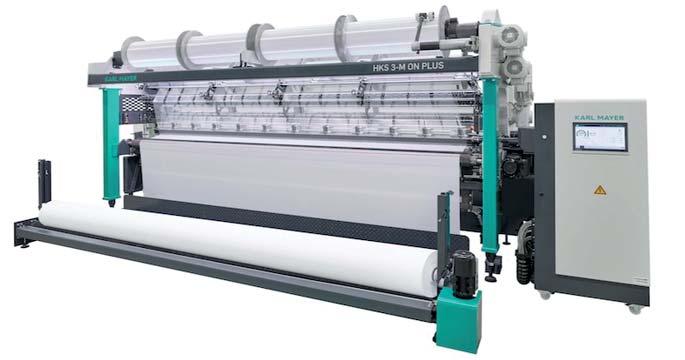
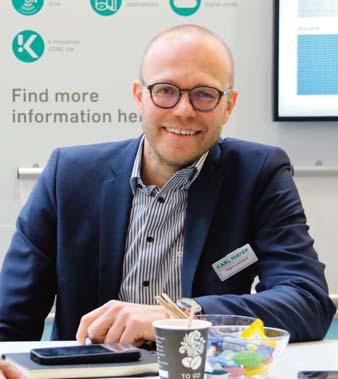
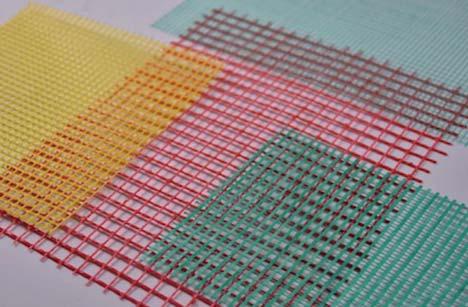
nonwoven enables the construction of steeper, safer embankments to optimize land use and reduce the disruption of a structure.
Textile products from the COP MAX 4 are also in demand in the wind power industry. The multiaxial warp knitting machine produces glass non-crimp fabrics for the reinforcement of composites, which set standards for rotor blades in terms of span widths.
KARL MAYER Technische Textilien offers a width range machine portfolio with customized machine solutions for all kinds of projects. The flexible machines guarantee a efficient production of textiles for the entire application area of civil engineering.
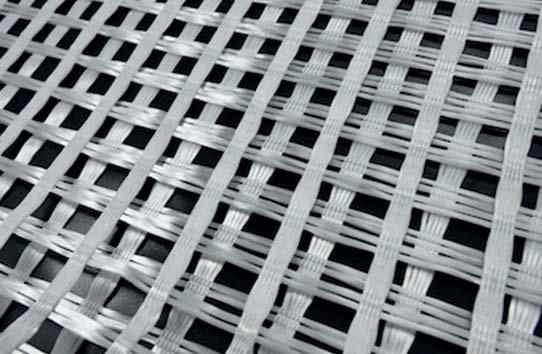


Catch Trützschler at ITM Istanbul, Turkey, from June 4th to June 8th, 2024. Swing by Booth 714A in Hall 7 to witness the latest innovations from the Trützschler Group – featuring machines and technologies in spinning, card clothing, and nonwovens.
Trützschler Spinning will showcase the latest in carding, draw frame and combing. All innovations address fundamental customer needs in fiber processing: high efficiency, more sustainable raw material utilization and intelligent automation. Additionally, our team will present the latest digital technologies designed for spinning mills. Specifically, our booth will feature a fullsize display of our TC 30i card and our integrated draw frame IDF 3. Visitors will further have the opportunity to discover the TCO 21XL, the world’s first 12-head comber.
Visitors will also have the chance to discover our new brand for textile recycling, TRUECYCLED. Through our machinery expertise and technological know-how, we empower customers to produce premium-quality sliver while turning waste into value.
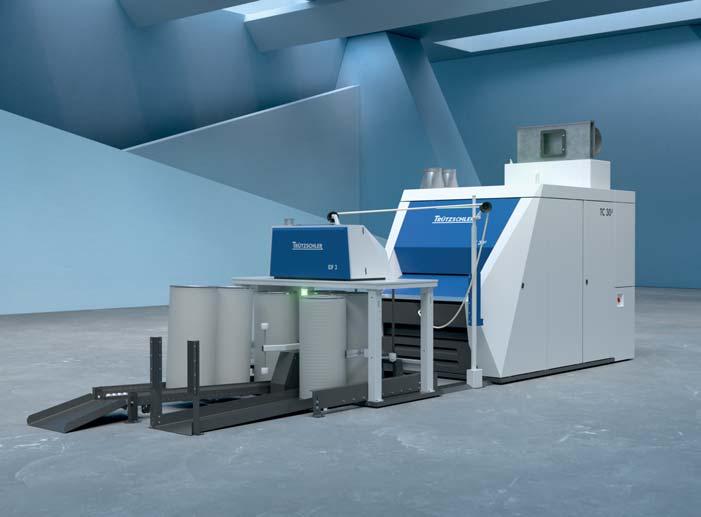
Trützschler Card Clothing (TCC) will present a wide range of technologies from its clothing portfolio, covering the full spectrum of applications in the spinning and nonwoven markets. One focus will be on SUPERTIP, which stands for enormous durability, great versatility
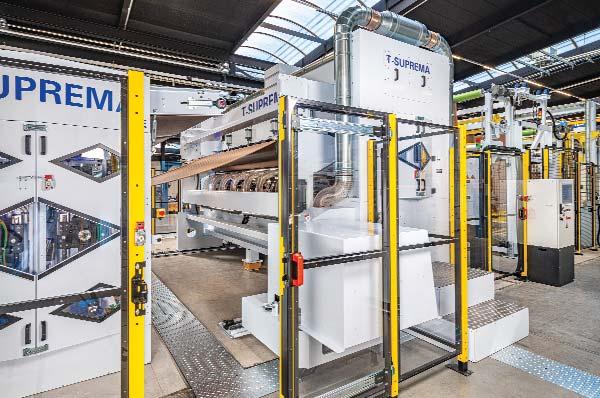
and the highest precision. This results in excellent yarn quality and significant added value through longer uptime. With a strong focus on recycling applications, TCC will also highlight its contributions to promoting sustainability within the textile industry.
Trützschler Nonwovens will put the spotlight on high-quality, sustainable nonwoven solutions, especially for flushable wipes and high-quality baby and body wipes with the pulp-based Carded/Pulp and Wet-laid/Spunlace lines. The team will also provide insights into further innovations like the needlepunching line T-SUPREMA for technical nonwovens. This concept is dedicated to achieving high product quality and system efficiency within the field of premium needle-punched nonwovens –serving as the fundamental component for applications like geotextiles, automotive textiles, filter media, and various industrial uses.
If you haven’t secured your ticket yet, it’s about time: We’re excited to connect with you in Istanbul!


Oerlikon’s Polymer Processing Solutions division and its joint venture partner BB Engineering will once again be taking part at ITM 2024, Türkiye’s most important textile machinery exhibition, on June 4-8. The machine and system manufacturer Oerlikon will be presenting visitors with complete solutions from melt to yarn, fibers and nonwovens. The experts from both companies will be providing information about their sustainable machines and system technologies at the Tekstil Servis in Stand 706 in Hall 7.
Oerlikon Sales Director Oliver Lemke said: “Our customers are showing great interest in factory projects, which include everything from in-house polycondensation systems to texturized yarn and corresponding digital solutions. From melt to yarn and beyond, indeed.” The supply of all process steps from a single source promises harmonised technology, the design of which ensures the high quality of the yarn produced.
Oerlikon to offer its sustainable concepts at ITM
Another important topic the company will focus on at ITM 2024 will be sustainability. There is a lot going on in manmade fiber yarn production in particular: mechanical and chemical technologies for recycling bottles, but also textiles, biopolymers, circular economy – all of this is no longer a thing of the future. With partners and subsidiaries such as Oerlikon Barmag Huitong Engineering (OBHE) and Barmag Brückner Engineering (BBE), Oerlikon Polymer Processing Solutions is presenting concrete concepts here.
Oerlikon to once again be focussing on the topics of energy, economics, environment and ergonomics at ITM, will
also celebrate e-save’s 20th anniversary. Oerlikon Textile Head of Marketing, Corporate Communications and Public Affairs André Wissenberg stated that profitable and sustainable growth for everyone involved is the goal of the company and therefore also their contribution to securing a sustainable future, saying: “Performance, quality, sustainability and commitment are the factors that enable our division to face the challenges of the future with confidence every day. With the constant expansion of our e-save philosophy, we are continuously creating and increasing value with high-quality and innovative solutions for the entire textile industry.”
OBHE’s homogenisation technology stands for the mechanical recycling of processed polyester (PET) waste such as post-industrial waste (popcorn), bottle flakes and film. The Oerlikon Barmag homogenizer ensures a uniform, homogeneous melt, influences the viscosity increase and thus makes it possible to produce defined rPET preproducts for further processing, such as melt, flakes or fiber material for direct spinning. The first plants have already been successfully commissioned worldwide.
Another rPET solution is the VacuFil system from BB Engineering. VacuFil is a unique and innovative PET recycling system that combines gentle large-scale filtration and targeted regulation of the intrinsic viscosity (IV) for consistently excellent rPET melt quality.
The EvoSteam process from Oerlikon Neumag is considered a pioneer for more sustainable staple fiber production in the
future. This offer impresses with savings in energy, water and raw material consumption, as well as a reduction in operating costs (OPEX) and the CO2 footprint – while at the same time achieving the excellent fiber qualities required by downstream processes and high production volumes.
bicomponent BCF yarn for the carpet market
With its latest development in bicomponent yarns for carpet production, Oerlikon Neumag is meeting the carpet market’s demand for new innovative BCF yarns in terms of quality, efficiency and performance. Sales Director Arnd Luppold said that the new BICO BCF yarn is characterised by a richer and higher volume while at the same time significantly reducing the consumption of raw materials in carpet production.
At the company’s booth, interested parties can see sample yarns and carpets, find out about the product range and have in-depth discussions with the experts from Oerlikon Neumag about the advantages of BICO BCF yarn in various applications.
Oerlikon has successfully maintained its activities in digitalisation with its Plant Operation Center (POC) for decades. Over 350 installations in large manmade fiber spinning mills around the world enable the control of complex systems with hundreds, even thousands of mostly WINGS POY or FDY winders. Besides, with atmos.io, it will be possible to process even more data in the future. This will give customers even more benefits and put them in control of the data flow in their business.

In the face of the spinning industry’s daunting labor and cost challenges, automation and digitization offer powerful solutions to raise the bar on mill performance. Rieter’s goal is to further strengthen the competitiveness of its customers and to help unlock growth opportunities through smart technology, recycling innovations and leadingedge expertise. To this end, Rieter presents a range of compelling solutions at ITM 2024 designed to automate, digitize and optimize operations, so that mill owners can successfully address the current market situation and expand their competitive advantage. Rieter’s digital spinning suite ESSENTIAL plays a key role in helping mills realize their full potential.
ROBOspin – enhancing profitability and optimizing labor management
Each week in spinning mills across the globe, ROBOspin pieces more than 1 000 000 yarn breaks, resulting in a reduction of about 2 000 working hours for operators. Automated piecing for ring and compact-spinning machines with the fully automatic piecing robot ROBOspin
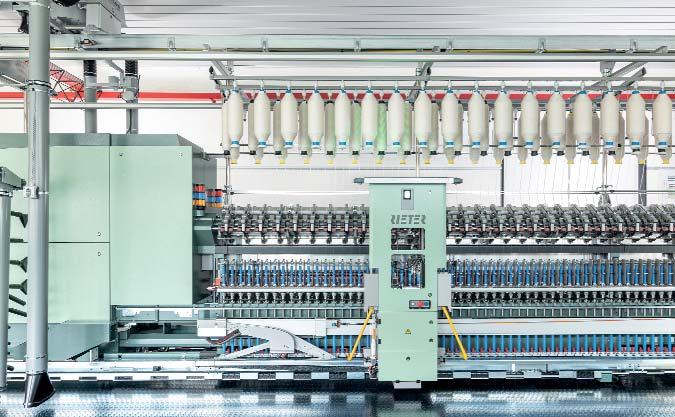
is the key for increasing profitability and streamlining labor management.
SSM DP5-T – high quality air textured filament yarns
To meet the needs of the region’s strong air textured yarn market, Rieter through its subsidiary SSM offers the DP5-T for processing partly-oriented yarns and fully-drawn yarns into unique air textured yarns. With a variety of exclusive fancy options, DP5-T unlocks limitless creative possibilities for customers in the final application.
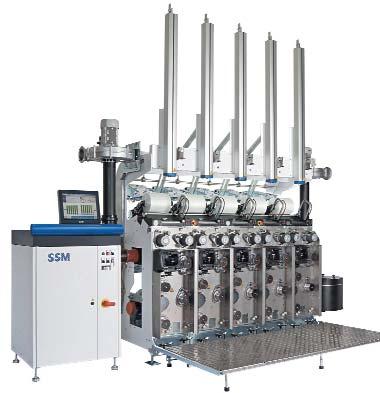
C 81 – outstanding carding results thanks to intelligent sensors
With high production rates and excellent sliver quality, the card C 81 gives spinning mills a strong position in the market. Intelligent sensors make this possible by consistently setting the carding gap to the ideal size and monitoring in real time the trash level of the card infeed and the sliver that is produced.
Newest draw frame generation – superior sliver quality and efficiency
The newest draw frame generation of single and double head draw frames RSBD 55, SB-D 55 and RSB-D 27, SB-D 27 upholds the tradition of superior sliver quality and efficiency. It features reduced operating and maintenance costs. Thanks to innovative technical solutions, recycled fibers can be processed to optimum effect.
G 38 – highest production in ring spinning on the market
The latest generation of the ring spinning machine G 38 offers highest spindle speeds of up to 28 000 rpm in combination with significantly reduced machine downtime. This breakthrough is owed to a doffing-cycle time of less than 90 seconds, 12% faster cop transport with the reshaped cop transport system SERVOdisc as well as a reduced ends down rate based on balanced yarn tension peaks.
Autoconer X6 – unrivalled splicing quality, flexibility through automation
The automatic winding machine Autoconer X6 stands for efficiency, quality and flexibility. The splicers with

the state-of-the-art open prism technology OZ1 and OZ2 ensure the highest levels of splice quality. With the Multilink and Multilot material flow configuration, automation becomes even more flexible and cost-effective.
Recycling toolbox – increasing recycled ring yarn quality
Rieter is introducing three tools that enable customers to achieve a high yarn quality from mechanically recycled cotton fibers that matches the standard of an average carded ring yarn made from 100% virgin cotton: pre-carding for full cleaning, combing to improve yarn quality, compacting to add the finishing touch.
Key technology components to make the difference
Key technology components from Accotex, Bräcker, Graf, Novibra, Suessen and Temco are what make the difference in the economic efficiency of spinning
mills. The right components guarantee maximum machine performance, productivity and minimal maintenance – and thus an excellent return on investment.
– unlocking growth for a leading
Since 1974 the sales agency Erbel A.S. and service engineers and technicians from Rieter have been working together in a common mission to strengthen the competitiveness of Turkish customers. This year Haluk Erbel and Rieter are celebrating 50 years of this unique collaboration that forms the basis of the lasting success in Türkiye.
In a move to further improve its customer support, Rieter After Sales opened its first spare parts warehouse in Istanbul, Türkiye, in April 2024. The new building

C 81 – outstanding carding quality thanks to intelligent sensors

Newest draw frame generation –
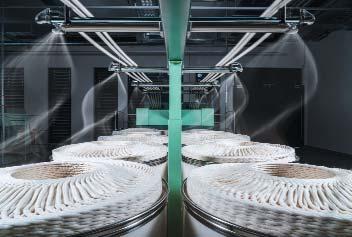
enables door-to-door deliveries for locally stocked spares within only 48 hours.
Rieter is pleased to present its latest innovations at ITM 2024 in Istanbul, hall 7, booth 702. As a major player in the region’s vibrant textile market, Rieter is committed to shaping its dynamic landscape with cutting-edge solutions.
Journalists and media representatives are invited to join Rieter’s ITM media event on June 4, 2024, at 10:00 a.m. local time, where the company’s latest technology highlights will be presented.


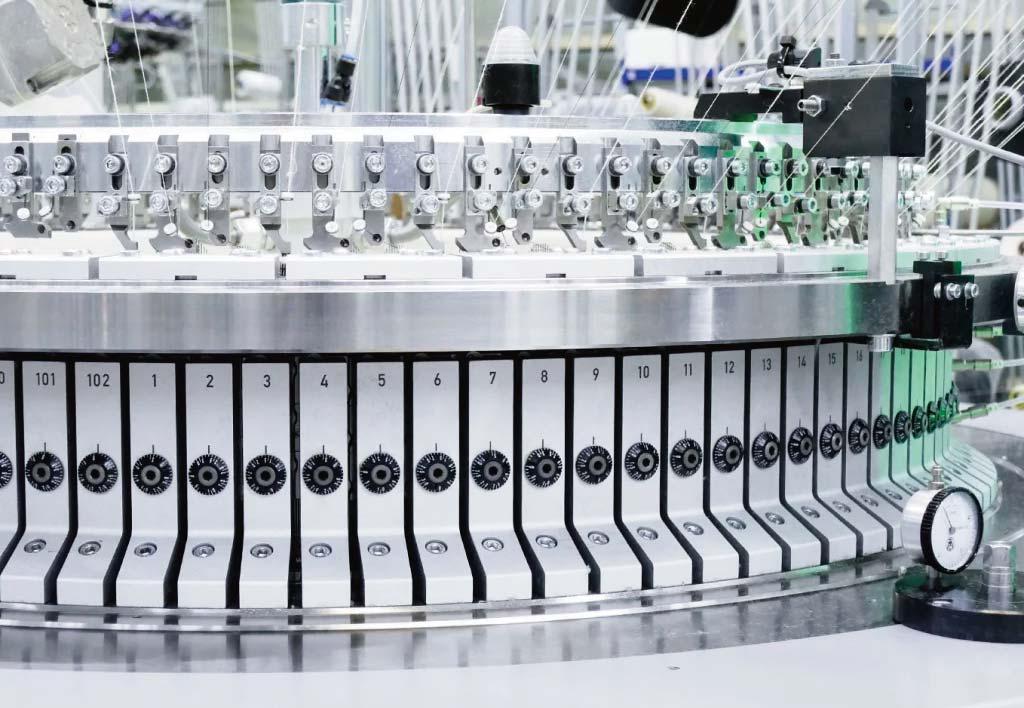

Mayer & Cie. will present its innovations for the Turkish market at booth 303 B in hall 3. These include two machine types – the SF4 3.2 III and the Relanit 3.2 HS II – and various smart solutions that make circular knitting more efficient. knithawk, a tool for the optical detection of knitting defects, ensures that yarn and energy are used in a valuable way. As efficiency also comes from durability, Mayer & Cie. strives to preserve its machines and their functions: Upgrade kits offer reju-
venation cures for existing machines and conversion sets create additional areas of application.
“We are convinced that the ITM show will drive the textile machinery sector forward by providing a platform for industry leaders to network, share ideas and showcase progress,” says Benjamin Mayer, Managing Partner of Mayer & Cie. “This can stimulate innovation, kick-start investment and ultimately drive the sector forward after a period of stagnation.”

the tried and tested even better: Relanit 3.2 HS II
The Relanit 3.2 HS is by far Mayer & Cie’s bestselling machine. Customers appreciate its
productivity, especially in connection with elastomeric plating. The mechanical single jersey model processes a wide range of yarns and qualities extremely reliably. The machine also impresses with its energy efficiency: the energy consumption of the Relanit 3.2 HS is up to 30 percent lower than that of a circular knitting machine with conventional technology.
In its updated form, the Relanit 3.2 HS II is equipped with a new thread guide, which makes threading of the elastic thread much easier. Models already on the market can be upgraded to be equipped with the new yarn guide.
Another innovation the Relanit 3.2 HS II is equipped with are improved needles and sinkers: The needle with serrated edge and predetermined breaking point, developed jointly with Groz-Beckert, prevents it from breaking uncontrollably under high load or a defective needle tongue and, in the worst case, from breaking needle butts – which in turn requires more complex intervention by

the knitter. Axel Brünner, Senior Product Manager at Mayer & Cie.: “With this improvement, we are reducing downtime for the Relanit 3.2 HS II.”
The new sinker was also developed jointly with Groz-Beckert. With that, the Relanit 3.2 HS runs more smoothly, more quietly and with less wear and tear. At higher speeds the thread tension increases less sharply too, thereby reducing the likelihood of faults in the fabric even with exacting qualities like sustainable cotton. The new sinker also makes setting the lower swing curve unnecessary, which in turn makes gauge changes simpler.
With its SF4-3.2 III, Mayer & Cie. is addressing a trend in the clothing industry that has been underlined by Turkish customers in particular: Lightweight elastic three-thread fleece fabrics in both pure cotton and cotton blends are very much in demand. “In this new machine,” Axel Brünner, senior product manager at Mayer & Cie., explains, “we combine our tried and trusted S4 3.2 II and components from our MBF 3.2 such as the stitch formation”.
One of its most impressive features is its plating performance. The exhibitors demonstrated it most impressively by means of the black ground yarn that could not be seen on the front of the fabric. That testified to the quality of the plating – with the result that single dying is sufficient.
Both machines are equipped with the new Control 5.0 machine control system. It is available in two versions. In the standard version, it comes as SmartControl, which means that a socalled Smart Knob is attached to each machine foot. From there, all the functions that the machine operator needs for his work are available. More indepth settings, such as those the knitting mill manager wants to make, are only possible from a mobile device. Any number of Mayer & Cie. machines can be operated from this machine at the same time. In the ClassicControl version,
Control 5.0 is mounted as a monitor at the familiar location on the machine. As before, this can only be controlled from this point. All machines built from 2001 onwards can be converted, and selected new machines will be equipped with the new generation of machine control systems from 2024.
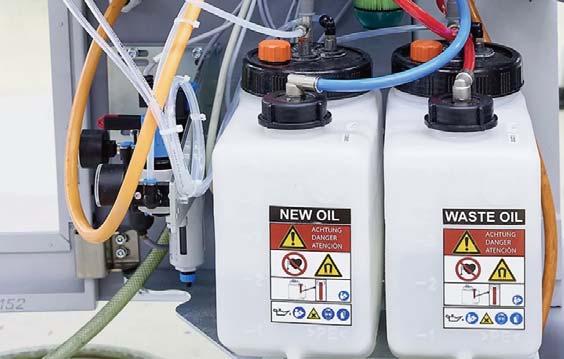
Circular knitting machines such as the Relanit 3.2 HS II are extremely productive: they rotate up to 50 times a minute and produce up to 40 kilograms of fabric per hour. If a knitting error occurs – for example due to external influences in the yarn – many metres of unusable knitted fabric may run off the machine, because a fabric inspection has often only been carried out after the knitting process or even after the finishing.
knithawk, a tool for optical defect detection, starts earlier – namely in the single jersey machine, directly at the knitting point. knithawk is compact: the camera unit, which “scans” the knitted fabric using infrared light, is quickly installed. If knithawk detects a serious or recurring error, the machine is stopped. The tool also creates an error log.
In this way, knithawk can prevent knitting errors from spreading through many meters of knitted fabric. Resources such as water, natural fibres, polyester and energy are not used in vain thanks to knithawk.
With its upgrade kits, Mayer & Cie. brings technological innovations to existing machines. These range from machine-specific upgrades, such as the Performance Kit for existing Relanit 3.2 models or the “Speed Boosting Kit” for
the OVJA 1.6 EE, to the Control 5.0 Upgrade Kit.
Also available for retrofitting and as an option for new machines is the new, machine-integrated Senso Blue RS lubrication system. The oil is applied in the optimal amount and with pinpoint accuracy to needles such as circuit boards. The oil application is speeddependent. The used oil is collected, filtered several times and then fed back into the system. The lubricator system is controlled by the machine control system.
When it comes to oil consumption –and thus sustainability – the oiler can make a real difference: The optimal oil application leads to a reduced oil consumption that is around 20 percent lower than that of a conventional oiler. In addition, the recycling rate of used oil reaches up to 40 percent.
In addition to the upgrade kits, Mayer & Cie. offers conversion kits for popular machine types. Currently, two are available for single jersey machines: The MV4 3.2 II, popular in the underwear sector, for example, can be converted into the MBF 3.2 binding thread lining machine. A second conversion kit turns an S4-3.2 II into an SF4-3.2 III – and vice versa.
“Our conversion kits also serve the goal of making existing machines even more valuable and valuable,” says Benjamin Mayer. “For a low price compared to the purchase of a new machine, the customer gets an additional machine model with all its possibilities, so to speak.”
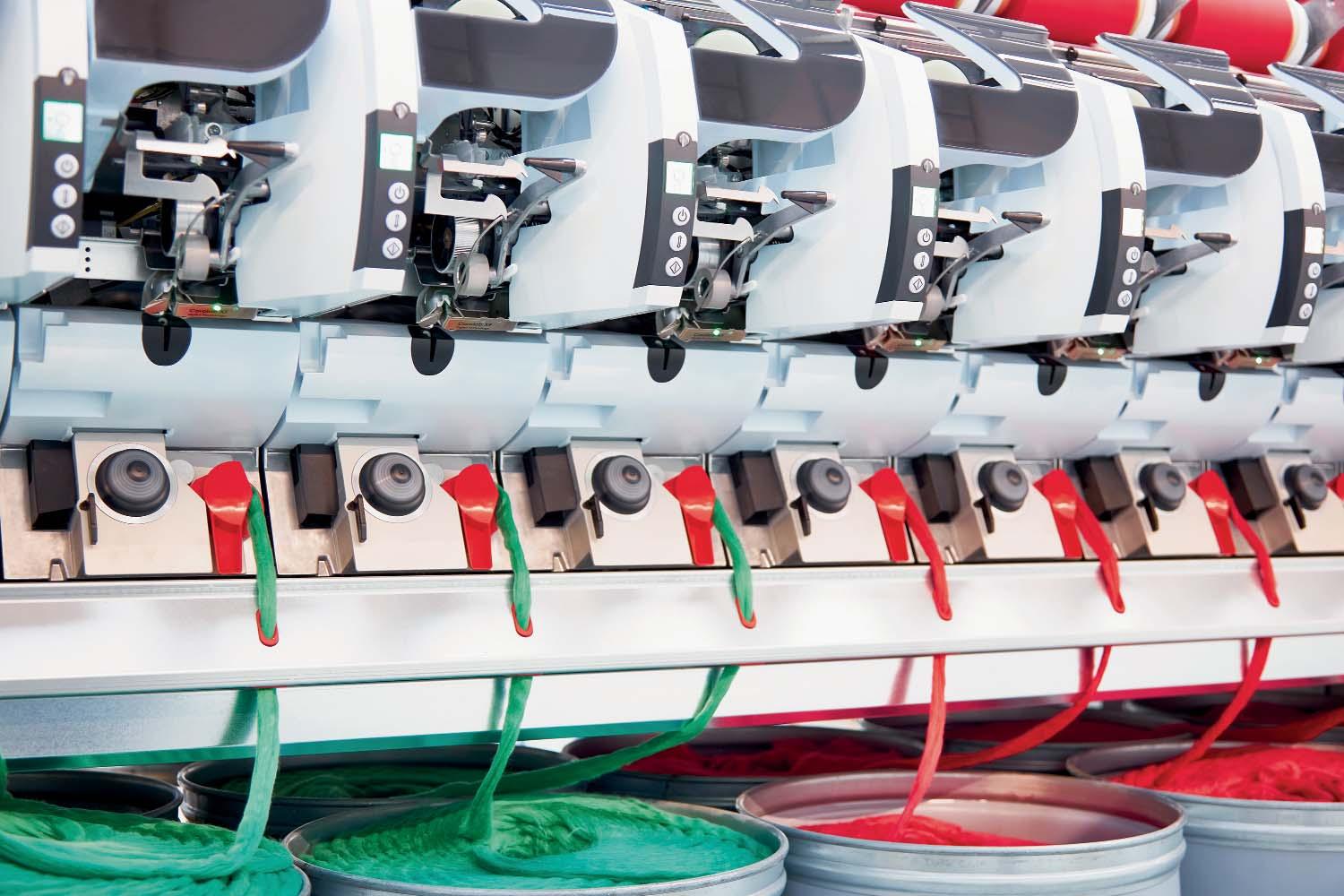

Autocoro 11 is perfectly suited for processing recycled fibres, be it comber noil, waste from spinning preparation or rotor spinning, or mechanically recycled fibres from textiles. Thanks to the new features, customers can produce more sustainably with the Autocoro 11 and at the same time save up to 50% on raw material costs.
The variety of recycled fibres and blends is huge, there is no such thing as THE one recycled blend, each one is different. Mechanically recycled fibres, for example, are up to 40% shorter than new fibres, have a high variation in fibre length distribution and contain dust-like fragments. The rules for spinning are therefore somewhat different from those for using classic new fibres. While, for example, when spinning new raw cotton, the aim is to eliminate short fibres and dust-like fibre fragments in order to achieve maximum rotor speeds, as few yarn breaks as possible plus the best yarn quality values, the aim of sustainable spinning is to lose as little raw material as possible and, ideally, to spin everything into the yarn. The Autocoro 11 with Recycling Xtreme addresses the diverse requirements and offers an intelligent
interplay of possibilities: to produce the best possible yarn from every blend, both in terms of productivity and quality.
Spin box SE 21, the all-rounder for recycled fibres
An important piece in this game is the spin box of the Autocoro 11, the spin box SE 21. It is equipped with dirt-repellent aluminium caps that prevent, for example, static charges from accumulating on the spin box surface in the area of the opening roller housing, which would have to be removed manually. New fibre beard supports, which are clipped in without tools, adjust the flow conditions in the opening roller housing so that valuable recycled raw material is incorporated into the yarn and not separated out.
Belcoro rotors for Recycling Xtreme
Another move for successful recycling processing is the

selection of rotors with a groove shape, rotor coating and diameter tailored to the raw material. There is no universal rotor for recycling, it's the blend that counts. Blends of recycled polyester with waste from the spinning mill are popular. Yarns made from these materials are often relatively coarse and are used, for example, for the napped inside of sweatshirts. With such raw materials, the

rotor grooves tend to become heavily soiled, the yarn quality can fluctuate, and the number of yarn breaks increases. Rotors with a narrow rotor groove, the Tgroove, are then a good choice. The T-groove perfectly presses the short fibres into the groove and binds them into the yarn, ensuring good yarn strength.
Further tuning of yarn strength, elongation, uniformity, and productivity can be achieved by selecting a slightly smaller rotor, as the smaller diameter further increases fibre integration. For a coarse lining yarn made from recycled fibres, the spin box SE 21 achieved strength increases of 0.4 cN/tex and an elongation increase of more than 1% thanks to a rotor that was only 4 mm smaller.
Rotors with a pure boride coating are well suited for relatively coarse yarns consisting of blends with a high proportion of soiled cotton waste from the spinning mill, for example from the roving frame. The blends contain relatively many vegetable components from the cotton, such as trash, short fibre fragments and also dust particles. The smooth boride coating is particularly robust against the abrasive properties of such fibres, and the lack of diamond coating on these rotors makes the rotors smoother, which reduces unwanted deposits in the rotor groove and makes cleaning the rotors easier. The longer fibres in such blends, which are particularly relevant for the quality of the yarn, are effectively bound in the clean rotor groove. Yarn formation is precisely controlled and not subject to fluctuations due to partial deposits in the rotor groove.

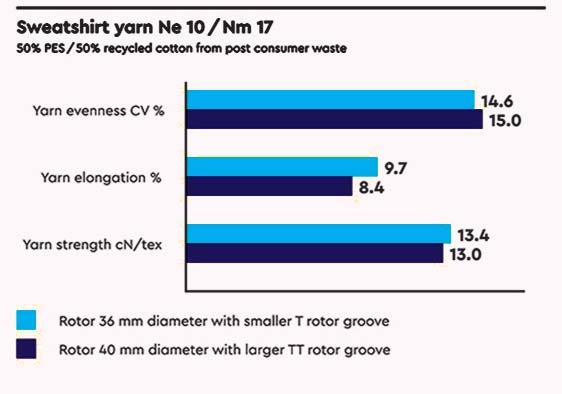
Sustainable textiles made from finer yarns, such as T-shirts, are also popular. They often consist of blends of chemically recycled polyester with high-quality raw cotton or mechanically recycled cotton from the pre-consumer sector. The proportion of fibre fragments and vegetable particles is significantly lower in these mixtures. In the case of mechanically recycled cotton, they have already been completely eliminated in the preceding spinning process. Rotors with the Saurer 3D coating, a boride diamond coating, are the ideal choice for these yarns. The diamond particles improve the stretching of the fibres in the yarn that have been shortened during the recycling process. Coupled with a significantly smaller rotor diameter of the boride diamond-coated rotors, the yarns achieve a significant increase in yarn strength, elongation, and yarn evenness as well as in productivity thanks to a higher rotor speed.
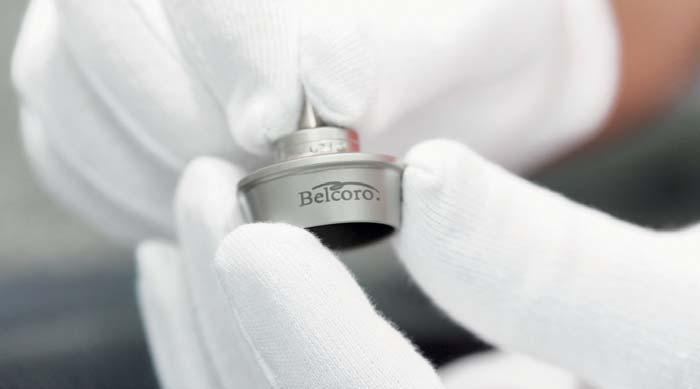
Recycled raw materials and the Autocoro already make a good team. The majority of Autocoro spinning mills process sustainable raw materials, and the trend is rising. Recycling Xtreme, together with an optimally selected Belcoro spinning agent combination, now opens up even more opportunities for companies to skillfully combine economic efficiency and sustainability aspects.
The Saurer Group, founded in 1853, is a leading, globally active technology company with a focus on machines and components for yarn production. As a company with a long tradition, we have always been an innovation leader. Today, the group is a solution provider for the textile industry consisting of two segments. Spinning Solutions offers highquality, technologically advanced and customerspecific automated solutions for staple fibre processing from bale to yarn. Saurer Technologies specialises in intelligent and economical twisting and cabling machines for tire cord, carpet, staple fibre, glass filament and industrial yarns, which allow customers to adapt flexibly to dynamic market requirements. Automation Solutions provides textile mills with an array of labour-saving systems. With around 3 300 employees, the Saurer Group, with locations in Switzerland, Germany, France, the UK, Czech Republic, Turkey, Brazil, Mexico, the USA, China, India, Uzbekistan, and Singapore, is well equipped to serve the world’s textile centres. Saurer is listed on the Shanghai Stock Exchange (WKN: 600545). www.saurer.com.

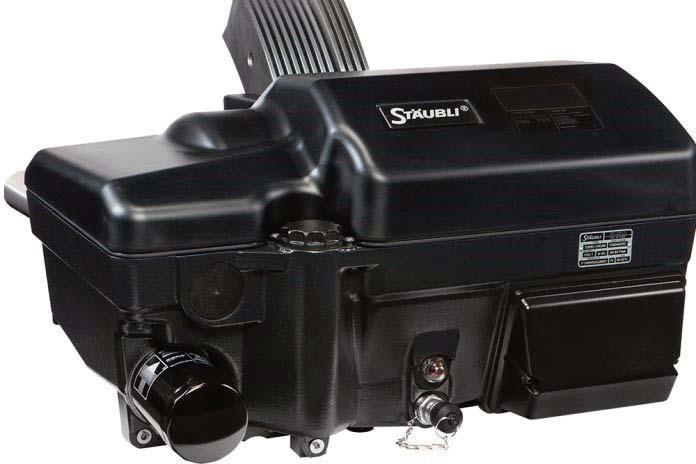
Stäubli is presenting an overview of its latest high-end technologies, machinery, and solutions that offer the textile industry more and greater benefits. Customers will discover a novelty dedicated to style changes in the weaving preparation department: SAFIR PRO S67, the new speed generation for the automatic drawing in of colored warps.
Quality and high-speed processing of warps in the weaving preparation
NEW SAFIR PRO S67 drawing in machine –speed and precision!
The renowned SAFIR automatic drawing-in machines make it possible to shorten workflows, resulting in cost savings and expanding the variety of application possibilities. Equipped with state-of the art Stäubli technology, the so-called Active Warp Control (AWC), the SAFIR drawing-in machines feature
capabilities such as colour recognition or yarn repeat management. Even warps with multiple colours and without a 1:1 lease can be drawn in, with no error or loss of productivity. The final result is a perfectly drawn-in weaving harness ready for the downstream weaving process. Visitors to ITM 2024 can witness for themselves the impressive speed and efficiency of automatic drawing in with the SAFIR PRO S67 model, dedicated to the needs of cotton fabric mills whose main applications are colored warps for shirting or other.
Stäubli is showing the speed live at the booth. TIEPRO warp-tying machine – operator friendly and efficient
Another crucial process in many weaving mills is warp tying. Stäubli is presenting the TIEPRO warp tying machine together with TPF3B-10 warp tying frame. This machine offers unique features supporting easy start up and
processing of the warp to be tied. New staff can easily learn how to run the machine as the screen guides the operator. A standalone advantage of the TIEPRO tying machine is that if a double end is detected, the machine with its exclusive auto-reverse function automatically reverses and redoes that yarn separation step. This process takes place before the yarn is cut. The machine does not require an oil bath and maintains high availability in the mill.
Being demonstrated at the booth.
Energy saving Jacquard weaving solutions
SX PRO Jacquard machine answers challenging market demands
The Stäubli SX PRO responds to market demands for higher power efficiency and lower energy consumption. It incorporates all of the proven Stäubli

Jacquard technology as well as several innovations to reduce energy consumption: low-friction design of the MX PRO module, power supply fully integrated into the machine itself, and a new ventilation system with optimized temperature monitoring. Equipped with up to 2,688 hooks, the SX PRO is perfectly adapted to the needs of the Turkish market, where terry cloth, apparel fabrics, tapestries, and upholstery fabrics are produced.
Visitors to the Stäubli booth can observe the new SX PRO Jacquard machine in combination with a Stäubli harness at a demonstration stand.
Shed formation for high speed frame weaving
The rotary dobby is a revolutionary machine invented by Stäubli many decades ago, and Stäubli has been continuously developing it further. The third generation of electronic rotary dobbies, the S3000 / S3200 electronic rotary dobby family, is an evolutionary design. It incorporates the unique Stäubli locking system, which provides enhanced security for the selection of the heald frames, allowing higher running speeds and superior reliability. This latest generation of electronic rotary dobbies offers astounding benefits to weavers.
Last year weavers could discover the brand new S3280 electronic rotary dobby concept in Milan, now visitors to ITM can discover it in Istanbul. This dobby is designed for ultra-high-speed operation, a minimum of vibration, and extremely reliable performance. Coupled with the
new e32/33 G transmission, the S3280 is a musthave solution for frame-weaving mills that demand the utmost in productivity. In addition, this dobby is representative for Stäubli’s commitment to sustainability, providing ecofriendlier solutions that make optimum use of natural resources.
Stäubli rotary dobbies in the S3000/S3200 series are composed of more than 93% metal. The remaining 7% comprises electronic components, plastics, cables, etc. This means the recyclability of these machines ranges from at least 96% to over 99%, depending on the range family.

Stäubli unique low maintenance transmissions
The transmission is a vital link in the frame-weaving installation, handling a great many loads and forces. Stäubli offers the e32/33 for low-mounted and the de82/83 for top-mounted dobbies.
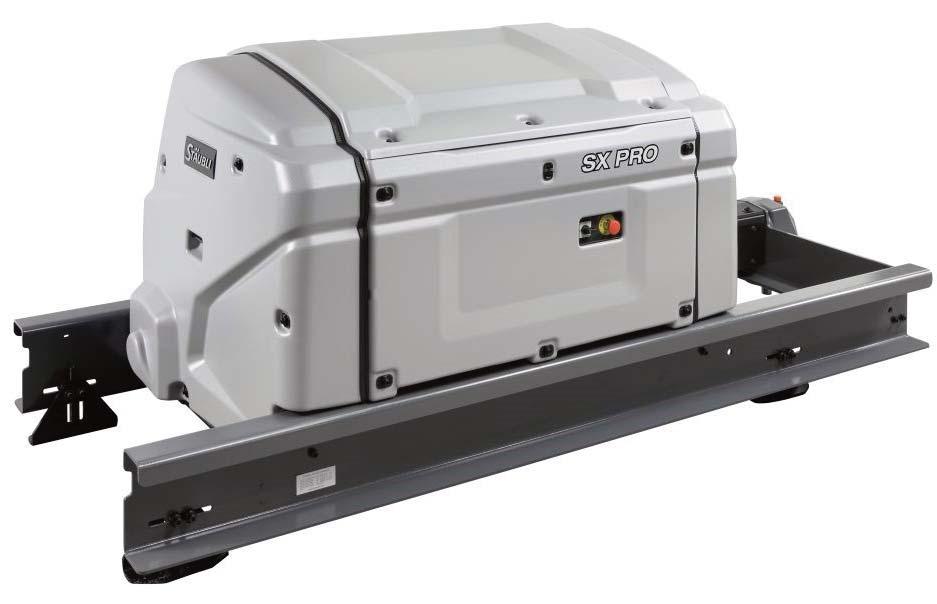
With sealed and patterned bearings, these transmissions reduce the need for maintenance and enhance the performance of the overall installation. The recycling potential of the e3*F transmission is over 99%.
On ITMA 2023 in Milan Stäubli launched the ALPHA 580 UNIVERSAL carpet weaving machine. Since, this weaving system has been integrated in several leading carpet factories where it provides increased productivity and flexibility for handling a wide range of carpet varieties. Equipped with the LX2494 Jacquard machine, featuring the NOEMI electronic architecture, it is a synonym of operational stability. Latest carpet samples woven on the ALPHA 580 UNIVERSAL can be seen at the booth.
More examples of Stäubli products, in applications with Jacquard machines, dobbies, and cam motions can be seen during ITM 2024 at various booths of Stäubli partners.

The ITM 2024 exhibition takes place at the TÜYAP Fair Convention & Congress Center in Istanbul from June 4 - 8, 2024. At this important event, the Ultimax will be presented for the very first time in Türkiye at the Picanol booth (Hall 8, Booth 802). Furthermore, there will also be an OmniPlus-i Connect airjet weaving machine on display and the novelties of the digital platform PicConnect will be highlighted. All of the innovations that will be shown are driven by Picanol’s four design principles: Smart Performance, Sustainability Inside, Driven by Data, and Intuitive Control. Together, these design principles enable Picanol’s customers to follow their weaving instincts and get the best possible results.
“With our strong presence at this exhibition, we once again want to make a clear statement on the importance of the Turkish market for Picanol and reconfirm our commitment to it. That said, we also hope to welcome customers and potential partners from other countries. Our team is looking forward to explaining to those visiting our booth about how our innovations will ensure we continue to grow together with the global textile industry and our customers in particular,” explains Mr. Kurt Lamkowski, manager worldwide sales at Picanol.
all-new,
Picanol’s all-new and revolutionary rapier weaving machine, the Ultimax, focuses on three main benefits: ultimate performance and high-quality output, readiness for the sustainability requirements of tomorrow, and the greatest ease of use thanks to a maximum level of digitalization. In addition, the classic Picanol exterior design of the machine has been radically disrupted in order to make it clear from the outside just how revolutionary the
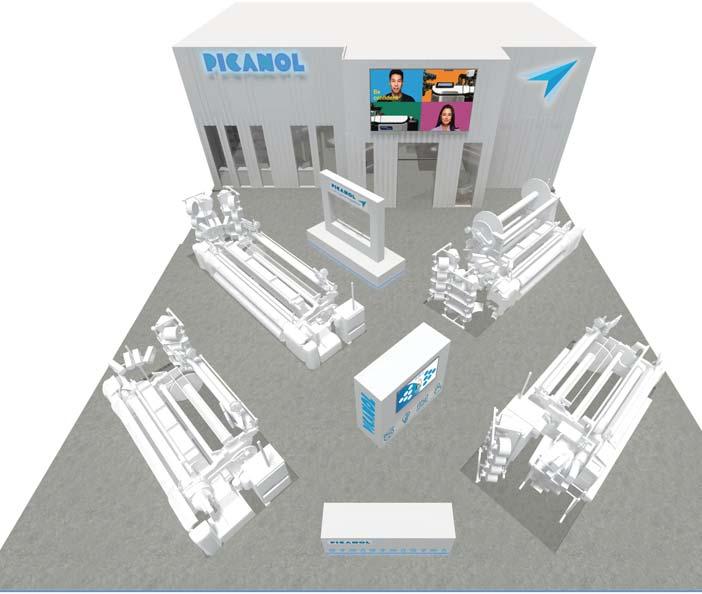

Ultimax is on the inside. The Ultimax excels in the fields of performance and quality, it has been designed with sustainability as the baseline, and the high degree of digitalization results in a previously unseen ease of use. At ITM 2024, three Ultimax machines will be on display with different shedding motions, different machine widths, and a variety of features. One machine will be weaving denim fabric, another one will be weaving voile, and there will also be an Ultimax Terry.
At ITM 2024, Picanol will be presenting an OmniPlus-i Connect airjet weaving machine with SmartShed, weaving double-face. Visitors can also experience the speed increase that Picanol recently launched on its airjet platform.
With PicConnect, Picanol is centralizing its digital tools and services in one new fully digital platform. At a corner in the exhibition that will be dedicated to PicConnect, visitors will be able to discover all the benefits and latest features of PicConnect to leverage the full extent of the possibilities offered by Picanol weaving machines. Integrated machine manuals and tutorial videos, a central weaving styles management system, and enhanced machine stop insights are just a few of the new PicConnect features that Picanol recently released.

The ITM 2024, an important international trade fair for the textiles industry, will take place in Istanbul. The Erhardt+Leimer Group, specialized in automation and inspection technology, will exhibit an AI-based seam sensor for the detection of cross-seams, as well as a warp thread sensor.
The latest linear and rotary drive units for almost every application in machine automation and the Erhardt+Leimer edge cutters will also be on show. E+L shares stand 1208B in hall 10 with its partner ITEKS.
Sensor acquires cross-seams as reliably as the human eye
The seam sensor marketed as the ELSEAMTEX SI 1001 detects, optically and therefore without contact, any type of seam on printed or single-color webs. Its software utilizes artificial intelligence and in this way makes it possible to detect cross-seams at the level of human perception. Along with a light transmitter and a matrix camera with lens, the sensor also includes a WLAN card for reliable communication with a smartphone, tablet or any other mobile terminal device.
In addition, a dedicated app is available that can be used, for instance, to test special seams offline; the software can also be updated via the mobile terminal device. If a cross-seam is detected, a digital output in the sensor is switched so that, depending on the machine, for example the calender rollers can be opened or the seam can be left to run through the digital printing press without printing.
Artificial intelligence ensures the greatest possible reliability
The sensor's ability to learn based on artificial intelligence permits a previously unknown level of precision during the detection of the textile surface. This precision qualifies the sensor for the provision of exact, reliable position data not only for the various seams, but also for the different sections. The user is then able not only to protect calendar rollers, shearing blades or print heads against damage, but also to automate handling
steps. This automation improves the quality of the end product, reduces costs and increases transparency.
And all these advantages can be integrated into production at reasonable expense without major modifications: the sensor is fastened at a precisely specified distance from the web and can be commissioned without calibration. Operation is even easier than installation: recipes are not required, it is not necessary to change any parameters during a material change, no interaction whatsoever is required between the machine operator and the sensor. As a result, possible errors are reduced to zero.
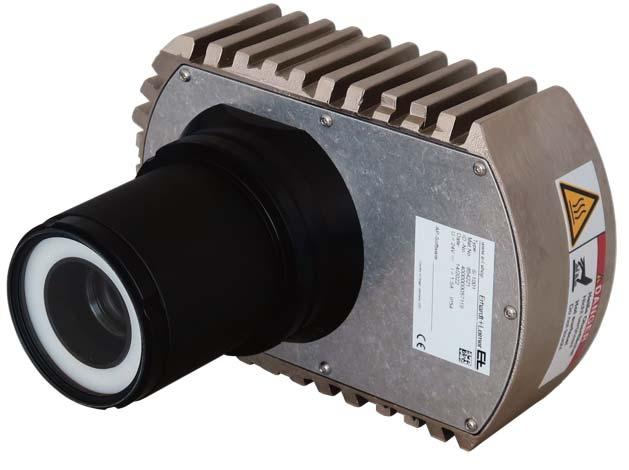
With the designation ELWARP SI 2001, E+L will also present a sensor for the optical detection of the outermost warp thread in a web, regardless of the length of protruding weft threads. Artificial intelligence is also used here. For clear, unambiguous detection of the outermost warp thread in the downstream cutting process, it is necessary to bring the protruding weft threads into the same plane. A mechanical or pneumatic spreader can be used for this task. An integrated WLAN card provides secure communication with mobile terminal devices such as smartphones or tablets; it is also possible to update the software via the mobile terminal device. Along with blade follow-up for cutting the protruding weft threads at the tenter exit, this sensor can also be used to implement web guiding by the outermost warp thread.
With the EL.MOTION drives, Erhardt+Leimer will also present linear
and rotary direct drives that, thanks to their play-free design, are suitable for a wide variety of applications and feature high standstill torque and high acceleration combined with a compact shape. The avoidance of any mechanical force transmission components enables users to make significant time and cost savings during machine maintenance and ensures straightforward integration into the machine layout. The drives consist of a housing made of extruded aluminum and a rotor with an iron core that provides a high power density.
The integrated high-resolution multiturn encoder permits the acquisition of the rotor position and absolute position. Due to the resulting complete elimination of the play typical in conventional systems and the mechanical elasticity of the drive, EL.MOTION motors are ideally suited to applications requiring very smooth running and precise positioning accuracy. Communication is possible via all common types of fieldbus. Optionally, the drives are also available with functional safety (STO).
"Stand-alone" usage of all variants in the product range is also possible; in addition, versions with a gearbox are available as an option. The motors can be commissioned using any browser via the web-based management. They also come with EL.NET technology, which allows control tasks to be implemented without any need whatsoever for an external controller.

Color Service can proudly look back on 37 years of history to ascertain how the company‘s face has transformed into a reality globally recognized as the leader in automatic dosing systems for powder and liquid products.
As a consequence, Color Service gained the trust of more than 3.000 clients and provided them with many solutions solving the problems associated with the manual weighing of products.
Through its global presence, the company helps customers over the entire life cycle of the systems, including assistance with the selection of the appropriate equipment, design-in support, installation, and after-sale servicing. In 1987 Color Service was the first company to introduce in the market the first automatic dosing systems for dyestuffs, changing the approach of textile market towards automation. Thanks to high-speed irrigation screws and a unique scraper, our weighing machine mod. TRS automatically weighs every sort of dyestuff in powder or granule form, achieving a remarkable accuracy within small weighing. This device is integrated with a variety of automatic dissolving systems, which, based on the dissolution parameters and the quantity to feed dyeing machines, dissolve the dosed formula and deliver it to the customer's destinations.
Additionally, Color Service manufactures
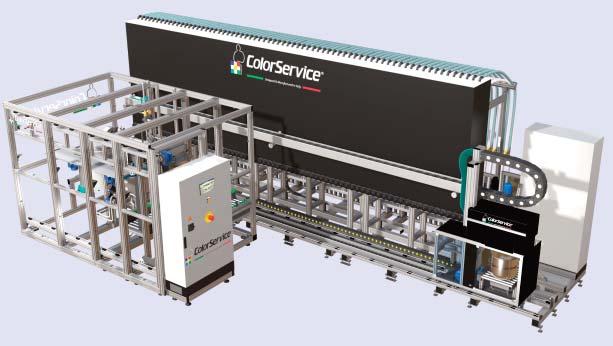
dosing/dissolving units for powder chemicals (Salt, Soda, Sodium), preparing the solution without changing the proper liquor ratio, as well as gravimetric / volumetric automatic dosing systems for liquid chemicals and auxiliaries. These systems combine the speed of volumetric measurement with the accuracy of gravimetric dosing.
In the textile sector, laboratory dyeing is fundamental to simulating the real dyeing production process. A wide range of laboratory equipment is designed and provided by Color Service such as automatic dyeing batches and solutions makers, volumetric solutions dosing systems with pipetting, automatic dye and chemical dispensers for small machines.

All Color Service dispensing systems are able of achieving higher dosing precision, reproducibility of recipes, and high production speed that allows the production process to be repeatable 24/7 and reliable, allowing "zero defects" production. As a result, human intervention is
minimized, and risk factors are essentially eliminated. All system processes are tracked and automatically monitored, and data is captured in software designed to be user-friendly and intuitive.
The majority of our innovations have been oriented toward environmental sustainability and industry 4.0 regulations. The boost in productivity and product quality, as well as the significant improvement in employee working conditions along with a massive energy saving, represents the highest benefits of our automation. The fully closed and aspirated system guarantees total control of the dust released during weighing and product suction that is retrieved and reintroduced into the production cycle, with obvious ecological and economic benefits. Indeed, one of our technology's highest priorities is to substantially minimize environmental and ecological hazards by limiting energy/water consumption, reducing pollution, and reducing material waste in order to create a sustainable finished product for customers.
With these trump cards in hand, the company had a significant increase in order intake in 2023, a successful goal rewarding the made-in-Italy technology.


Andreas Conzelmann has been CEO of the Jakob Müller Group (JMG) since the beginning of the year and is focusing on innovation and customer orientation. Under his leadership, key positions have been strengthened and the opening of an "Innovation Lab" in Frick is being planned. JMG is part of Jakob Müller Holding AG (JMH). The group of companies is focusing on digital investments and global expertise to secure its leading position in the industry.
Andreas Conzelmann became CEO of the Jakob Müller Group (JMG) on January 1. He quickly recognized the challenges and opportunities for JMG in a demanding global economic situation. JMG plays a leading role in the global textile machinery industry and is well established in the market - despite high competitive pressure, strong competition and its Swiss production site. The requirements have changed significantly over the past 10 years and the economic conditions are currently very challenging. "We are facing up to these challenges and investing. There are positive signals from the market that keeps us optimistic," explains Conzelmann.
Focus on customer orientation, innovation and a strong corporate culture
In recent months, the Executive Board and other key positions have been expanded in order to strengthen the management team. "Our focus is on leveraging the expertise within the Group worldwide and focusing on innovations that support our customers," explains Conzelmann. "The customer is at the center of everything we do and we will focus even more on this in the future." As an example, he mentions the planned "Innovation Lab" in Frick, which will open this year. In "LAB1887", new solutions will be developed and technologies combined on Müller machines together with customers.
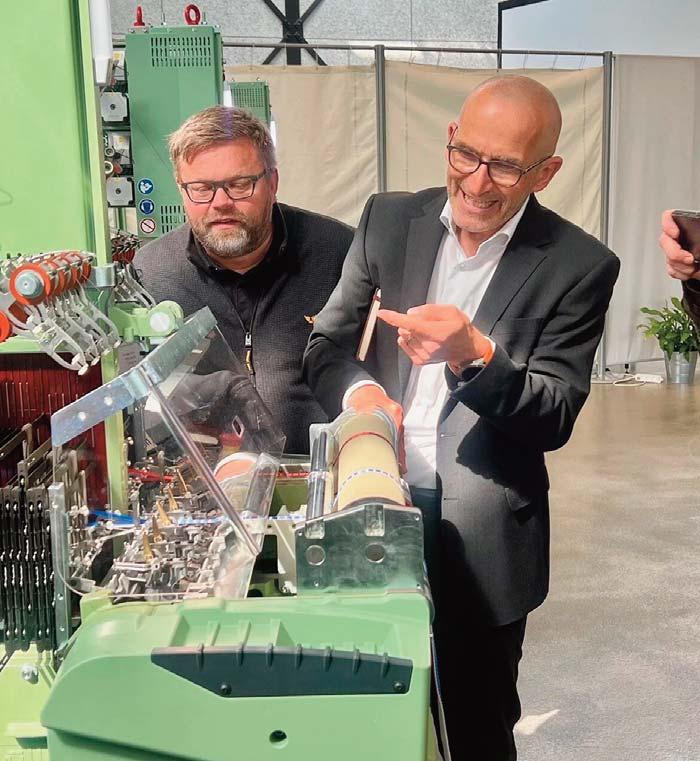
"Customers will have the opportunity to test their initial ideas and solutions in a realistic environment here in Frick," says Conzelmann. In addition to "LAB1887", innovation projects have been launched in which new technologies and applications for the machines are developed together with universities, partners and customers.
The Jakob Müller Group is part of Jakob Müller Holding, which also includes Benninger AG and List Technology AG. According to the owner Stephan Bühler, the time is currently being used intensively for a "rethinking" of the
strategy, which will take JMG a big step forward in terms of competitiveness. Bühler sees this as an important part of an investment in the future: "We are continuing to expand our core business in industry and support our companies so that they grow healthily and profitably. And we are investing heavily in digital solutions." The planned "LAB1887" innovation lab in Frick is also an example of the Jakob Müller Group's commitment to positioning itself at the leading edge of the textile machinery industry and to developing it further, says Bühler.
Jakob Müller Group will be present at ITM from 4 to 8 June 2024 in Istanbul, Hall 8 Stand 804A.
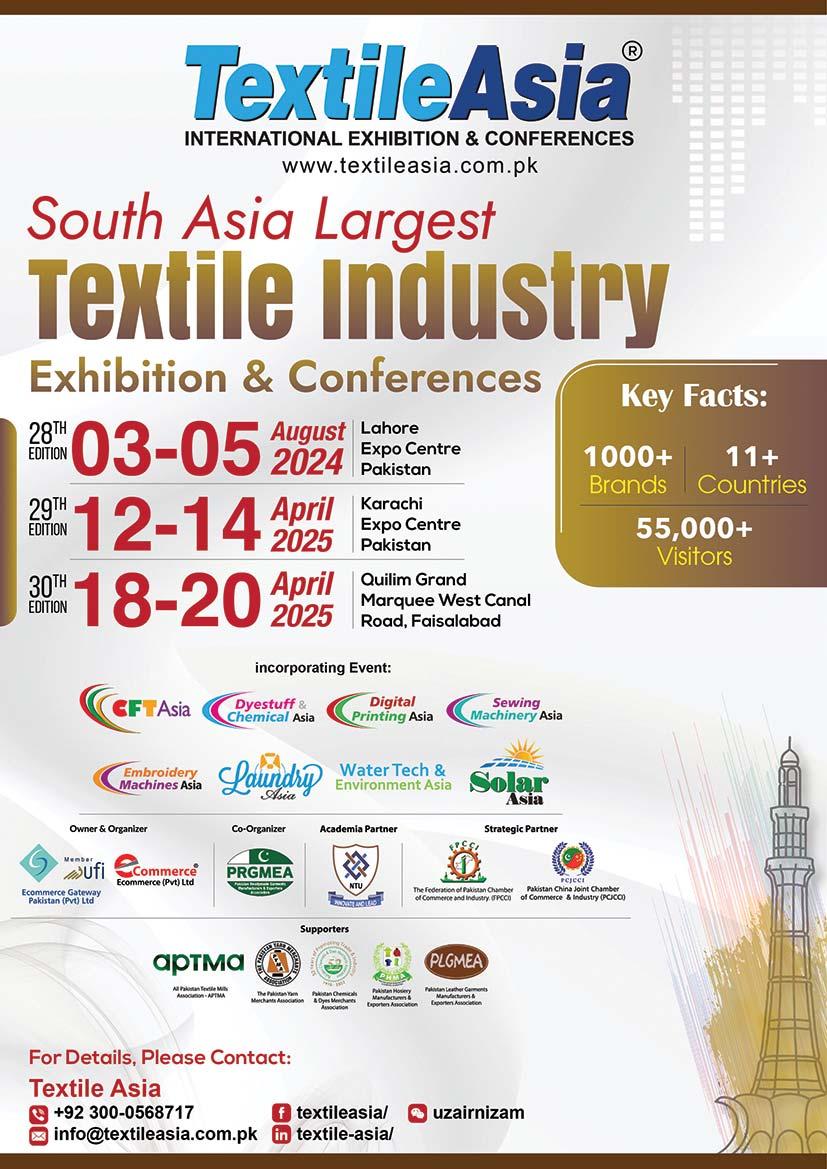

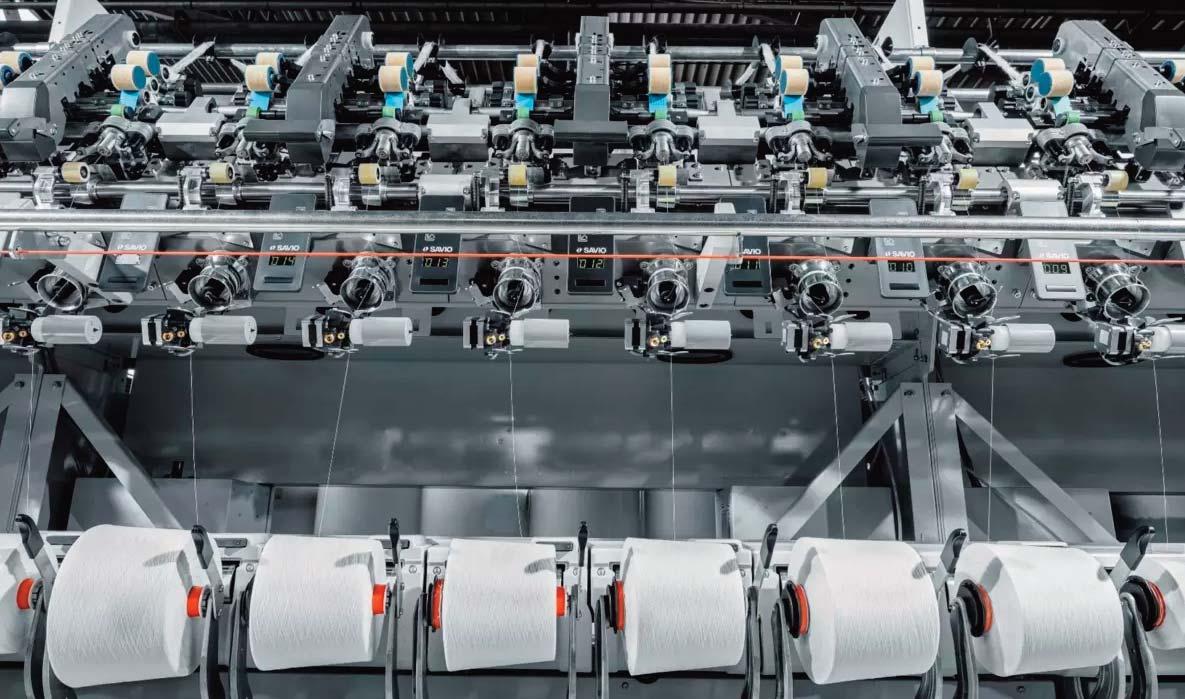
The new winding machine Proxima Smartconer® is setting the benchmark in Savio automatic winding. We have combined the name Proxima with Smartconer®: it stands for a high-tech winding machine, capable of perfectly adapting to demands of Connectivity, Industry 4.0 and Industrial Internet of Things.
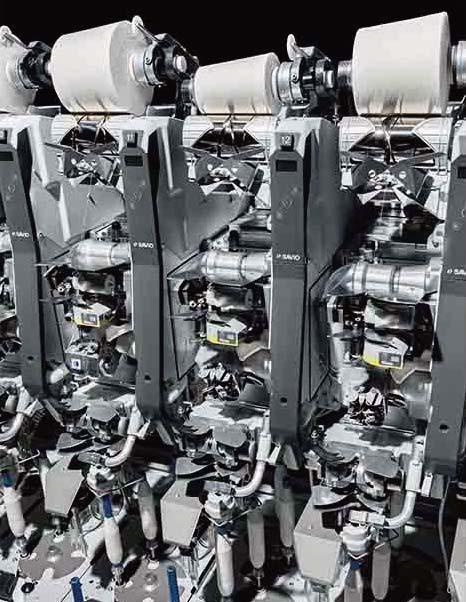
Thanks to the innovations, spinners will get a machine featuring high-tech capabilities, thanks to a design with a strong focus on the main benefits for customer’s competitive advantage: high productivity, low energy consumption, premium yarn quality, automation, and data connectivity.
Proxima Smartconer® has been designed with the foremost attention to the customer’s needs in the optimal utilization of a winding machine. Investing in equipment that enables to work faster and reduces manual and repetitive tasks, can increase both efficiencies and overall productivity. The same applies to a new equipment that does more of what is needed, faster, safer, with better quality but with less waste, less maintenance, and less resource usage.
Savio’s new air-jet spinning machine: LYBRA Smartspinner®
With Lybra Smartspinner®, we spin different with a versatile and smart machine. Savio’s air-jet spinning machine
has been developed with an original spinning technology to serve our customers in specific applications of textile production: knitting, home textiles, sunshades. Air-jet spun yarn has a soft and smooth character, perfectly adapting to creating functional & fashionable fabrics.
With LYBRA Smartspinner®, we want to offer our customer a versatile, flexible, cost saving and easy-to-use machine. Airjet spinning offers to yarn manufacturers the opportunity to produce yarn at high production rates and low processing costs. The air-jet spinning technology use the same preparation of the conventional ring spinning. This processing works directly with slivers instead of roving, integrating three textile processes: roving, spinning & winding.
Space needs for air-jet spinning is 2530% less than for ring-spinning equipment producing the same capacity, thereby reducing building costs. Also, a smaller area requires less climate control and reduced operating personnel. This results in further substantial savings, maximizing the return on investment.

Mesdan is the brand of the Vandewiele group of companies offering yarn joining solutions and textile testing equipment. At ITM 2024 the latest automatic splicer will be installed on the exhibited Savio Proxima winder, while two laboratory equipment will be on display.
Nati Advanced is one of the MesdanLab most known equipment; it is the instrument to determinate neps in raw cotton, neps and trash in cotton sliver and roving, neps in synthetic and blended sliver, hence the ideal tool to improve quality and efficiency of carding and combing operations.
It has been manufactured by Mesdan for the last 25 years; hundreds of units have been sold worldwide, and the Advanced is the 4th and latest version, particularly designed to work in connection with the CONTEST-F2, the Mesdan-Lab high volume cotton testing equipment, to obtain the complete fibre classification in a unique report.
Anyhow, NATI Advanced can also work as a “stand alone” unit, and in this format, it can be used for testing both cotton and synthetics, just by changing the opening roller. When testing synthetics, it produces a classification of the neps and trash content per size, and, in case of a multiple sample testing, a statistical analysis. When testing cotton, it can test both raw fibres and slivers; in case of raw fibres the classification is for neps (2 sizes), trash, dust and Seed Coat Neps; in case of slivers the classification is for neps (3 sizes), dust and Seed Coat Neps.
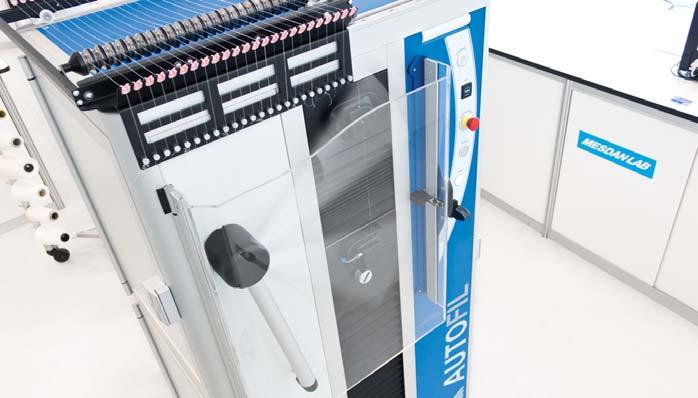
NATI is fast in testing large samples, reliable and repeatable, very easy to operate, compact and easily transportable to the production floor, for continuous testing and assessment at different process stages.
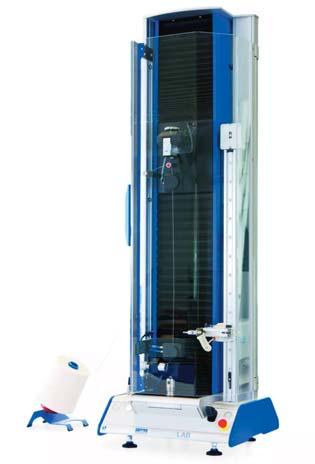
The AutoDyn 3 on display at ITM is the 3rd generation of the well-known AutoDyn series, the automatic yarn strength tester, that high success reached during the last 15 years. It embodies: latest technology, best electronics, new software & new accessories, stunning performances (capacity, versatility, accuracy and testing efficiency) and Italian design. AutoDyn 3 represents the most complete and universal testing equipment, being suitable for single fibres, fibre bundles, single yarns (automatic testing), technical yarns, hanks+LEA, fabrics, garment accessories, up to the maximum force of 3kN. It is the ideal dynamometer for the smaller spinning mills, for the integrated mills, the knitters and weavers who want to check the incoming yarns at a large scale, besides the quality of their internal fabric production. Thanks to its versatility it is also recommended for schools and universities, R&D and testing laboratories.
Archroma Pakistan Ltd ...................................................BC
Brueckner...................................................................17
Color
CCI USA......................................................................1
Chhipasons.................................................................80
Datacolor...................................................................21
DPS World 2024.........................................................41
Erbatech GmbH..........................................................FC
Groz-Beckert................................................................9
ITEMA SpA.................................................................19
ITMA ASIA + CITME, Singapore 2025.......................IBC
ITMA ASIA + CITME, Shanghai. 2024..........................6
ITM 2024..................................................................IFC
IGATEX Pakistan 2025................................................61 iTextiles.......................................................................39 Jet




